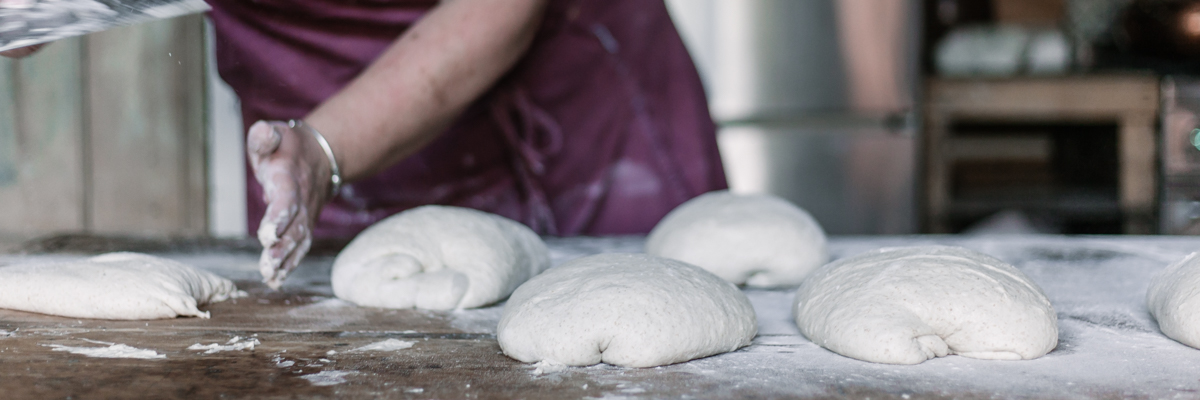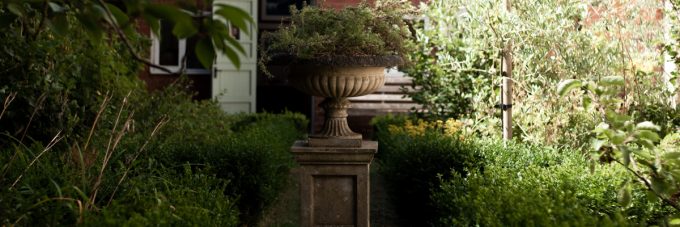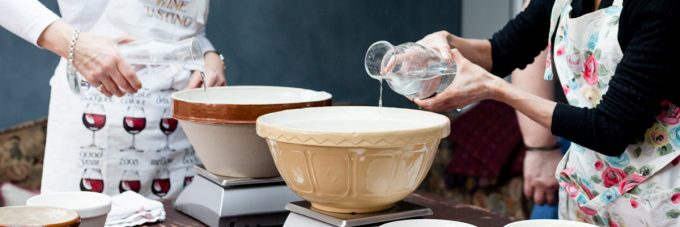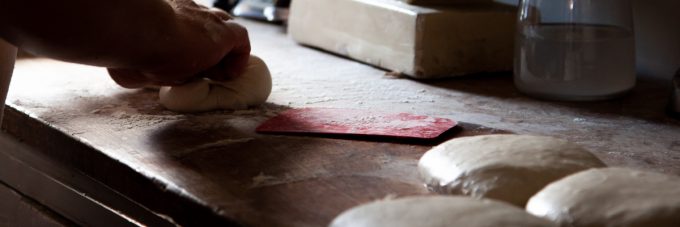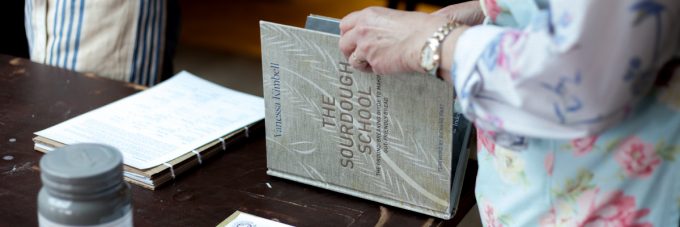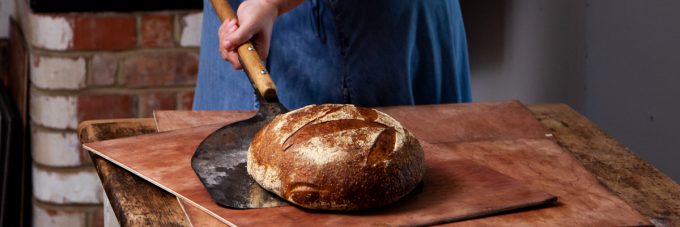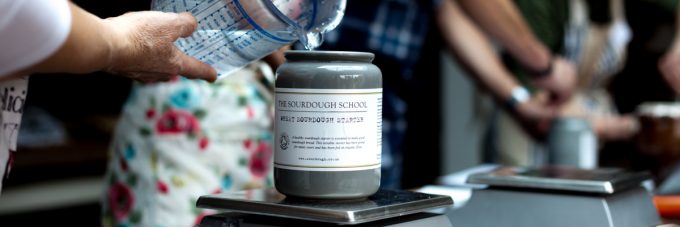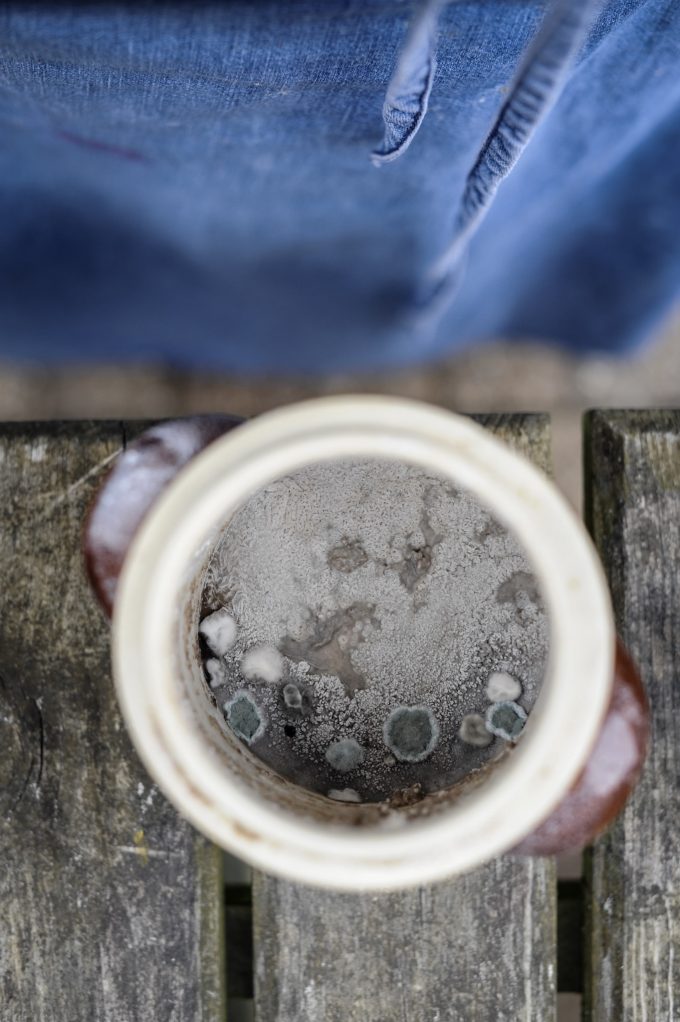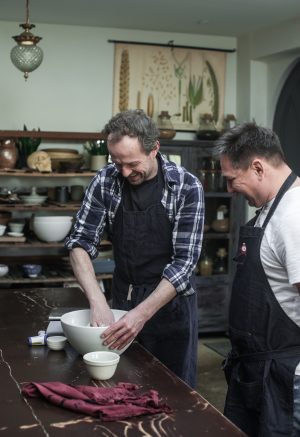What will I learn on a workshop?
 Workshops are development days - bridge the gap between theory and practice.
Workshops are development days - bridge the gap between theory and practice.
This is about the BALM Experience: A Sensory Connection Workshop
Welcome to a unique exploration at BALM Training Academy. Having delved into the principles of Baking As Lifestyle Medicine (BALM) through a year of online learning, the workshops are an opportunity to connect on a deeper, more sensory level. Our connection workshop days are designed to bring you closer to the heart of BALM.
A Sensory Journey into BALM: This is not just a continuation of your online studies; this is an invitation to see, touch, taste, smell, and eat BALM. Engage with the workshop style that involves baking, creating, developing, discussing, photographing, and applying principles to recipes that are usually published. Get up close to how we produce course material, participate in the process, and become integral to the BALM experience.
Here's What Awaits You:
- Understanding Your Ingredients: I love that you get to feel the texture of the flour, inhale the smells of the dough as it ferments and the bread as it bakes, and create blends that awaken your senses.
- Mastering Sourdough: Handle wholegrain starters, control flavours, and savour the lunches and the baked sourdough.
- The Art and Science of Bread: This is about observing variables affecting fermentation, experimenting with hydration, and appreciating nuances in creating something from scratch and of craftsmanship in shaping and scoring.
- Holistic Health Approach: Explore the connection between bread and gut health through flavours, textures, and the beneficial effects on the body.
By immersing yourself in the workshop, you'll bridge the gap between theory and practice, between learning and living BALM. You'll leave not only with new skills and knowledge but with a profound connection to the art and science of baking as lifestyle medicine.
What is included in a Workshop?
Included in the Sourdough School Workshop and Online Certificate:
- Scheduled Activities: All activities in the teaching timetable, including swimming, yoga, sound baths, and guest tutor sessions.
- Meals and Refreshments: This includes tastings, lunch, unlimited tea, coffee, and breads to take home.
- Course Materials: Ingredients needed for the course, a portion of Sourdough School starter to take home, pre-course materials, worksheets, and access to relevant recipes.
- Additional Takeaways: Items created during the course, like pickles, soups, and sometimes butter, subject to availability.
- Certificates: Awarded upon appropriate completion of the course.
- On-Site Meals and Snacks: Food and snacks provided throughout the day.
- Scheduled Excursions: Travel to destinations such as flour mills or farm shops on retreats.
Students are Responsible for:
- Travel and Accommodation: Responsibility of the students.
- Travel Insurance: Essential for covering short notice cancellation of course fees.
- Evening Meals: Not included unless scheduled as part of the course.
- Travel Coordination Among Students: The school does not facilitate this due to health and safety reasons.
- External Expenses: Any expenses outside the school, such as travel and accommodation, are the student’s responsibility.
Do you recommend anywhere to stay?
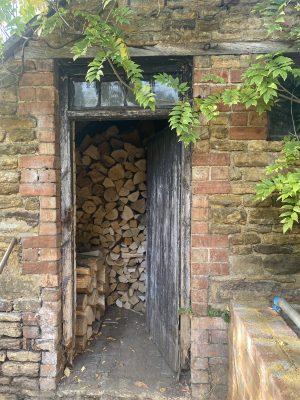
Accommodation list
We have a comprehensive list of accommodation in the area, including budget accommodation in the next village, in the college dormitories. The list is split into suggested accommodations for driving and non-driving plus camping options.
If you are driving then you may find some really lovely cottages locally on Airbnb in this list.
What else is there to do in the area?
We have compiled a list of things to do and places to visit if you are bringing someone with you or staying for longer.
Have I killed my Sourdough Starter?
What do I need to bring with me to a workshop?
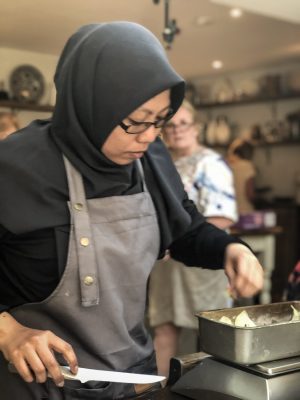
A handy checklist of things you need to bring with you.
The most important thing that you need to bring with you is an open mind and compassion. We are not a traditional cookery school. Vanessa will ask that you dig deep into what bread means to you, and why this matters. After that, each course has its own life.
Suggestions
WHAT TO BRING WITH YOU TO A WORKSHOP OR RETREAT
The most important things to bring are an open mind and compassion. The Sourdough School is not a traditional cookery school. Vanessa will invite you to reflect on what bread means to you — and why that matters. Everything else is practical.
Each course has its own rhythm, but here’s a general guide to help you prepare.
ONE-DAY WORKSHOP
These are shorter, focused days — usually introductory or themed sessions.
Please bring:
- One apron (neutral colours if possible — please avoid bright colours or red)
- A lidded container or jar to take your starter home
- A pot or bowl for your starter
- Any of Vanessa’s books you’d like signed
Everything else is provided, and you’ll go home with your bakes, inspiration, and a pot of starter to continue at home.
THREE-DAY WORKSHOP
These are immersive and hands-on, with multiple bakes and fermentations.
Please bring:
- Two aprons (ideally in muted, neutral colours — we avoid bright colours or red to support sensory balance)
- Indoor shoes
- Three clean, odourless containers with lids (for jam, cultured butter, pickles, etc.)
- A small clean bottle (an empty water bottle is perfect for taking syrups home)
- Any of Vanessa’s books you’d like signed
We will give you a bag on the final day to take your bakes and materials home. International students, do allow luggage space to carry items back with you.
RETREAT (IMMERSIVE WEEK)
These are deeper, holistic experiences combining baking with walks, cycles, and self-reflection.
Please bring:
- Everything listed above under the Three-Day Workshop PLUS
- Swimming costume
- Flask for hot tea
- Outdoor walking shoes or trainers
- Weather-appropriate clothing (it can be chilly or muddy depending on the season)
- A torch – essential in winter months as the village gets very dark and there are no floodlights
- A lunch box or container – often there are extras of soup, salad, or bread you may want to take home for supper
- Bright jacket if you’re cycling – roads are rural and unlit
If you are sharing a lift, please coordinate with others via WhatsApp. The School cannot accept responsibility for transport arrangements.
Final reminders
Please do not arrive early unless you’ve pre-arranged to meet Vanessa for a walk.
Make sure you book a taxi home in advance — the day ends at 6.20pm.
And of course, if you're travelling from abroad, don’t forget your passport.
We have spares of most things.
What are the Workshop start time & end times?
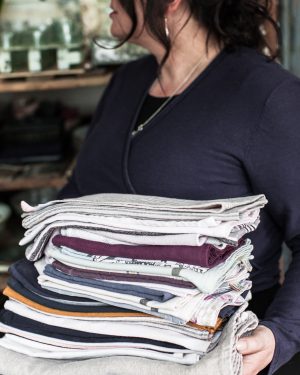 Teaching Times Vary Depending on the Course you are on
Teaching Times Vary Depending on the Course you are on
4-Day Workshop Schedule:
- Our 4-day workshops commence on Wednesdays at 10 am.
- On Thursday and Friday, the workshops run from 10 am to 6 pm.
- On Saturday, the session is from 1 pm to 5 pm.
On Saturday morning we suggest that students use the opportunity to indulge in personal activities such as wild swimming, cycling, shopping, walking, or visiting the local vineyard. Each day includes 3 hours dedicated to baking, ensuring a balance of learning and leisure.
2-Day Workshop Schedule:
The 2-day workshop begins on Thursday at 10 am and concludes at 6 pm, following the same schedule the next day, Friday. Please note that occasionally teaching times may vary depending on the specific course you are enrolled in.
Arrival Instructions:
We kindly ask that you arrive precisely at the designated start time for your course. We do not start any courses on Mondays. Please allow yourself a 15-minute window to get your things ready and finish cleaning down your station.
Early Arrivals: We encourage you not to arrive early. The times stated are integral to the rhythm of The School, as preparation and cleaning often occur before the sessions. If you do find yourself arriving early, we suggest taking a stroll around our picturesque village. For those driving, The Workhouse café in Brixworth is a lovely spot just 5 minutes away. The Workhouse in Brixworth.
Planning Your Morning Arrival: If you're coming from the train station, it takes about 15 minutes to reach the School. There's a café at the train station for those who arrive early. If early arrival is completely unavoidable, please let us know at least 2 days in advance.
Departure and Getting Home: Our workshops typically finish at 6 pm. We recommend booking taxis for 6:15 pm to accommodate any slight delays. The journey to Northampton train station can take about 25 minutes during peak traffic hours.
Parking Information: While we do not have off-road parking, there is ample on-road parking available. The best place to park is by the church, which is a 1-minute walk from the School. Please park considerately, especially keeping in mind our neighbours who may have visual impairments.
By Taxi
Planning your arrival in the morning: after 9 am it takes about 20 minutes to get to the School from the train station. There is a good cafe in the train station.
If being early is completely unavoidable, please let us know 2 days in advance.
GETTING HOME
Our workshops finish at 6 pm. Please book taxis at 6:15 to allow for a few minutes as we often overrun. It is not far to get to the train station, but at 6 pm there is heavy traffic so it will take about 25 minutes to get to the train station in Northampton when there is traffic.
Parking
Please note that we do not have off-road parking, however, there is lots of on-road parking. We advise that you park by the church and walk up as this is the easiest place to get a parking space - it is a 1-minute walk. Please park considerately, we have several neighbours who are visually impaired and cars parked on pavements are dangerous for them.
What is a prescription membership and what is The Sourdough Club?
What is a prescription course?
Our in-house GP and Medical Director, Dr Alex Davidson explains: 'This approach at the club is the implementation of BALM, and this a preventative medical approach that uses evidence-based behavioural interventions to prevent, treat and manage chronic disease.'
Our prescription memberships can be bought by private individuals (we have several thousand members), and they are also available as part of our social enterprise as social prescriptions that can be prescribed to patients by doctors and healthcare professionals who have graduated the Diplomas in Prescribing Baking as Lifestyle Medicine and are part of The Sourdough School Systems Change Programme.
Lifestyle Medicine Prescription
We work with partners, including doctors and healthcare practitioners, and your practitioner may recommend that you do one of our courses as part of your treatment. In our easy, affordable, interactive memberships we explore the amazing science of how baking can transform health.
What do you mean by a prescription?
There are two definitions of a prescription. It is a recommendation that is authoritatively put forward, and it is also an instruction written by a medical practitioner that authorises a patient to be issued with a medicine or treatment. Our prescription courses fit both of these definitions.
Preventative healthcare is an approach to health that identifies an optimal balance between the internal and external body and develops a treatment plan based on this. This approach is about looking after your health before you get ill, rather than only thinking about it once you are already unwell.
Preventative medicine, then, is not focused on immediate disease, but on preventing disease in the first place.
Our BALM Protocol isn't just about baking amazing bread; it offers a preventative approach to chronic diseases through a lifestyle that helps people to restore balance, address nutrient deficiencies, heal the gut, and change the way they feel.
What Does a Prescription Licence Mean?
A social prescription allows the prescriber to prescribe BALM through issuing social discount vouchers that invite the patient to be part of The Sourdough Club and learn BALM - to Bake as a Lifestyle Medicine.
Eligibility of patients
Level 1
The Level 1 Social Prescription Membership is heavily discounted, with a registration fee of £9.99 and monthly tuition fees of £1.99. As a healthcare provider, you are licenced to offer up to 12 of these memberships per year as part of your licence. To qualify for the highest discount level, a patient should receive any form of social assistance or benefits in the UK, including those qualifying for free prescriptions.
Level 2
To qualify for Level 2 Social Discounted membership then, patients may be offered the Level 2 Socially Discounted Membership. Priced at £49.99 for registration and £4.99 per month for tuition fees, this membership can be an affordable way for patients to further their journey with bread and health.
We believe that bread can be a powerful physical and mental health tool. By prescribing our memberships, you're not just offering patients access to our resources but also empowering them to take an active role in their health and well-being. Together, we can make a difference—one loaf at a time.
Please feel free to share this guide with your patients and colleagues, and don't hesitate to contact us if you have any questions.
Can Baking Really Help Support Patient Health?
What do you mean by Social Prescribing Baking as Lifestyle Medicine?

Social prescribing is an innovative approach that allows healthcare professionals, primarily those in primary care settings like GPs and practice nurses, to refer patients to local, non-clinical services to address their social, emotional, or practical needs holistically. This method acknowledges that various factors, such as social, economic, and environmental conditions, play a significant role in a person's overall health and well-being.
The goal of social prescribing is to enable individuals to take more control of their health and well-being by connecting them with a wide range of activities typically provided by voluntary and community sector organisations. These activities may include arts, volunteering, group learning, gardening, befriending, cookery, healthy eating advice, and various sports.
Prescribing Baking as Lifestyle Medicine (BALM) is a pioneering approach that combines the principles of social prescribing and Baking as Lifestyle Medicine to address a person's overall health and well-being holistically. This method also acknowledges that various factors, such as social, economic, and environmental conditions, play a significant role in a person's overall health and well-being.
Baking as Lifestyle Medicine (BALM) is an evidence-based framework focusing on the health benefits of baking sourdough bread and other fermented foods. BALM promotes the consumption of fibre-rich, diverse, and fermented foods to support gut health, mental well-being, and overall physical health. The BALM protocol also emphasises the importance of reducing refined sugar intake and increasing antioxidants and probiotics in the diet.
By integrating BALM with social prescribing, healthcare professionals, primarily those in primary care settings like GPs and practice nurses, can refer patients to local, non-clinical services such as baking classes or in our case, The Sourdough Club. These referrals aim to address the patient's social, emotional, and practical needs while enabling them to take more control of their health and well-being.
Prescribing Baking as Lifestyle Medicine connects individuals with a wide range of activities. These activities can benefit individuals with mild or long-term mental health issues, complex needs, and social isolation and those with multiple long-term conditions who frequently access primary or secondary healthcare services.
As a part of community-centred approaches, prescribing Baking as Lifestyle Medicine aims to harness the power of communities to promote good health and well-being for individuals, addressing their needs beyond traditional clinical care. This innovative approach combines the power of social prescribing and BALM to create a comprehensive and effective strategy for improving health and well-being.
What can a patient expect if I prescribe BALM?
Firstly, your patient can expect a warm welcome. We have had remarkable advances in healthcare, but no pill can cure a poor diet, loneliness or some of life's challenges. So we are learning that the best medicine is prevention via a healthy lifestyle, and our memberships inspire and help members to change how they live by making sourdough bread.
It's a delicious, sociable, healthy learning space to discover how to balance blood sugar, and incorporates all aspects of lifestyle medicine, including functional exercise, into the way people approach bread.
Changing their relationship with themselves through baking
Our approach will help your patient in so many ways. From social interaction to better gut transit, patients join an international community, and they get a sense of achievement, purpose, and fun. Lifestyle changes impact daily things like blood sugar balance means that your patient may start to sleep better, which might mean that they have less anxiety and depression and more energy, as well as reducing your overall risk of chronic illness. It's about slowing down and connecting and learning something that is inexpensive and achievable and has a positive impact on mental health. It also connects patients to feeding people and being creative and gives them something to share and talk about. We can tell you all the amazing things about being a club member but below is a member of The Sourdough Club - chatting about The Club and BALM and the impact on her well-being.
Can I prescribe BALM to any patient?
Eligibility criteria guidance
We do understand that this lifestyle prescription has limitations. We are not a gluten-free baking system, so we are not suitable for anyone with coeliac disease or wheat allergy. However, much of our best work is with people suffering from IBS or needing support with blood sugar balance or managing appetite, as wholegrain bread is much more filling than ultra-processed carbohydrates. Our healthcare practitioners will need to ensure that patients to whom they give a prescription have the following:
- access to a suitable device and the internet in order to be able to register online and watch the tutorials
- access to a kitchen with an oven
- access to simple equipment, including a bowl, a wooden spoon and a bread tin or ovenproof dish
- a good command of the English language (the courses are currently all in English)
Is BALM used clinically anywhere else?
This amazing endeavour by Professor David Veale and the team at Bethlem Hospital uses BALM to combine the power of nutritional psychiatry, baking as therapy, and a unique therapeutic community, offering vital support to individuals with severe anxiety disorders. The Guts Cafe will offer residents practical, delicious training and each creation is crafted with BALM Protocol to nourish both body and mind. The team focus on teaching residents about sourdough, fibre, diversity, and fermentation to support gut microbial diversity, and residents learn how baking can help to support their mental well-being
How Can a Clinician Socially Prescribe over £10,000 vouchers of BALM a year?
When a clinician completes their diploma with The Sourdough School, they are equipped with more than just knowledge and skills. They become a vital part of a social enterprise that has been a decade in the making - the outcome of 10 years of dedicated work by The Sourdough School Team.
The diploma qualification empowers clinicians to offer an incredible value to their patients in the form of vouchers for The Sourdough Club memberships. Each year, these clinicians can distribute up to 12 Social Prescriptions and 12 Socially Discounted Memberships. The standard cost of these memberships - if they were to be bought at full price - amounts to over £10,000.
This means that each qualified clinician contributes to a significant redistribution of wealth, giving patients who may not otherwise have the means an opportunity to join The Sourdough Club. The vouchers are a powerful tool for social change, lowering barriers to entry and promoting health and wellness in communities.
But the voucher system is not just about the money saved; it's about the access gained. It's about extending the reach of our BALM protocol to those who stand to benefit the most, irrespective of their financial circumstances. It's about leveraging the power of bread to improve physical and mental health, creating ripple effects in communities.
This is the essence of our social enterprise model. We are not about profit; we are about impact. The money that comes into the enterprise is reinvested into the community, creating a cycle of positive change. The vouchers are a tangible representation of this model, giving clinicians the means to create substantial social impact each year.
The Sourdough School Team's work over the past decade has been to build this system - to create an environment where clinicians, through their qualifications, can become agents of change, contributing directly to the betterment of their patients and wider communities. This is what makes the clinician's qualification so much more than a diploma; it is a catalyst for change, a tool for social good.
Why do you need to be medically qualified to Prescribe BALM for some common health issues?
Prescribing BALM is different from teaching BALM. Teaching people to bake is about the practical application of the principles of baking, eating and sharing bread and baked goods in a way that improves and supports physical and mental health - there are a few things that we restrict for teachers, such as no teaching coeliacs, however for the following conditions only a clinician who has graduated the BALM Diploma can prescribe BALM.
- Irritable Bowel Syndrome (IBS)
- Cardiovascular diseases
- Chronic constipation
- Mood disorders including depression and anxiety
- Blood glucose dysregulation (e.g., pre-diabetes, insulin resistance)
- Obesity or weight management issues
- Any other medical or psychosocial conditions where the licensee perceives that the BALM approach could provide therapeutic benefits, such as chronic loneliness.
- Individuals with mild cognitive impairment (MCI) or early-stage dementia, as participating in baking activities could help stimulate cognitive functions and provide a sense of accomplishment.
- Persons with Chronic Fatigue Syndrome (CFS) or Fibromyalgia as baking could serve as a therapeutic activity.
- Individuals in recovery from addiction, where baking could serve as a mindful activity contributing to their recovery process.
- Patients with sleep disorders, as the grounding and relaxing nature of baking might aid in establishing better sleep routines.
- Carers looking after a patient with cancer or the patient themselves
- Patients at risk of bowel cancer, as the extra fibre in BALM is clinically shown to be protective
- Patients with Inflammatory Bowel Disease (IBD), subject to following the strict guidelines on retarded wholegrain and the 12-week introduction of wholegrain protocol to ensure that gluten is broken down, reducing potential inflammation from unfermented gluten.
Medical knowledge is required
 A clinician can differentiate between symptoms that might indicate serious conditions and those that could improve with BALM. For example, they can discern if constipation could be an indicator of bowel cancer, or if a persistent stomachache might signal ovarian cancer or Inflammatory Bowel Disease (IBD) or if the symptom was more likely to be an FODMAP intolerance or a hormonal issue. Such evaluations are critical when prescribing BALM, as a red flag issue might not be caught by a link worker and it would require a different line of treatment. The BALM Protocol Clinical Compliance means that certain conditions, such as IBD, where fermentation and a change in approach require strict adherence to guidelines such as the 12-week introduction of wholegrain protocol. There are conditions that can be supported by sourdough but they require the prescriber to know the diagnosis and they advise the patient follows specific fermentation techniques, or choose certain grains, and for example, they may need to ensure that the patient avoids FODMAPs or needs extra support for blood sugar balance or they may benefit from a technique that facilitates more gluten being broken down to minimise potential inflammation whilst supporting the gut. What we knew was that a clinician's knowledge and expertise are vital to guide patients through this protocol effectively.
A clinician can differentiate between symptoms that might indicate serious conditions and those that could improve with BALM. For example, they can discern if constipation could be an indicator of bowel cancer, or if a persistent stomachache might signal ovarian cancer or Inflammatory Bowel Disease (IBD) or if the symptom was more likely to be an FODMAP intolerance or a hormonal issue. Such evaluations are critical when prescribing BALM, as a red flag issue might not be caught by a link worker and it would require a different line of treatment. The BALM Protocol Clinical Compliance means that certain conditions, such as IBD, where fermentation and a change in approach require strict adherence to guidelines such as the 12-week introduction of wholegrain protocol. There are conditions that can be supported by sourdough but they require the prescriber to know the diagnosis and they advise the patient follows specific fermentation techniques, or choose certain grains, and for example, they may need to ensure that the patient avoids FODMAPs or needs extra support for blood sugar balance or they may benefit from a technique that facilitates more gluten being broken down to minimise potential inflammation whilst supporting the gut. What we knew was that a clinician's knowledge and expertise are vital to guide patients through this protocol effectively.
Why a Small Financial Investment Matters in Patient Success
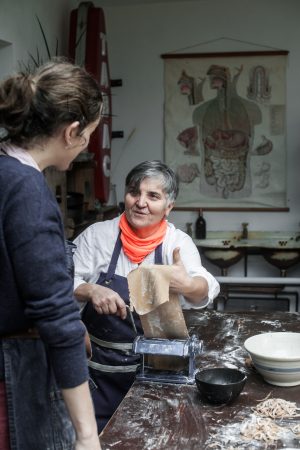 Why don't you teach for free?
Why don't you teach for free?
Even when we run our courses here at The School, we learned that gifting our time did not necessarily result in commitment from students. Indeed the research consistently shows that personal investment in a program or treatment can significantly impact its success. This concept, I was told by a social prescriber of many years, is called having "skin in the game" reflects the principle that when individuals contribute financially to their health and wellness journeys, they are more likely to be committed, engaged, and ultimately, to see improved outcomes.
When patients invest in their membership to The Sourdough Club, even at a heavily discounted rate, they are essentially making a commitment to their health. This financial contribution signifies their dedication to the process and the value they place on the benefits they stand to gain.
This isn't merely a transaction; it's a powerful psychological contract. It signals an intention, a commitment to their journey towards better health. It's not about the amount of money spent; it's about the act of investing in oneself. This commitment often translates into a higher degree of participation, more consistent engagement, and a greater sense of responsibility for their outcomes.
Therefore, by ensuring patients have some "skin in the game" we are not only making our programs accessible but also encouraging the level of commitment necessary for real, lasting change. This is why our BALM graduates have the ability to offer discounted memberships rather than fully subsidised ones, aligning with our mission to empower patients to take an active role in their health journey.
Prescribers’ Licence Fee: Cost and Structure
 Prescribers' Licence Fee Structure for BALM Graduates. This structure is designed to support our community of prescribers in their work while ensuring the sustainability of our club.
Prescribers' Licence Fee Structure for BALM Graduates. This structure is designed to support our community of prescribers in their work while ensuring the sustainability of our club.
The annual licence fee for BALM Graduates is set at £299. This enables graduates to prescribe up to 12 Social Prescriptions Memberships per year, allowing patients to benefit from our services at a heavily discounted rate.
In addition to the licence fee, graduates are asked to maintain an active Alumni Membership at a cost of £21.99 per month. This membership ensures they stay up-to-date with the latest findings and developments in our field and helps support the ongoing operation of our club.
By joining as licenced prescribers, our graduates are not only investing in their own professional development but also playing a crucial role in our mission to bring the benefits of sourdough baking to a wider audience. We are deeply grateful for their support.
The value of your vouchers
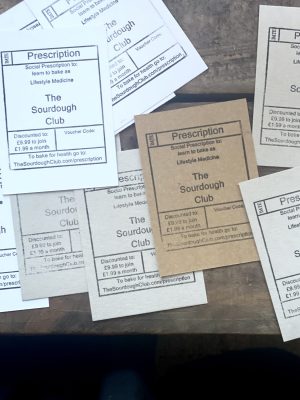 Total 12 of each Social Prescriptions Memberships per year
Total 12 of each Social Prescriptions Memberships per year
As a healthcare provider, your primary goal is to improve the health and wellbeing of your patients. The BALM (Bread as Lifestyle Medicine) course offers an innovative and compelling way to achieve this goal. This course goes beyond traditional medicine, integrating the art and science of sourdough baking into a holistic approach to health improvement.
Our studies within The Sourdough Club have consistently shown significant improvements in both mental and physical health of our members who follow the BALM protocol. From enhancing gut health to reducing stress and anxiety, the benefits of this approach are multifaceted and deeply transformative.
But the value of the BALM course extends even further. As a BALM Graduate, you will have the ability to significantly impact the lives of your patients by offering them discounted memberships to our club. Each year, you can provide thousands of pounds worth of vouchers, allowing your patients to experience the benefits of sourdough baking at a fraction of the cost. This empowers your patients to take an active role in their health journey while offering them a supportive community and a wealth of resources.
This course represents more than a professional development opportunity. It's a chance to broaden your toolkit, improve patient outcomes, and become part of a movement that promotes a healthier, happier society through the power of sourdough baking. Join us in this delicious defiance against the industrialisation of our most basic food and become a change-maker in your community today.
The Maths – explaining how 24 memberships a year amount to over £10,000 worth of memberships to your patients.
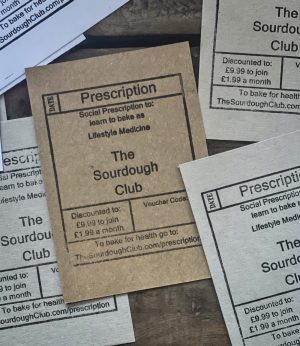 Your allocated prescriptions:
Your allocated prescriptions:
The cost for regular membership is £299 (registration fee) + £15.99 x 12 (monthly tuition fee) = £490.88 per membership. For 12 memberships, this totals £5,890.56 (£490.88 x 12).
However, the graduates are able to prescribe the Social Prescription Memberships at a cost of £9.99 (registration fee) + £1.99 x 12 (monthly tuition fee) = £33.87 per membership. For 12 memberships, this totals £406.44 (£33.87 x 12).
So, the difference in value, which can be seen as the 'voucher' value that the graduates are offering to their patients, is £5,890.56 - £406.44 = £5,484.12 per year.
Similarly, for the Socially Discounted Club Memberships:
The cost for regular membership is £299 (registration fee) + £15.99 x 12 (monthly tuition fee) = £490.88 per membership. For 12 memberships, this totals £5,890.56 (£490.88 x 12).
The graduates are able to prescribe Socially Discounted Club Memberships at a cost of £49.99 (registration fee) + £4.99 x 12 (monthly tuition fee) = £109.87 per membership. For 12 memberships, this totals £1,318.44 (£109.87 x 12).
So, the difference in value for the Socially Discounted Club Memberships, which can be seen as the 'voucher' value that the graduates offer to their patients, is £5,890.56 - £1,318.44 = £4,572.12 per year.
Therefore, each graduate, through the use of these discounted memberships, is providing a total value of £5,484.12 (from Social Prescription Memberships) + £4,584.12 (from Socially Discounted Club Memberships) = £10,068.24 in discounts to their patients each year.
This represents a substantial value that graduates can provide to their communities, which is an excellent selling point for your course. This is more than just a course - it's an opportunity for graduates to make a tangible difference in the health of their patients through the power of sourdough baking.
Our Privacy and Confidentiality Commitment in Social Prescribing
We understand that, as healthcare providers, maintaining the privacy and confidentiality of your patients is of the utmost importance. When it comes to social prescribing, specifically for memberships, to The Sourdough Club, we take this responsibility very seriously.
The process is akin to providing a gym membership voucher - the decision to join and participate lies entirely with the patient. The patient independently joins us, and we do not share any information about them with you. However, we encourage them to complete self-assessment forms and discuss their feedback with you, fostering open communication and informed care.
Our team, though small, is diligent and strictly adheres to privacy and GDPR guidelines. Our forums are closed, and monitored by staff from both sides of the Atlantic multiple times a day, ensuring a safe and secure environment for all members. Every team member has signed confidentiality agreements, and we uphold rigorous data protection standards.
Additionally, while we share resources with other businesses, it's crucial to note that each entity operates as a separate limited company with independent databases and business structures.
Finally, at The Sourdough Club, we uphold a strict policy of equality. All members are treated equally and there is no differentiation of membership levels. This egalitarian approach extends to our administrative functions. When members sign in, we don't differentiate or discriminate - everyone is a valued part of our community.
In summary, our approach to social prescribing is designed with the utmost respect for privacy, confidentiality, and equality. We provide an environment where your patients can safely invest in their health and wellbeing, supporting them on their journey to better health through bread.
How do the 6 Pillars of Lifestyle Medicine Underpin BALM?
In this video, Vanessa gives a detailed explanation of how BALM is underpinned by the six pillars of Lifestyle Medicine. The six pillars are evidence-based, and together they are referred to as Lifestyle Medicine.
Where is The Sourdough School Based?
LOCATION
Vanessa’s Sourdough bread making classes are a world away from the hustle and bustle in a pretty village just 4 miles north of Northamptonshire – which is possibly one of the most easily accessible counties in England. We are within an hours reach of London, Oxford, Milton Keynes, Cambridge, Leicester and Birmingham, which is just 15 – 20 minutes form the M1, the M6 and the A14.
Driving distances to The Sourdough School
- London 75 miles via M1
- Cambridge 55 miles via A14
- Oxford 48 miles via A43
- Birmingham 53 miles via M6
- Manchester 135 miles via M6
The train station is also only a 15 minute taxi ride away, making it really easy to get to us from London on the train.
BY TRAIN
There are regular trains from London Euston and Birmingham to Northampton.
Central London – trains go directly from London Euston station to Northampton station and take about 55 minutes. A taxi to the school from Northampton station takes about 15 minutes.
If there is ever a problem with the Euston to Northampton line, trains also run from St Pancreas to Wellingborough and Market Harborough both of which are about a 20 minute taxi drive away.
Birmingham – trains go from Birmingham to Long Buckby station and take about 40 minutes. A taxi from Long Buckby station to the school is about 15-20 minutes. Long Buckby is a rural station so there are no black cabs here.
Check www.nationalrail.co.uk for train times. We are about 15 – 20 minutes away from the station by car, dependent on traffic.
Taxi service from the Train station. We have a super taxi service called KPD Taxis with a set fee of £13.50 (week days) or £15 (weekends) to bring students to the school. If there is more than one student traveling then they will bring you all at the same time, and will advise you regarding the lower fare. To use this taxi service call 01604 882798 or email [email protected]
Other Northampton taxi companies are:
Amber Cars – 01604 232666 https://www.ambercarsnorthampton.com/
Ace Cars – 01604 719697
Bounds – 01604 626262
Phoenix Class – 01604 222222
We would advise that you pre-book a taxi to take you from the train station to the school, and vice versa. Black cabs at the train station are more expensive.
BY AIR
The closest airports are –
Birmingham – there are regular trains direct from the airport to Long Buckby (about 40 minutes). Then take a taxi to the school (approximately 15 minutes). You will need to pre-book a taxi as this is a small rural train station and there is no taxi rank.
Luton – the quickest option is to take a taxi from the airport (approximately 50 minutes) – we have used Skyways Cars before. The most affordable option is the National Express bus service to Northampton town centre which takes about 1 hour 15 minutes. Then take a taxi or the X7 bus from the bus station to the school. The bus stop at the top of Pitsford village is about a 10-15 minute walk to the school. You can book National Express bus journeys online.
East Midlands – a taxi from the airport will take a little under an hour. National Express runs two buses each weekday, the journey to Northampton town centre takes either 2 hours 15 minutes or 2 hours 50 minutes depending on which service you take. You will then need to take a taxi or an X7 bus from Northampton town centre to the school.
Stanstead – trains run every 20 minutes from Stansted to Tottenham Hale underground from where you can get an underground train to London Euston. Overland trains from Euston run hourly to Northampton. You can then take a taxi or the X7 bus from the bus station to the school. The train station is about a 15 minute walk to the bus station.
Heathrow – trains via Euston London take about an hour to Northampton railway station. To get to Euston from Heathrow follow signs for the London Underground, take the Piccadilly Line to Green Park, then the Victoria Line to Euston. Allow an hour to get from Heathrow to Euston.
Or you can just take the Piccadilly Line straight to Kings Cross St. Pancras and walk to Euston (about ten minutes). From Northampton train station to get to the school you will need to take a taxi (about 15-20 minutes). If you can pre-book a taxi it will be cheaper.
Alternatively you can take a bus to Watford Junction and then the train to Northampton (both run hourly) this takes 2¼ hours.
When you are booking flights around a course at The Sourdough School, please allow plenty of time for travel between the school and the airport.
By Bus
There is a stagecoach service which will drop off at the main road on the A508 which is about a 10 – 15 minute walk into the village here – please contact me for more details of which stop is best to get off at. You will need the X7 bus.
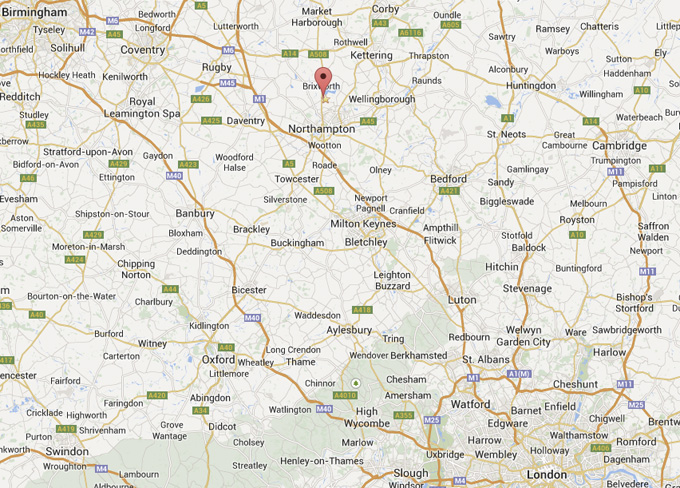
NORTHAMPTON IS BASED WITHIN EASY REACH OF LONDON, OXFORD, CAMBRIDGE, MILTON KEYNES, BIRMINGHAM.
Address for a detailed map and the address please email [email protected]
There is plenty of parking and you can expect a warm welcome.
What is the address & directions?
The School is in the grounds of our home. It is not open to the public, and this is why we do not publish our address.
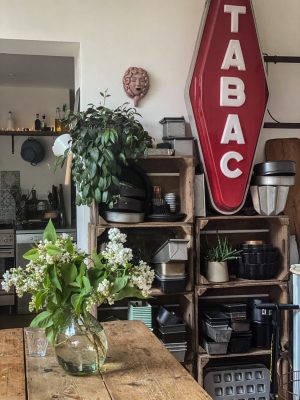
We are located in Pitsford, Northamptonshire.
The address for in-person courses is my home and is not publicly listed. You will only receive directions once you have completed your registration and read the automated confirmation email sent to you when you enrol.
If you are unable to find the confirmation email, please check your spam or promotions folder. The information has already been sent, and it is essential that you follow the instructions provided there. This is the only way to receive the directions and access your course materials.
Why do I need the printed instructions to find you?
Once you have the directions please do not rely on SatNav alone. SatNav's postcode will take you 150 yards up the road or to the wrong village or, in some cases, to the wrong village. Directions are clearly given in the email, but for ease:
Arriving from the A508: drive through the village to the first bend. On the right you will see two white cottages; just before the zebra crossing zigzags, look for the old blue five-bar gate.
Arriving from Moulton village: we are the first gate on the left after Drummond Close and before the white cottages, exactly where the zigzags end.
Please park considerately.
A list of local taxi companies

There are several cab companies we recommend.
We are in a rural location so we have a good working relationship with two local firms:
- KPD 01604 882798 [email protected]
- AMBER CARS 01604 232666 https://www.ambercarsnorthampton.com/
We have noticed that the black cabs from the train station can cost a lot more and often cannot find us. Also please book your return taxi! We are slightly outside of the town and sometimes taxis are not available at busy times at short notice.
You are free to use any taxi service you like so other Northampton taxi companies are:
Ace Cars – 01604 719697
Bounds taxis – 01604 626262
Phoenix Class – 01604 222222
Sharing lifts
Often students want to arrange taxi sharing or lifts with other students, but we are not able to be involved. This is at your own risk. This is a personal arrangement between people attending the course please be aware that we hold no responsibility or liability whatsoever for any arrangements made privately.
Why we check your baking ability before you attend a Retreat
The Retreats are what we call a combined course, with a minimum of 6 months of online lessons on the Bake for Health online course before you attend in person
We want you to have an amazing week. So this is really important that you follow the course syllabus on the Bake for Health Online before you attend.When you are going to spend time with people who are have baked before and learn from Vanessa then being familiar with the recipes and structure of the recipes will make a huge difference to your enjoyment of the course, and to the other attendees.
This means you are familiar with the basics, including sourdough starter refreshment, baking terms, and basic techniques.
It is mastering this basic knowledge that make the course go smoothly. We know it is sometimes hard to find the time, but we find those students who have followed the online lessons benefit immensely. We also know that if if you have not followed the online course then you will find the retreat style frustrating because it builds on the foundational knowledge learned before attending.
To ensure you get the most out of your time at the school we ask that you practice our classic beginners sourdough formula before attending. This formula is also the classic 20% retarded loaf on page 114 of the sourdough school book.)
You are required to email us a photo of this sourdough bread, or equivalent at least 8 weeks before your in person course starts.
What happens if I need help with my baking when I get home?
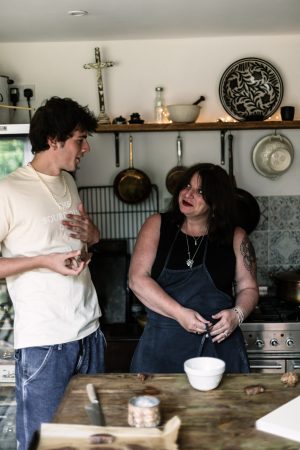
Your learning journey doesn't stop when you leave the school – it truly has just begun. With your Sourdough Club membership, you're never alone in your sourdough baking journey.
The Sourdough Club membership provides comprehensive, top-level support to help you continue your sourdough journey with confidence. Remember, leaving the school doesn't mean the end of your learning journey - every bake is a new opportunity to learn and grow in your understanding of the sourdough process.
A key aspect of this membership is your access to Vanessa Kimbell, our founder and sourdough expert. There will inevitably be times when your sourdough baking may not go as planned, and you need help identifying the issue. Vanessa is often available to assist in these instances.
However, to enable her to provide you with the best possible advice, it's important that you provide a complete set of information regarding your baking process. This includes specifics about your ingredients, methods, timings, and any issues you're experiencing. This thorough understanding will help Vanessa guide you effectively through your sourdough challenges and ensure your continued growth as a baker.
We have weekly live Q&A sessions and a Club Forum to enable you to get the support and help you need.
How do I get my sourdough starter home?
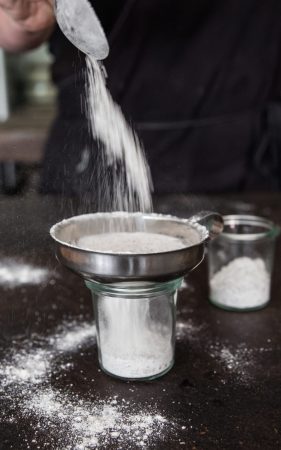 Many of our students ask me about the practicalities of taking their sourdough starters home with them. They have travelled from around the world to visit the school, so it’s only natural that they have concerns about getting their starter back home. But in fact, it’s very straightforward. Sourdough starters, when they are refreshed correctly, can remain out of the fridge for between 24 and 36 hours as long as they are kept at a regular temperature. This means that most journeys can be accomplished between refreshments… if not, it’s very easy to maintain your starter while still on the road (or train or plane!)
Many of our students ask me about the practicalities of taking their sourdough starters home with them. They have travelled from around the world to visit the school, so it’s only natural that they have concerns about getting their starter back home. But in fact, it’s very straightforward. Sourdough starters, when they are refreshed correctly, can remain out of the fridge for between 24 and 36 hours as long as they are kept at a regular temperature. This means that most journeys can be accomplished between refreshments… if not, it’s very easy to maintain your starter while still on the road (or train or plane!)
When you leave the school, we supply you with a small pot which contains 80g of sourdough starter. We also give you a bag for the starter to travel in. We refresh the starter on the last day of the course before you leave, to ensure it’s at the optimum point and ready to travel home. We also supply small bags of flour, so if anybody needs to continue refreshing their sourdough starter for a few days before they go home or on the journey, then they are able to do so. Keeping your starter healthy is a very simple process and will be fully explained on the course. But essentially, to refresh your starter you take ¾ (60g) of the starter out of the 80g we give you. Then stir 35g of water and 25g of flour into the remaining ¼. All you'll need is a small spoon or, at a push, you can use your fingers for mixing. This ratio of flour and water keeps your starter slightly thicker than you would normally have it, which slows down the rate at which the bacteria consume their food source.
There are a couple of considerations to bear in mind when you are travelling – the main one to remember is that your sourdough starter is still fermenting and is going to be producing gas. It’s worth opening the lid every few hours to release these. If you forget, the worst that can happen is that the gases build up and pop the lid so that a little of it spills out into the plastic bag. This isn’t really a problem because you can wash the starter out of the plastic bag when you get home, although you will only need 20-25g of it to refresh anyway.
Taking your sourdough on an aeroplane.
I don’t recommend keeping the bags of flour in your hand luggage because, more than likely, you will be stopped and have it tested at the airport. But I do prefer to carry my starter in hand luggage. It can safely travel in the hold. It will get cold but certainly shouldn’t come to any harm. If you decide to take it in your hand luggage, remember that it will be subject to the restrictions on liquids and gels, so don’t try to carry too much. I also find it helps to clearly label the container or bag with the contents… if nothing else, it can lead to some interesting conversations at security!
It’s really not a problem to travel with your sourdough starter. I’ve taken mine all over the world. In fact, the sourdough starter you will be leaving The Sourdough School with is part of a starter that has already been all over Europe, as well as to India and the USA. So we’re sharing a very well-travelled starter with you!
What are the Key Learning Objective of The Diploma?
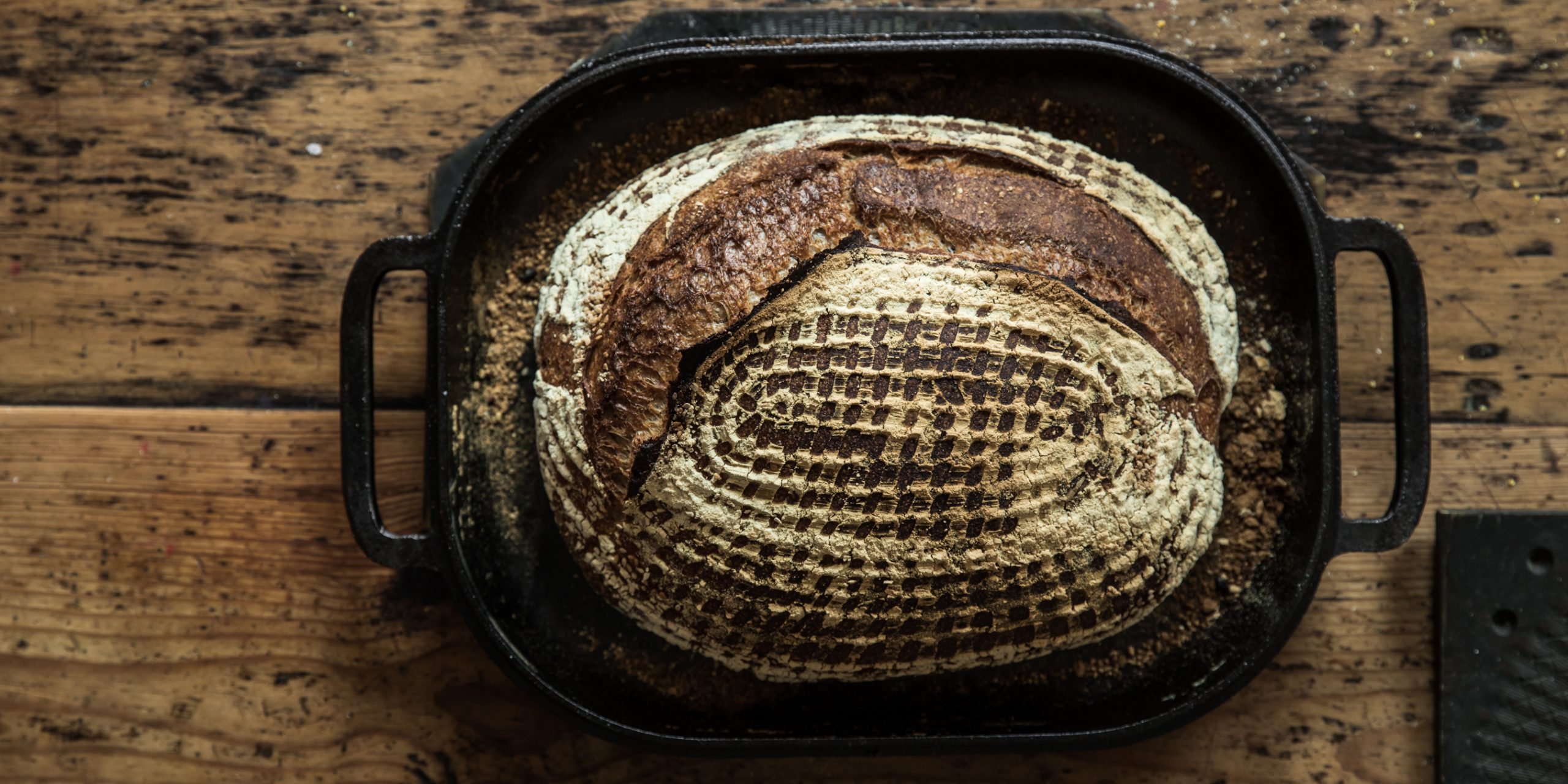 Learn to personalise bread.
Learn to personalise bread.
Bread is possibly one of the most misunderstood foods on the planet. When made well, according to the BALM Protocol, bread can support health; on the other hand, poor quality bread will ruin your health when eaten over a lifetime. It is time that we better understand that the way we respond to bread is unique. Personalising bread is a transformative approach to nutrition, focusing on tailoring bread recipes to the individual, taking into account their gut microbiomes and lifestyle factors.
It is about acknowledging the uniqueness of each person's response to bread, driven not just by differences in DNA, microbial composition, and daily habits but also by the way in which people eat their bread.
Cutting-edge knowledge of bread, the gut microbiome and lifestyle medicine
Being able to offer a bespoke dietary solution to enhance health and well-being. Personalisation extends beyond mere baking; it incorporates dietary patterns and lifestyle changes to optimise gut health, nutrient absorption, and overall metabolic health. You will learn how customisation supports preventative health measures, potentially mitigating future health issues by aligning bread consumption with personal health needs and preferences. This approach represents a cutting-edge integration of nutrigenetics and lifestyle medicine, enabling individuals to make informed, health-supportive choices in their baking and eating habits. You will understand and learn how to personalise bread as well as how to bake, eat, and share each approach to bread. You will also learn the many ways that you can personalise bread for many health and social reasons.
Throughout the course, you will:
-
- Learn how to personalise bread baking as lifestyle medicine, which is about helping people avoid lifestyle diseases by empowering them to bake, eat, and share bread. When applied as Lifestyle Medicine, it is a practical and achievable way to improve health. For healthcare practitioners, you will also learn how to use this to prescribe Baking As a Lifestyle medicine to comply with NHS social prescribing guidelines.
- Understand Long, Slow Fermentation: Learn the mechanisms of how this process transforms bread and enhances gut microbiome and mental health through the Sourdough School Bread protocol.
- Impact of Mass-Produced Bread: Explore how low-quality bread and baked goods negatively affect health.
- Gaining Insight through Biome Testing: Assess the impact of the BALM Protocol on gut microbiome and health by conducting biome tests and consulting with Research and Medical Directors.
- Appraise Case Studies: Review Sourdough School case studies showcasing improvements in physical and mental health outcomes.
- Apply Knowledge in Clinical Practice: Medical professionals can obtain a practitioner's license to prescribe BALM as part of their practice.
- Professional Skill Enhancement: Engage in continuous learning through workshops, seminars, and research on Baking as Lifestyle Medicine.
- Build Supportive Networks: Connect with healthcare professionals and bakers to share experiences and collaborate on health-promoting baking projects.
- Positive Community Impact: Understand how BALM can enhance community health through initiatives like the 'bake two, share one' principle.
- Recognize Social Prescription as Activism: Learn how prescribing BALM is a powerful form of health activism.
- Create and Share Case Studies: Develop and share a case study and a bread or cake recipe demonstrating the BALM Protocol.
- Prescribe BALM: At the end of the module, prescribe BALM based on a successful, ethically compliant case study.
- Weekly Baking Application: Use scientific knowledge from the syllabus to guide weekly baking and recipe creation.
- Mentoring Opportunities: Optionally mentor a young healthcare professional in the principles of BALM.
Transforming the simple act of baking, eating and sharing bread into a powerful tool for personal health management.
- Preventive Health: Understanding the impact of bread types, such as the fibre content in whole grains, on gut health can inform dietary recommendations for conditions like bowel cancer or cardiovascular disease.
- Lifestyle Diseases: The glycaemic index of bread is crucial for managing blood sugar levels, aiding in the prevention and management of conditions like Type 2 Diabetes, obesity, and hypertension.
- Mind and Body Wellness: Different bread types can influence the gut-brain axis, affecting mental well-being and cognitive functions.
- Neurodiverse Needs: Tailoring bread consumption can play a role in dietary management for individuals with ADHD or autism spectrum disorders.
- Nutritional Goals: Bread's nutritional composition, including fibre, vitamins, and minerals, is key for gut health and overall nutrition.
- Weight Management: Choosing the right type of bread can be integral to a balanced diet for weight control.
- Digestive Health: Specific bread types can help manage conditions like IBS, gas, bloating, Crohn's Disease, and Diverticulitis.
- Immune System Support: High-nutritional-value bread can bolster the immune system, aiding recovery from illness or inflammation.
- Gluten Sensitivities: Understanding how different breads affect gluten sensitivity or wheat intolerance is crucial for dietary choices.
- Specific Diet Support: Bread choices can complement dietary needs like vegetarian, vegan, or paleo diets.
- Dietary Management for Medical Conditions: Bread type is important for blood sugar control in diabetes management.
- Medical Treatment Support: Certain breads may be more suitable for patients undergoing chemotherapy or radiation therapy treatments.
- Clean Eating Goals: Organic and naturally sourced breads align with reducing exposure to pesticides and herbicides.
- Mental Wellbeing: The gut-brain axis influenced by bread consumption can impact mood balance, anxiety, and depression.
- Performance Enhancement: The right type of bread can support athletic performance and endurance.
This module is also the foundational knowledge for healthcare practitioners to use bread as a personalised tool for enhancing health and well-being, aligning with individual patient needs and health objectives for social prescribing baking as lifestyle medicine.
The effect of sourdough Fermentation on the Gut microbiome and mood
The Project Proposal
THE SOURDOUGH SCHOOL PILOT STUDY
The effect of sourdough Fermentation on the Gut microbiome and mood
Background
Wheat represents one of the world’s major sources of food with up to 300 million tons consumed annually, and bread is highly consumed worldwide (Watson R.R, 2014). Cereal fermentations has changed significantly in the past 150 years, and industrially produced fast fermented bread has become part of the staple diet. Despite this, there is an increasing body of evidence that long slow fermented sourdough bread, produced with a symbiotic live culture of lactic acid bacteria and wild yeast, have potential health (Gobbetti et al., 2019). Moreover, eating wholegrains is associated with many health benefits and epidemiological findings show that consumption of wholegrains have a protective effect against several metabolic diseases, which in part has been attributed to the phenolic compounds and dietary fibres in cereal (Vitaglione, Napolitano and Fogliano, 2008a). The bioavailability of fibre in breads can remarkably be influenced by fermentation. The long slow fermentation of bread, using lactic acids bacteria and wild yeast, significantly increased bioavailability of key nutrients including polyphenols and minerals to the microbes in the gut (Anson et al., 2009; Ripari, Bai and Gänzle, 2019; García-Mantrana et al., 2016).
In recent years gut microbiota has experienced an extraordinary level of intense investigation (Blaser, 2014). Interactions between dietary factors, the gut microbiome, and host metabolism are increasingly shown to be important for maintaining both physical and mental health. (Cani and Delzenne, 2007). From a systematic review, 39 out of 42 studies showed an increase in microbiota diversity and/or abundance following intact cereal fibre consumption (Jefferson and Adolphus, 2019)(Jefferson and Adolphus, 2019). Moreover, in a recent study on rats, the authors provided evidence that the consumption of sourdough-leavened bread vs yeasted bread had the potential to appreciably change the gut microbiota of rats, and in turn affect the metabolic functions of two key phyla, Bacteroides and Clostridium (Abbondio et al., 2019). On the other hand, a study comparing the effects of whole-grain sourdough bread against industrial white bread did not observe any significant changes in the gut microbial balance or composition. However, this may have probably been due to the short consumption period (1 week) (Korem et al., 2017b).
Increased levels of dietary fibre have been shown to increase the levels of short chain fatty acids (SCFAs) in the gut, which are considered to be anti-inflammatory and are required for optimal health (Vitaglione, Napolitano and Fogliano, 2008b). This suggests that an increase in the bioavailability of fibre via fermentation may modulate the composition of the gut and increase SCFAs.
The World Health Organization (WHO) estimates that 322 million people, which is around 4.4% of the global population, are currently suffering with depression (GBD 2017 Diet Collaborators, 2019). Accumulating data indicates that changes in gut microbiota can have a positive effect on mood, via the so called gut-brain axis, interacting with the neural, endocrine and immune pathways and so potentially influences brain function, mood and behavior (Wang and Kasper, 2014; Foster, Rinaman and Cryan, 2017) . For instance, it has been reported that certain bacterial species were found to inhibit inflammation and decrease cortisol levels resulting in an amelioration of the symptoms of anxiety and depression (Cheng et al., 2019).
Due to the paucity of studies on sourdough bread on gut microbiome and mood in humans, and their encouraging results, there is the need to further investigate into this promising area of research.
The majority of these studies lack sourdough process information, including the timings of the bread-making process and desirable dough temperature (the DDT), and the specific microbes in the starter, which have an effect on the nutritional profile of the sourdough and available nutrients. Indeed, these factors affect the breakdown of nutrients, phytonutrients, bioactive peptides and minerals, the bioavailability of fibres, and the levels of prebiotics such as resistant starch in the sourdough, all of which could have an impact on the gut microbial composition and balance. (Gänzle and Zheng, 2019). This contribution of sourdough process information will be addressed in this study.
The research Question.
How does the BALM protocol, when applied over a ten-week period, affect changes in mood states and changes in the balance of the gut microbiome and to what extent can alterations in the gut microbiome composition explain any observed mood changes or impact any self-reported symptoms?
Study hypothesis
We hypothesise that baking and eating sourdough bread according to the BALM protocol would result in changes in microbiome balance and that the combination of making bread and eating higher levels of diverse fermented fibre could potentially influence the balance and levels of gut-derived metabolites, such as SCFA, which may in turn influence mood and self-reported symptoms related to increasing fibre and potentially might relate to changes in the balance of the bacteria in the gut.
Study design
A parallel dietary intervention study designed with ten healthy participants over 18 years of age and not on current medications will be carried out. People who have recently used (less than one month) probiotic or high-fibre supplements, and antibiotics (currently or in the last 3 months), have chronic conditions, such as IBS, diabetes, clinically diagnosed mental disorders, or celiac disease, will be excluded from the study. During a period of 10 weeks, participants bake, eat and share bread according to the BLAM protocol. Before and after the 10 week intervention, participants will collect a stool sample. Stool samples will be sent directly to Atlas Biomed where they will undergo 16s RNA sequencing to profile the gut microbiome.
Participants will be asked to record their mood at baseline (before the start of the trial) and continue to do so on a daily basis for the 10 week period using a score of 1 – 10 for their mood, based on The Warwick-Edinburgh Mental Wellbeing scale (WEMWBS).
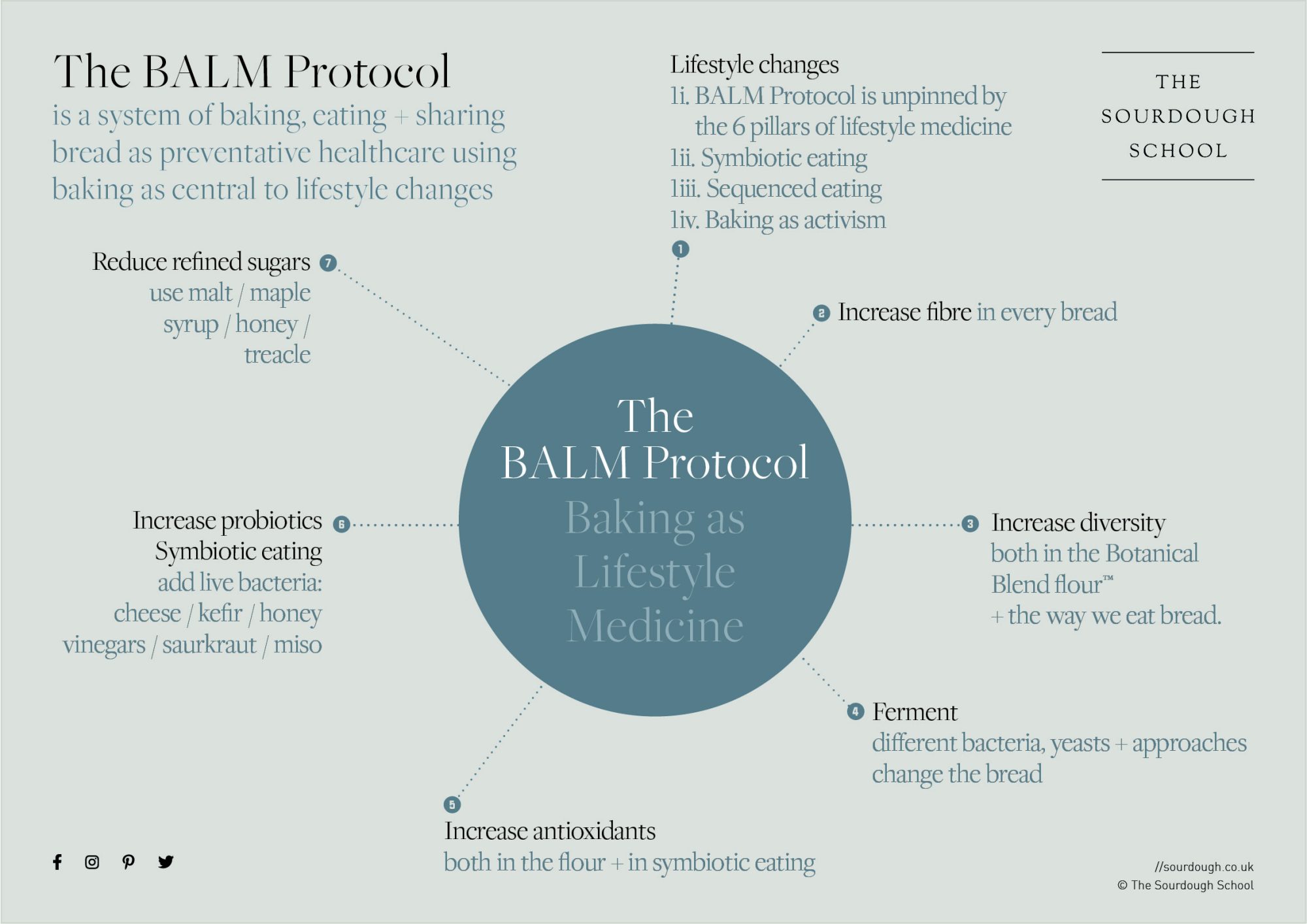
Sourdough supplementation
Before starting the trial, all the participants will receive all the materials and equipment that they need in order to bake for 10 weeks. Volunteers will have the choice to either attend a free online support and follow The Sweet Sourdough School book at the Sourdough School (https://www.sourdough.co.uk/) where a professional baker will teach them how to bake bread or access the online video course to learn to make the bread. Full baking training and support will be given to the participant at The Sourdough School. Each participant will act as their own control, with the first gut test results being compared to the last tests and scoring their own unique health symptoms.
Data collection methods
Before and after the 10-week intervention participants will self-report how they feel and their symptoms. They will collect a stool sample using a certified kit provided by Atlas Biomed. Stool samples will be sent directly to Atlas Biomed, where they will undergo 16s RNA sequencing to profile the gut microbiome, including metrics of microbiome diversity and gut-derived metabolites such as short chain fatty acids. In addition, the bacterial content of the starter culture will be known as it will be supplied by Puratos. Faecal samples will be collected during the week before the start and at the last day of the 10 week intervention. Participants’ mood will be measured using a simple scale based on The Warwick-Edinburgh a Mental Wellbeing scale ( WEMWBS) that was developed to enable the monitoring of mental wellbeing in the general population and to evaluate projects, programmes and policies which aim to improve mental wellbeing. Participant will be asked to follow the diet and report weekly on their symptoms and mood for the duration of the study.
Data Analysis
Statistical analysis will be completed via IBM SPSS. Data will be initially examined for normality and homogeneity of variance prior to using parametric tests. If the appropriate conditions are not met, the appropriate non-parametric tests will be chosen. P-values P<0.05 will be considered statistically significant. Interviews with the Sourdough School team will feedback to individuals their results and discuss outcomes in recorded interviews.
Application Process & Consent form
Social Media, including blog posts, Instagram, Twitter & Facebook will be used to attract applicants and a local village newsletter, in Pitsford. Slightly modified versions (based on the media used) of the following text will be used:
“Take Part in a Sourdough Study
It's time to better understand the bread we eat and how it affects us. We are exploring how eating long slow fermented wholegrain sourdough might modulate our gut microbiome and affect mood positively.
We are currently recruiting volunteers for a groundbreaking pilot study to gather data and generate a better answer for everyone to the questions: Does baking according to BALM Protocol benefit gut health? And if so does this impact the way we feel?
So what does getting involved mean?
You will need to sign-up to see whether you are suitable for this study. You will ask to provide stool samples that we can use to understand the bacteria in your gut better and keep a food and mood diary over 10 weeks.
To register your interest in our study and find out more visit our website https://www.sourdough.co.uk/sourdough-research/.
#sourdough #personalisednutrition #personalizednutrition #guthealth #nutritionresearchUK #nutritionisascience postprandialresponse #gutmicrobiome sourdoughschool”
Participants who respond to a social media post or newsletter will be directed to a participant information sheet. This form will contain all the information explained in lay terms details about the study and what is required to participate. Form (https://www.sourdough.co.uk/sourdough-research/)
Should the participant decide to register an interest then they will be screened for exclusion criteria by asking them to fill in an application form. (https://www.sourdough.co.uk/research-participation-consent-form/ ). Should the participant meet the inclusion criteria for the study they will receive a consent form which will be provided in electronic form for each participant, and an email that reminds them of the participant information sheet. Evidence of a completion of informed consent will be obtained before the research starts. We will use a digital verification software, such as HelloSign.com or Docusign.com.
Ethical issues
The proposed study will comply with the Data Protection Act and standard University Good Scientific Practice guidelines. All contact details, electronic consent forms and electronic data will be stored in a password protected hard drive-in locked offices at the sourdough school East Bank House, Moulton Road, Pitsford, Northampton, NN69AU. Participants will be offered an ID code which will be used instead of their name, and if requested any identifiable information will be removed. Participants will be offered a consent form to allow their test results and feedback video to be used on The Sourdough School website as case studies for training for students.
All raw and analysed data will be kept for 5 years. Data collected for this project is consensually shared with other individuals not officially involved in the research project. Additional emphasis and clarity will be made on the time involved, we make clear how data will be analysed and protected, and the participants have freedom to withdraw consent at any time. The Sourdough School is GDPR compliant.
The stool samples will be collected by the participants and directly sent to Atlas Biomed to be anlaysed, therefore this procedure does not require a Human Tissue license.
Risks to participants
The study design implies very low risk to the participant.
- Sourdough and baking components are certified food products and are sold over the counter.
- The stool samples will be processed by CE IVD-certified device according to its intended purpose but a gut testing company.
- An increase of fibre and/or probiotics in diet may, in some cases, cause flatulence or bloating; in this case, a participant might consider skipping the next meal of sourdough or completely stopping the participation at his/her own convenience.
- Participants will need to bake and follow basic health and safety in their kitchen whilst making recipes
REFERENCES
Agriculture, Forestry and Fishery Statistics—2016 Edition; Available online: https://ec.europa.eu/eurostat/web/products-statistical-books/-/KS-FK-16-001.
Watson R.R., Preedy V.R., Zibadi S. Wheat and Rice in Disease Prevention and Health: Benefits, Risks and Mechanisms of Whole Grains in health Promotion. Academic Press; Cambridge, MA, USA: 2014
ABBONDIO, M. et al. (2019) Fecal Metaproteomic Analysis Reveals Unique Changes of the Gut Microbiome Functions After Consumption of Sourdough Carasau Bread. Frontiers in Microbiology, 10, pp. 1733.
ANSON, N.M. et al. (2009) Bioprocessing of wheat bran improves in vitro bioaccessibility and colonic metabolism of phenolic compounds. Journal of Agricultural and Food Chemistry, 57 (14), pp. 6148-6155.
BLASER, M.J. (2014) The microbiome revolution. The Journal of Clinical Investigation, 124 (10), pp. 4162-4165.
CANI, P.D. and DELZENNE, N.M. (2007) Gut microflora as a target for energy and metabolic homeostasis. Current Opinion in Clinical Nutrition and Metabolic Care, 10 (6), pp. 729-734.
CHENG, L.et al. (2019) Psychobiotics in mental health, neurodegenerative and neurodevelopmental disorders Available from: http://www.sciencedirect.com/science/article/pii/S1021949819300158.
CODA, R., RIZZELLO, C.G. and GOBBETTI, M. (2010) Use of sourdough fermentation and pseudo-cereals and leguminous flours for the making of a functional bread enriched of ?-aminobutyric acid (GABA)Available from: http://www.sciencedirect.com/science/article/pii/S016816050900659X.
DE VOS, W.M. and DE VOS, E.A. (2012) Role of the intestinal microbiome in health and disease: from correlation to causation. Nutrition Reviews, 70 Suppl 1, pp. 45.
FOSTER, J.A., RINAMAN, L. and CRYAN, J.F. (2017) Stress & the gut-brain axis: Regulation by the microbiome. Neurobiology of Stress, 7, pp. 124-136.
GÄNZLE, M.G. and ZHENG, J. (2019) Lifestyles of sourdough lactobacilli – Do they matter for microbial ecology and bread quality? Available from: http://www.sciencedirect.com/science/article/pii/S0168160518305427.
GARCÍA-MANTRANA, I.et al. (2016) Expression of bifidobacterial phytases in Lactobacillus casei and their application in a food model of whole-grain sourdough bread Available from:http://www.sciencedirect.com/science/article/pii/S0168160515301173.
GBD 2017 DIET COLLABORATORS (2019) Health effects of dietary risks in 195 countries, 1990-2017: a systematic analysis for the Global Burden of Disease Study 2017. Lancet (London, England), 393 (10184), pp. 1958-1972.
GOBBETTI, M. et al. (2019) Novel insights on the functional/nutritional features of the sourdough fermentation. International Journal of Food Microbiology, 302, pp. 103-113.
HERVERT-HERNÁNDEZ, D.et al. (2009) Stimulatory role of grape pomace polyphenols on Lactobacillus acidophilus growth Available from: http://www.sciencedirect.com/science/article/pii/S0168160509004954.
JEFFERSON, A. and ADOLPHUS, K. (2019) The Effects of Intact Cereal Grain Fibers, Including Wheat Bran on the Gut Microbiota Composition of Healthy Adults: A Systematic Review. Frontiers in Nutrition, 6, pp. 33.
RIPARI, V., BAI, Y. and GÄNZLE, M.G. (2019) Metabolism of phenolic acids in whole wheat and rye malt sourdoughs Available from: http://www.sciencedirect.com/science/article/pii/S0740002018303368.
VITAGLIONE, P., NAPOLITANO, A. and FOGLIANO, V. (2008a) Cereal dietary fibre: a natural functional ingredient to deliver phenolic compounds into the gut Available from: http://www.sciencedirect.com/science/article/pii/S0924224408000447.
VITAGLIONE, P., NAPOLITANO, A. and FOGLIANO, V. (2008b) Cereal dietary fibre: a natural functional ingredient to deliver phenolic compounds into the gut Available from: http://www.sciencedirect.com/science/article/pii/S0924224408000447.
WANG, Y. and KASPER, L.H. (2014) The role of microbiome in central nervous system disorders Available from: http://www.sciencedirect.com/science/article/pii/S0889159113006004.
YANO, J.M. et al. (2015) Indigenous bacteria from the gut microbiota regulate host serotonin biosynthesis. Cell, 161 (2), pp. 264-276.
YUNES, R.A. et al. (2016) GABA production and structure of gadB/gadC genes in Lactobacillus and Bifidobacterium strains from human microbiota. Anaerobe, 42, pp. 197-204.
What are the Course Start time & End Times?
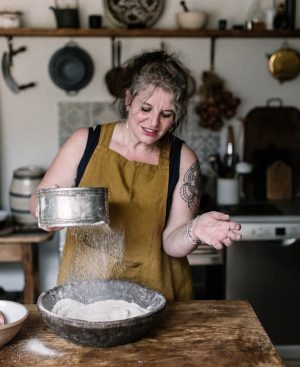
The typical operating hours for our courses are from 10 AM to 6 PM. However, it's crucial to note that each course follows its unique schedule. We encourage you to refer to the step-by-step pre-course information, The link would have been automatically emailed to you at the email address that you provided as you registered, which details the specific start times for your individual course.
Do not turn up early.
We emphasise the importance of starting our courses on time. As such, we kindly request that you refrain from arriving earlier than the designated starting time, which is typically 10 AM. The time prior to the course commencement is dedicated to meticulous preparation, akin to the final moments before hosting a dinner party, where the atmosphere is abuzz with activity.
If, for unavoidable reasons, you find that you will arrive early, we kindly request that you notify us at least two days in advance.
Courses usually conclude at 6 PM and we suggest arranging for taxis at 6:15 PM for example, allowing a slight buffer should the session run a bit longer.
Please bear in mind that it typically takes around 20 minutes to reach the Northampton train station from our location.
Tea and coffee?
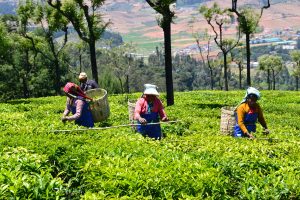
Tea and coffee breaks
We have lots of choice and a help-yourself policy, but our values go beyond bread, and include food justice and equality for all the ingredients we use.
This is more about the tea plantation in India, and Vanessa meeting the pickers. It's good to know that even the tea that we drink is part of the connection.
Is there a vegetarian or vegan option for lunch?
 There is always a vegetarian choice but please do let us know if you are either vegan or vegetarian in your Student Record Form.
There is always a vegetarian choice but please do let us know if you are either vegan or vegetarian in your Student Record Form.
We have almost all of our lunch menu recipes listed on the symbiotic eating section of the website. You can access the recipes once you are registered for your course.
Please ensure that you check out the recipes for any allergies.
We very occasionally serve local seasonal smoked, or preserved fish or meat, in general lunch is simple, homemade, seasonal, and based around the bread we are eating, but if we have Muslim students then we do not serve pork. We appreciate that some students like to bring their own food, but we would also like to remind students that we will not serve any gifts or purchases that are meat based if we have vegan students or pork if we have Muslim students.
Almost all the cheese served is unpasteurised
Almost all cheeses are British and unpasteurised, so please do let me know if you are not able to eat unpasteurised cheese. With a few day's notice, we can provide alternatives.
First aid and allergies
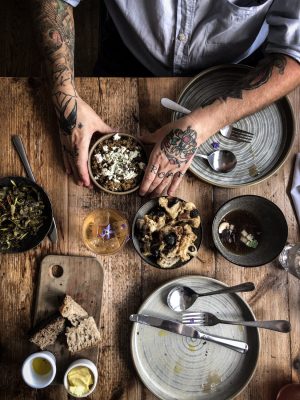 We are not a nut-free environment.
We are not a nut-free environment.
Please verbally brief Vanessa on any allergies in your interview.
Please remember to tell Vanessa when you arrive as it can be several months between the interview and attending. Your allergies are on your student form, but this gives you a chance to discuss any concerns when you arrive and to introduce yourself. This reminder is particularly important because other students may inadvertently offer you food that you are allergic to.
Vanessa is a trained St Johns Ambulance first-aider, please let Vanessa know of any other medical conditions on the day if they are not detailed on the booking form.
If you have an allergy that requires an epipen please notify Vanessa as soon as you arrive where this can be found.
We respectfully ask that students bring medication if they have serious allergies or are allergic to animals. Whilst we do keep the pets out of the way, we still need to ensure medication is on hand, just in case.
Can I take photographs?
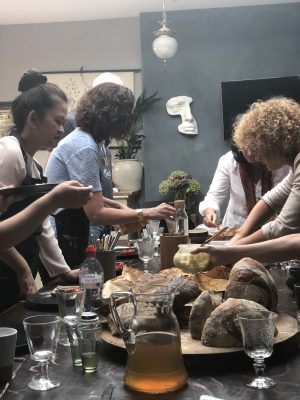
We have to have consent to take photos here at The Sourdough School. Please fill in this form
We respect that some people prefer to remain private, so please tell us if you wish to remain anonymous. Our policy about sourdough social media is to celebrate and share while respecting the preferences of all students and members of the team here at the school.
We are sensitive to both those who love social media and also those that don’t. You are welcome to take photos of the bread, lunch, the school and the garden and other bakes, but please avoid photographing people unless you have their consent.
Vanessa prefers not to be photographed except in some group shots. She is, however, happy to provide a range of photos which can be used within the WhatsApp group.
Photos in the classroom and garden are fine, but not our living space. No photos of Vanessa's children please (unless they expressly give their permission).
Do I need any of the Sourdough School books?
 Yes, you will really enjoy the course so much more if you have a copy of The Sourdough School book to make notes in. We use all the books during the courses but don't worry if not, we have copies.
Yes, you will really enjoy the course so much more if you have a copy of The Sourdough School book to make notes in. We use all the books during the courses but don't worry if not, we have copies.
What if I already have a copy?
Generally, there are copies of my book Food for Thought or ‘Prepped’ stocked so we will give you a copy of one of Vanessa's other books, or a gift from Vanessa's collection of vintage items.
Do I really need a Sourdough School Book?
Absolutely, bringing a copy of "The Sourdough School" book with you on your retreat will significantly enhance your learning experience, as we use it as a primary reference throughout our courses.
Why don't we include the books in the course fee?
Arranging book distribution has proven complex, as many of our students already have a copy. Interestingly, the cost on Amazon is often lower than what we can obtain from the publisher. Therefore, we encourage students to bring their own copies or notify us if they wish to purchase one on-site.
Please note that becoming familiar with the stages of making sourdough, as detailed in the book, will allow you to gain much more from the course. If you prefer not to purchase a copy, you are welcome to borrow one from the school and use my online teaching notes when you get home.
Do we have copies of your other books?
We generally have copies of my book "Food for Thought" available for purchase, but "Prepped" is rarely in stock. You're welcome to bring your own copies if you'd like them signed. Again, it's usually more cost-effective to purchase these online, as we must pay wholesale prices for our stock.
In addition, we also offer "10 Minute Sourdough" and "Sweet Sourdough" as options to buy, but please be aware that we may not always have these in stock.

Why are there pets at The Sourdough School?
The Sourdough School is situated within Vanessa Kimbell's personal residence.
While the school serves as an educational facility for a substantial part of the year, it primarily remains a home.
Our pets, including dogs and cats, are integral members of our household and contribute to our daily operations in their own unique ways. The dogs, for instance, alert us to visitors, while the cats help keep the premises free from mice, thereby eliminating the need for traps or poisons in our antique property.
Please do NOT fuss the Terrier.
Please note that one of our dogs, a rescue terrier, is not aggressive; however, she is not particularly friendly towards strangers, and she is deeply uncomfortable being touched. She may look friendly however she has poor sight and is old and she can be threatened. So while she looks friendly we ask that you refrain from petting or fussing over him.
Allergies
For those with allergies, we make every effort to keep our pets at a distance. However, due to the nature of our setup, we cannot guarantee a completely allergen-free environment. We, therefore, urge you to bring any necessary medication with you, as we cannot assure that the presence of our pets won't trigger any allergic reactions.
Arlo is a service dog.
We strive for a supportive and inclusive environment that accommodates the unique needs of everyone involved. This includes our founder, Vanessa, who has Autism Spectrum Disorder (ASD) and Attention-Deficit/Hyperactivity Disorder (ADHD). Vanessa is accompanied by Arlo, a trained service dog who aids her daily. Arlo is more than a pet; he provides essential support that enhances Vanessa's well-being and ability to provide an excellent learning experience for our students.
We want to assure you that Arlo is not permitted in the cooking or food preparation areas. His presence is limited to the office and the designated relaxation area for students. However, we understand that not everyone may be comfortable with dogs. If you have concerns or preferences regarding Arlo's presence, we kindly ask you to let us know in advance.
Please note that while we can arrange for Arlo to remain outside of specific areas, his absence may occasionally affect Vanessa's stress levels. We appreciate your understanding and cooperation in balancing everyone's needs in our shared space. Our goal is to create an environment where everyone feels comfortable and can focus on the joy of learning about sourdough.
Please do not invite the pets inside or feed them
We would like to clarify that our dogs are strictly prohibited from entering the food preparation areas within the school at all times. Our cats, on the other hand, occasionally display a more independent streak and may venture into spaces where they're not typically allowed. In such rare instances, we promptly guide them back outside.

We kindly ask our guests to refrain from encouraging our pets to enter the school premises, as we have trained them to stay out.
Please do not arrive early.
Before the commencement of each course, our dogs typically spend time in the garden for fresh air.
Do you accommodate different religious and spiritual practices?
 Yes absolutely. You can find a quiet spot in the gardens on a beautiful day in the shade, or you are welcome to use the library upstairs.
Yes absolutely. You can find a quiet spot in the gardens on a beautiful day in the shade, or you are welcome to use the library upstairs.
Baking is very spiritual, and we respect everyone's beliefs.
We have people travelling from all over the world and make time and space for religious and spiritual needs – please let us know if you need anything specific. We have a small quiet room upstairs and a shower room available.
- Prayer and Meditation: We understand the importance of prayer and meditation in many religious and spiritual practices. We are more than willing to provide a quiet and private space for these purposes. If you require breaks for prayer or meditation during the day, please let us know, and we will adjust the schedule accordingly.
- Dietary Requirements: We do our best to cater to various dietary requirements, including vegetarian, vegan, kosher, and halal diets. Please inform us of any specific dietary preferences or restrictions, and we will strive to accommodate these. We assure you that we do not serve pork at our school.
- Alcohol: We respect your choice to abstain from alcohol. To ensure your comfort, we provide separate dining arrangements during meal times for those who prefer not to consume alcohol.
- Companions: If your religious or cultural practices require you to be accompanied by a family member or a chaperone, we can accommodate this as well. Please let us know in advance to make the necessary arrangements.
- Respecting Animals: If you have religious or cultural concerns regarding animals, please inform us. For example, if you're uncomfortable around dogs, we can ensure they are kept away during your visit - please note that Arlo is a service dog. We strive for a supportive and inclusive environment that accommodates the unique needs of everyone involved. This includes our founder, Vanessa, who has Autism Spectrum Disorder (ASD) and Attention-Deficit/Hyperactivity Disorder (ADHD).
Vanessa is accompanied by Arlo, a trained service dog who aids her daily. Arlo is more than a pet; he provides essential support that enhances Vanessa's well-being and ability to provide an excellent learning experience for our students.
We want to assure you that Arlo is not permitted in the cooking or food preparation areas. His presence is limited to the office and the designated relaxation area for students. However, we understand that not everyone may be comfortable with dogs. If you have concerns or preferences regarding Arlo's presence, we kindly ask you to let us know in advance.
Please note that while we can arrange for Arlo to remain outside of specific areas, his complete absence may impact Vanessa's stress levels. We appreciate your understanding and cooperation in balancing everyone's needs in our shared space. Our goal is to create an environment where everyone feels comfortable and can focus on the joy of learning about sourdough.
- Modesty and Gender Sensitivity: We strive to create a space where all students can feel comfortable. If you have specific needs related to modest clothing or gender interactions, please let us know, and we will do our utmost to respect them.
- Religious Holidays and Observances: We understand the importance of observing religious holidays and practices. If your course coincides with a religious observance, please inform us so we can consider appropriate accommodations.
Your comfort, enjoyment, and ability to fully engage with our course are our top priorities. We strive to create a learning environment where everyone feels welcome, respected, and included. If there are any other ways we can accommodate your needs, please do not hesitate to let us know.
Safe working practices, Tidiness, Clothing & Jobs
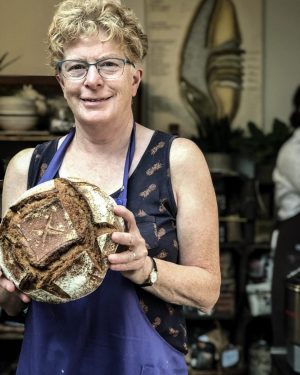 Health and Safety
Health and Safety
When you arrive you will be asked to put your personal belongings on the pegs in the bathroom or at the top of the stairs. The School is a relaxed space for baking and learning. As a small business however, we have to have health and safety procedures so we have an office where all bags, coats, hats and personal belongings need to be stored out of the way.
All students are required to wear an apron and have no rings on their hands unless a simple wedding band.
Whilst baking please have your hair tied back.
We have a separate hand basin for hand washing. This is NOT for washing utensils.
NO personal belongings, clothing or bag in the school except your phone or medicine, please.
Over the years I have noticed that accidents tend to happen when things get cluttered. We have to clear the table several times over the day, and each student has an apple crate as a locker, and is responsible for making sure that their utensils, cup and bowls are washed and put away whilst baking and when finished with.
You will need to keep your working area clear and it is requested that you tuck in stools under the table when baking as people can trip over them.
On arrival for the week-long course, we are all allocated one small job to make sure that the bakery stays ship-shape throughout the day. It is very calm and comfortable, so we ask that students make themselves at home, but also be mindful of the working space being a safe environment.
Vanessa is St Johns Ambulance advanced first aid trained.
Is there any continued support when I get home?
Yes! We offer continued support and encourage students to share their experiences through the WhatsApp group.
In addition, once you sign up for a course you will be given 12 months membership of The Sourdough Club. This gives you access to Vanessa's notes and teaching. Sign up for the club using the code sent to you in your booking acknowledgement email.
Research
We have several researchers that work for the School and the papers are available on request. All the studies though, are listed and reference and summarised on the sourdough club pages.
Expectations
"What can you expect when you come to a course?
You can expect a warm welcome and to work hard and learn a lot. It's fun, and small groups make friends. However, it is a big commitment both financially and in terms of time, so it's important for you to research your week thoroughly. We are always happy to answer questions, but there are a few things we can share to fill in any gaps.
What do we expect from you?
We hope for lovely people who want to learn everything we can teach you about sourdough. We need you to be punctual, well prepared, with long hair tied back, short fingernails, wearing a full apron and raring to go.
We also expect our students to continue their baking when they get home, which is why we have The Sourdough Club and provide feedback and support long after the course has finished.
What should you expect from a course?
While the teaching will centre on every aspect of sourdough bread, there will still be time to savour your bread, relax, breathe deeply and just lose yourself in long, slow fermentation and in the beauty of winter in our rural Northamptonshire setting. We will try to incorporate a walk into each day's schedule, weather permitting.
You will have some free time in the evenings, and there is the opportunity to walk, cycle, visit the local pubs, or pop into the local cheese mongers and bakery, and we arrange a visit to the local vineyard. The course aims to give you the confidence and know-how to bake your own homemade, artisan, sourdough loaves. It will be a fun week full of information, demonstrations, and baking. All participants will receive a certificate of attendance. Once you have booked, a full schedule will be sent to you.
Will you make the perfect loaf?
Probably not.
Something to bear in mind: It took many years to master sourdough. It is an art, and sourdough is wild. Fermentation is unpredictable at times, and many students often arrive with very high expectations. Often, people show me loaves they want to make by bakers who have baked over 500,000 loaves. Yes, they are amazing. However, it takes years to really master sourdough. It is like learning to play a musical instrument, and although you will attend a course for a few days or even a week, it takes most bakers a three-year apprenticeship to learn to bake sourdough, and even now, 35 years on, I am still learning every time I bake.
Be ready to learn. Sometimes things don’t always go according to plan... although mostly they do; it is somewhat ironic, but we learn more from our mistakes than we do from our successes.
What you will learn here is not just to follow a recipe; you will learn core principles and to trust your senses, to have an understanding and a sense of rhythm, timing, and connection to the dough and the process of making bread. You will make great bread and learn everything you need to know to be in a position to practice with knowledge.
Then it is up to you to bake. Over and over again.
That is the joy - the journey
Is there anywhere to park?

 Please do not park in the driveway. Access to The School is needed at all times, and for health and safety, we require that the drive is clear of visitors' cars.
Please do not park in the driveway. Access to The School is needed at all times, and for health and safety, we require that the drive is clear of visitors' cars.
There is lots of free parking nearby as we are in a small rural village in a residential area. You can park all day for free.
Consideration
We have several neighbours who require the pavements to be clear for wheelchair access. Unfortunately in the past, we have had several students park inconsiderately which caused upset to both my neighbours and my students, who have had to leave during the class to re-park their cars. Please do park considerately.
Where is best to park?
Occasionally you find spaces on the opposite side of the road to the school, but I will warn you that there have been a few instances of wing mirrors being knocked off as people drive too fast around the corner, so I suggest parking by the Church. It is a 1-minute walk to The School.
You can also park on the High Street before you reach the Griffin Pub and walk about 50 yards down and round the corner to us.
Does Vanessa teach abroad?
At the moment Vanessa teaches exclusively at The Sourdough School. There are many reasons for this. At the school we have everything set up to deliver the level and standard of courses that are expected. The classroom space we use has been specially designed to accommodate our students and allow Vanessa to teach in a comfortable and welcoming environment.
Having lived in the area for many years, Vanessa has long established connections with the local farmers and producers. This is reflected in the samples that she gives to students on the course, and the incredible lunches provided, which are made with locally sourced food (some of it from Vanessa’s own garden). The school is also certified organic. So everything that we use here has been selected very carefully to be a part of the teaching experience.
And, of course, Vanessa is a mother to three children and a wife. Teaching from her home give her the flexibility to fit the work she loves around her family life.
Vanessa does occasionally speak at international conferences on the subject of nutrition and digestibility. If you would like to discuss the possibility of Vanessa speaking at an event, please get in contact via the school's commercial director ([email protected]) to check availability and costs. It’s also important to remember that when asking Vanessa to attend you will need to be able to cover flights, accommodation, transport and a speaker’s fee.
Do you post your book internationally?
Yes, we can send The Sourdough School book to international students. Our online shop is managed by the lovely people at Bakery Bits who are all set up to send products around the world.
If you are ordering from overseas, please ensure you provide a contact telephone number because this is required by the delivery companies.
Can you recommend somewhere to eat in the evening?
You will be quite tired and sometimes quite full a the end of each day, and you are most welcome to take home some of the leftovers from lunch, however it is also lovely to go out in the evening, and there are lots of amazing places to eat. And because they are so good, we would always suggest that you book in advance to avoid disappointment.
These are some of our favourites –
The Althorp Coaching Inn, Great Brington
With oak beams, flagstone floors and a roaring log fire, The Althorp Coaching Inn is all you would expect from a traditional village pub. This 16th century coaching inn, just 7 miles from the school, is a listed stone and thatch building. It has a courtyard, an enclosed garden and a beautiful, vintage-style barn. The inn specialises in quality British food, real ales and fine wines. The menu ranges from bar meals to classic restaurant dishes, made from locally sourced ingredients wherever possible.
Website: http://www.althorp-coaching-inn.co.uk/
Phone: 01604 770651
Facebook: https://www.facebook.com/althorpcoachinginnfoxandhounds
Twitter: https://twitter.com/AlthorpInn
The Griffin Inn, Pitsford
The Griffin Inn is a proper village pub, and at the centre of our village community. A selection of local ales are served along-side delicious home-cooked pub favorites – they have a steak menu, chef’s specials boards, light lunch options, and then there’s the chef’s legendary traditional Sunday roast.
Website: http://griffinpitsford.co.uk/
Phone: 01604 880346
Facebook: https://www.facebook.com/PitsfordNorthampton
The White Horse at Old
Travel past Pitsford Water from the Sourdough School and you will arrive in Old, a small village with The White Horse at the centre. The seasonal menu offers a range of delicious dishes, with daily specials and plenty of choice for vegetarians. There are also artisan pizzas, baked in an outdoor wood-fired oven. Many of the dishes can be served in child sized portions for younger diners. The pub stocks a good range of craft beers and heritage ciders too. Check their website for details of the monthly quiz nights and live music.
Website: http://www.whitehorseold.co.uk/
Email: [email protected]
Phone: 01604 781297
Facebook: https://www.facebook.com/whitehorseold/
The Red Lion, Main Street, East Haddon
A cosy thatched pub in a peaceful, idyllic village surrounded by picturesque Northamptonshire countryside. The Red Lion specialises in serving great British food, cooked using local seasonal produce. The pub has an intimate lounge, a large dining room and manicured gardens, and is just 6 miles from The Sourdough School.
Website: https://www.redlioneasthaddon.co.uk/
Email: [email protected]
Phone: 01604 770223
Facebook: https://www.facebook.com/The-Red-Lion-East-Haddon-148874411832224/
The Artichoke, Church Street, Moulton
The Artichoke is one of the closest pubs to the school. It specialises in food cooked using quality, local ingredients. Their meat is sourced from the local butcher’s, sausages from Mike’s pigs of Moulton, and the vegetables are delivered daily. This Grade II listed building dates back to 1680 and the owners think it was originally a farmhouse and village inn. It has a lovey, private and dog-friendly garden with plenty of seating for guests. There is regular live entertainment, including quizzes, jazz nights and fold nights.
Website: http://www.artichokemoulton.co.uk/
Email: [email protected]
Phone: 01604 643941
Can I be a case Study?
Next year ( 2024) I'll be beginning the 2nd phase of research and there is another exciting project here at The Sourdough School which I hope will result in more case studies.
I will be starting the second phase of my Masters in Research I hope to have finished my PhD in Nutrition & digestion of Bread. This is research, in the form of dietary intervention studies, will contribute significantly to the growing discussion about how the Protocol of Baking as Lifestyle Medicine has a significant effect on microbial population, diversity and supporting a healthy gut micobiome, as well as a positive impact on mental health.
How does it work?
It is two parts. You get a home study pack delivered directly to your door, with everything you need in the pack and you follow the step by step online tutorials online.
Each group be asked to bake a specific delicious and nutritious sourdough bread at home for an allocated length of time and you will be the first to find out the results of your gut microbial analysis, any changes and the implications.
Why do we have to pay to participate?
This is still part of the way I teach and is still a course, and delivered in the same way as the ones we teach normally. This is just a very special course, that becomes part of a research study. The tests themselves are very expensive, although they are totally FREE to the participants, we feel that a mutual commitment is needed, and this is quite a commitment, involving baking and bread over several months.
- What is in it for me?
- You will learn to make a specific bread that will have all the techniques needed to make amazing sourdough and learn to bake as Lifestyle medicine
- You will have the results and feedback of your gut microbial composition and find out how it is affected by eating sourdough.
- You will be participating in research that will change the way we understand bread and the way we eat it on our health. It's cutting edge research into one of our most important foods.
- We will share our knowledge in terms that can be understood by everyone.
Will I be named?
- Everyone's results will be confidential and you will be given a number, rather than be identified by name. However you can enjoy participating in the discussion of the study on social media. It is not a secret, but we are obliged to keep individuals makes and results anonymous. You of course can share your participation - that is up to you.
- There are a limited number of places to participate in The Masters in Research course, and anticipate initially that each group with have between 20 - 30 participants.
- Each student will need to agree to give basic health details (weight, blood pressure, etc.) about themselves and send in samples regularly for a gut microbe analysis . The fruit project will be looking at comparing the gut microbiome before and after baking and eating sourdough.
If you’re interested in joining this course, please sign up to our newsletter as we will be sending out the opportunity to participate in this research next term. ( Autumn Winder 2024)
Will there be any more Sourdough Sisters?
Our intention is to run Sourdough Sisters as an annual event. The applications for next year will open in early 2019, and the course will run in summer 2019. Unfortunately, we are not able to run these courses abroad. Vanessa teaches exclusively at The Sourdough School, because this is where all her resources are, and where her organic certification and insurance are valid.
Should you wish to apply for the next Sourdough Sisters please sign up for our newsletter and we will send more information as soon as it is available.
Do I have a gluten allergy?
I’m often contacted by people looking for advice about gluten allergies or intolerance.
My first response is always that if you suspect you may have a gluten allergy or may be coeliac, you must see a GP to get a diagnosis.
Although I have spent many years researching the digestibility of sourdough, I am not qualified to diagnose any of the medical conditions which can cause symptoms similar to gluten allergy.
There are numerous reasons why people have digestive malaise when eating bread, but we do know that many people find that they can eat sourdough without any issues.
Gluten intolerances and allergies are widely blamed for symptoms such as bloating, constipation and other digestive discomfort. In some cases rather than gluten, it is a range of naturally occurring sugars (known as FODMAPS) that are the root of the problem. There are also suggestions that the modern, industrial bread making process has led to the rise in people adopting a gluten free diet. Many people find sourdough easier to digest, and that they can eat it without experiencing any discomfort.
Coeliac disease
One of the most debilitating conditions associated with wheat is coeliac disease, an auto-immune condition triggered by gliadin, a component of gluten. Although there is some initial evidence suggesting that sourdough might be suitable for coeliacs to eat, this evidence was a small trial and gathered under medical supervision, which is very different from buying a lao from a bakery or baking your own. I do not recommend people with coeliac disease to eat sourdough, because it’s not possible to guarantee that the gluten is broken down sufficiently to that loaf is free from raw flour, which may be on the outside of the loaf and may trigger a reaction. There are gluten free sourdough's made with rice flour or potato flour, but this is not an area I work in at present. We do not teach anyone who is coeliac to make sourdough.
If you want to come to come on one of our courses, but think you may have a gluten allergy, please talk with your doctor first. You will get much more from the course if you have a diagnosis. Different conditions can be approached in different ways, and I can teach you the best fermentation technique and recommend the best flour choice for your specific condition.
The most important thing is to address the issue of a potential allergy or other medical condition before you book a course. Allergic reactions are very rare, but can be serious. If you have an immune response that comes to light during the course, we will ask you to seek advice from a doctor before you can continue.
You might find this podcast with Vanessa and Time Spector interesting.
Which flours do you recommend?
I have written an article which looks at the choice of flour for sourdough baking. In it I talk about how grain variety, grain quality, and milling all affect the properties of a flour.
We regularly use flour from Marriages, Doves Farm and Gilchesters Organics here at the school. Each of these mills offers a range of flours suitable for bread baking. You can buy them through DeliverDeli, and some of these flours are available in supermarkets and independent grocery stores. We also recommend using Strong Organic White Bread Flour from Marriages flour for refreshing a white sourdough starter… in fact, we provide a bag of this flour as part of our White Sourdough Starter Kit.
The important thing to remember in choosing a flour is to take time to become familiar with it. Bake regularly with the same flour and keep records of your bakes. This way you will soon learn how best to use each flour and which ones suit your baking style.
Do you offer work experience?
We often get asked if we are able to offer work experience here at The Sourdough School.
Unfortunately in the main we have to say no. We’re a small school, and because of fire regulations are only able to have a limited number of people in the kitchen at any one time. The classes we run are almost always fully booked which means, once you add in the tutors, we are at capacity. Of course, we very much welcome people coming here to learn to make sourdough, but I’m afraid we really do have to limit it to students who book on a course.
Saying that, we occasionally have students back who have previously been students, and I began my baking career volunteering in a small French bakery. So I would advise anyone looking for work experience that it’s definitely worth persevering. One of my recommendations for people who want work experience in baking sourdough is to ask at your local bakery – there’s often much more practice to be had in a bakery where they are making hundreds of loaves every day. Just keep asking… that’s how I got my first work experience. Having started my baking career with work experience, I would really encourage anyone to do this. But unfortunately we just cannot accommodate volunteers here.
How do I subscribe to The Sourdough School newsletter?
Our newsletter is a great way to find out about the latest happenings and offers at The Sourdough School, and is packed with recipes and baking tips. It’s also the best way to find out about new courses as soon as they are opened for booking.
You can add your email in the ‘Subscribe Here’ page. Simply enter your email address, click the button and you’re subscribed, and you will the first to know about what we are up to.
Do you offer online courses?
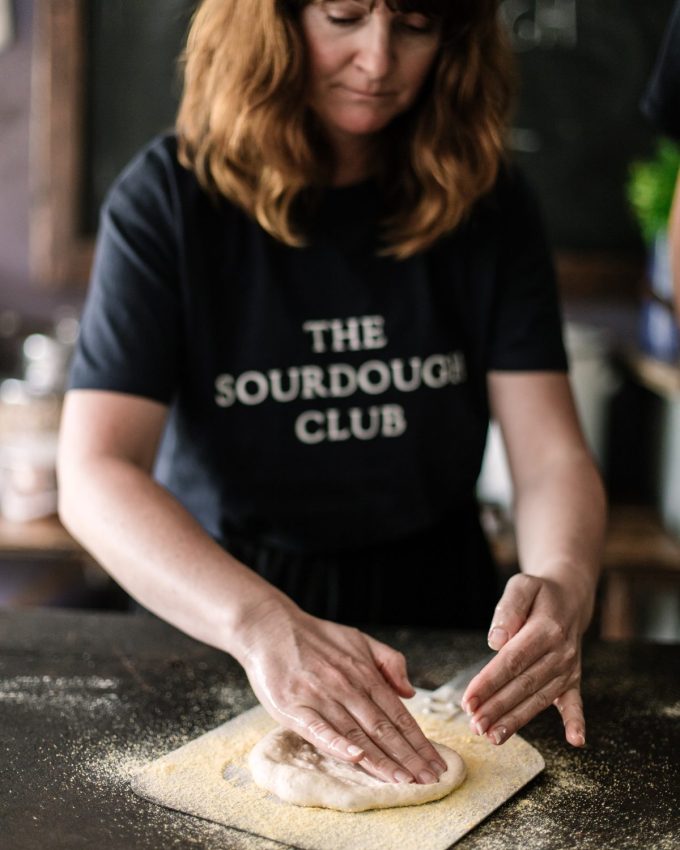 At The Sourdough School, both The Certificate and the Diploma are online courses. However, for domestic bakers, we suggest The Sourdough Club, which is designed to provide an ongoing learning experience and support for domestic bakers who want to master the art of sourdough baking at home. The Sourdough Club is a comprehensive resource that enables members to expand their skills and knowledge in the world of sourdough, and we teach all the BALM protocol here.
At The Sourdough School, both The Certificate and the Diploma are online courses. However, for domestic bakers, we suggest The Sourdough Club, which is designed to provide an ongoing learning experience and support for domestic bakers who want to master the art of sourdough baking at home. The Sourdough Club is a comprehensive resource that enables members to expand their skills and knowledge in the world of sourdough, and we teach all the BALM protocol here.
Some of the key benefits of joining the Sourdough Club for a home baker include:
- Continuous learning: As a member, you will have access to a wealth of information, including tutorials, articles, and research studies. This allows you to deepen your understanding of sourdough and its associated techniques.
- Access to recipes: The Sourdough Club offers an extensive collection of recipes for various types of bread, pastries, and other baked goods. Members can experiment with new recipes and learn to incorporate sourdough into their daily meals.
- Supportive community: The Sourdough Club connects you with a community of like-minded bakers and enthusiasts. Through forums and group discussions, you can share your experiences, ask questions, and learn from others.
- Expert guidance: Members have the opportunity to interact with Vanessa and other sourdough experts through scheduled live sessions. These sessions provide a platform for direct communication, addressing questions or concerns related to sourdough baking.
By joining the Sourdough Club, home bakers can transform their passion for baking into a lifelong pursuit, continually expanding their knowledge and skills in the fascinating world of sourdough.
here.
Can I buy sourdough starter?
You can buy some of the sourdough starters we use here at the school through our online shop. We recommend the White Sourdough Starter Kit, which contains all the information you need to keep your new starter active and healthy.
The sourdough starter is carefully nurtured here at The Sourdough School, and we make sure it is sent out in peak condition. Starters are sent out twice a month and advised that they should be refreshed as soon as they arrive.
Where can I get your Sourdough School book?
You can order a signed copy of the Sourdough School book through our online shop.
The book is also available through Amazon, Waterstones, and lots of lovely independent bookshop
Can you sign my book personally for me?
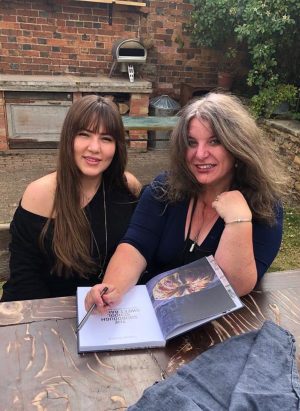
In person Yes, but online We are really sorry, but at this point in time, it just isn’t possible for Vanessa to write a personal dedication when you buy a copy of The Sourdough School book.
However, we are able to post you a signed bookplate, if you send us a self-addressed envelope, we will return a plate for you. Please contact us via the contact form.
Vanessa's work commitments simply don't give her the time to sign, wrap, and take individual books to the post office, but you can buy a signed copy through our online shop.
If you sign up to our mailing list we will let you know when Vanessa is doing a book signing, though.
We are looking into ways to include individual dedications, but for now, the only way Vanessa can sign your book in person is if you book a course.
Is The Sourdough School book available in any other languages?
Yes, the book has been published in German, Italian, Croatian and Spanish. There will be a US edition published in September 2018. For anyone who is struggling to get the book in their language, I’m sure there will be more editions coming out. But for now these are the languages it is available in, generally you will find this on the amazon listing in the country of publication, however you might need to search under the name Vanessa Kimbell as the title will have been translated.
Do I get a certificate when I attend a course?
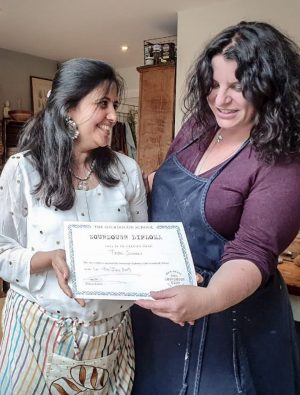 Yes. Each in-person student receives a personalised, signed certificate to confirm they have attended an in-person course at The Sourdough School.
Yes. Each in-person student receives a personalised, signed certificate to confirm they have attended an in-person course at The Sourdough School.
Should students wish, then they are added to our graduation board. We have trained many hundreds of people to bake. However, this is the first year of the board, and we are excited to see people graduating and putting their knowledge to use; please see the early days of our new Graduation Board Once students have demonstrated they understand all the principles that have been taught and are able to apply these in producing a sourdough loaf.
At the end of the in-person course, students complete a worksheet and undergo a practical assessment. This is definitely not an exam! But we do take the certification quite seriously so that each student can celebrate the fact that they have a diploma from The Sourdough School. We are here to guide you through the whole course and ensure that every student leaves the school confident and equipped to bake the most delicious sourdough bread.
At the end of the online courses students have to produce and edible exam. This is an example of a graduation recipe, which is then shared with all student in the school
Are the courses suitable for professional bakers?
We often get asked if our courses are suitable for professional bakers, or if they are designed solely for the home baker. The courses we offer teach the principles of everything you need to know about sourdough, whether you are a domestic or a professional baker. There are, of course, differences between the two - mainly in scheduling and quantities. But the principles and timings that underpin sourdough baking can be applied equally to a home kitchen or commercial bakery, and we find that Baking as Lifestyle e medicine is useful to all.
- For bakers wanting to teach Baking as Lifestyle Medicine we suggest you look at The Certificate here.
- For Healthcare professionals wishing to train in prescribing Baking as Lifestyle Medicine look here
- For Homes bakers who wish to learn how to bake for themselves and their families check out The Sourdough Club Membership here
- For anyone hating to totally emerse themselves in the experience of Baking as Lifestyle Medicine then you can learn more about attending a 7 day retreat + 1 year Certificate here
Vanessa trained and worked in bakeries
Vanessa trained and worked as a professional baker, so she is very conscious of scheduling and timings when working with large quantities. She is more than happy to discuss this as she is teaching. During the course we work with 1kg quantities. These can, of course, easily be scaled up in a professional bakery, because we are working with baker’s percentages and ratios.
So yes, absolutely, the principles we teach at The Sourdough School on Baking as Lifestyle =Medicine are very much applicable to professional bakeries. But please bear in mind that this is classroom-based teaching, and some specific tips and techniques that might be useful in a professional setting will not be demonstrated during the course.
Can you answer some questions I have about my sourdough baking?
Unfortunately Vanessa is not able to answer individual questions that are emailed.
We receive dozens of home bakers looking for advice. Some of these involve very detailed explanations of what they are doing with their starter and their dough. Whilst we appreciate that people want help with their sourdough, we are a small business and simply don’t have the capacity to answer individual questions… there just aren’t enough hours in the day. You can however join The Sourdough Club, where Vanessa teaches live most weeks.
Generally we offer the following advice to those contacting us -
Vanessa’s book, The Sourdough School, is a comprehensive guide to sourdough, based on her years of baking experience. Reading the step by step introduction to sourdough, and working through the recipes will give you lots of baking practice and should help answer many of the question you have.
Consider booking onto one of our 12 month online courses with tuition from Vanessa. There are three courses available, each one suitable for different levels of baking experience. The cost of the course includes a sourdough starter and a ceramic pot to keep it in, 12 months of guided tuition through a wealth of online material, and two skype calls with Vanessa to discuss your progress at key points during the course. These calls are a chance to learn, get lots of baking tips and ask any questions you might have regarding your own sourdough baking.
Do we have international students?
Yes.
Over the years we have welcome students from all over the world to the school. Our diploma courses are especially popular with international students. In the past few years we have had students from Europe, the Middle East, North and South America, Asia, and Australasia. It makes for a wonderful mix of cultures and languages in the kitchen while we bake!
If you are travelling to the school from overseas, there is detailed information on how to get here.
What is the maximum number of students that attend a course?
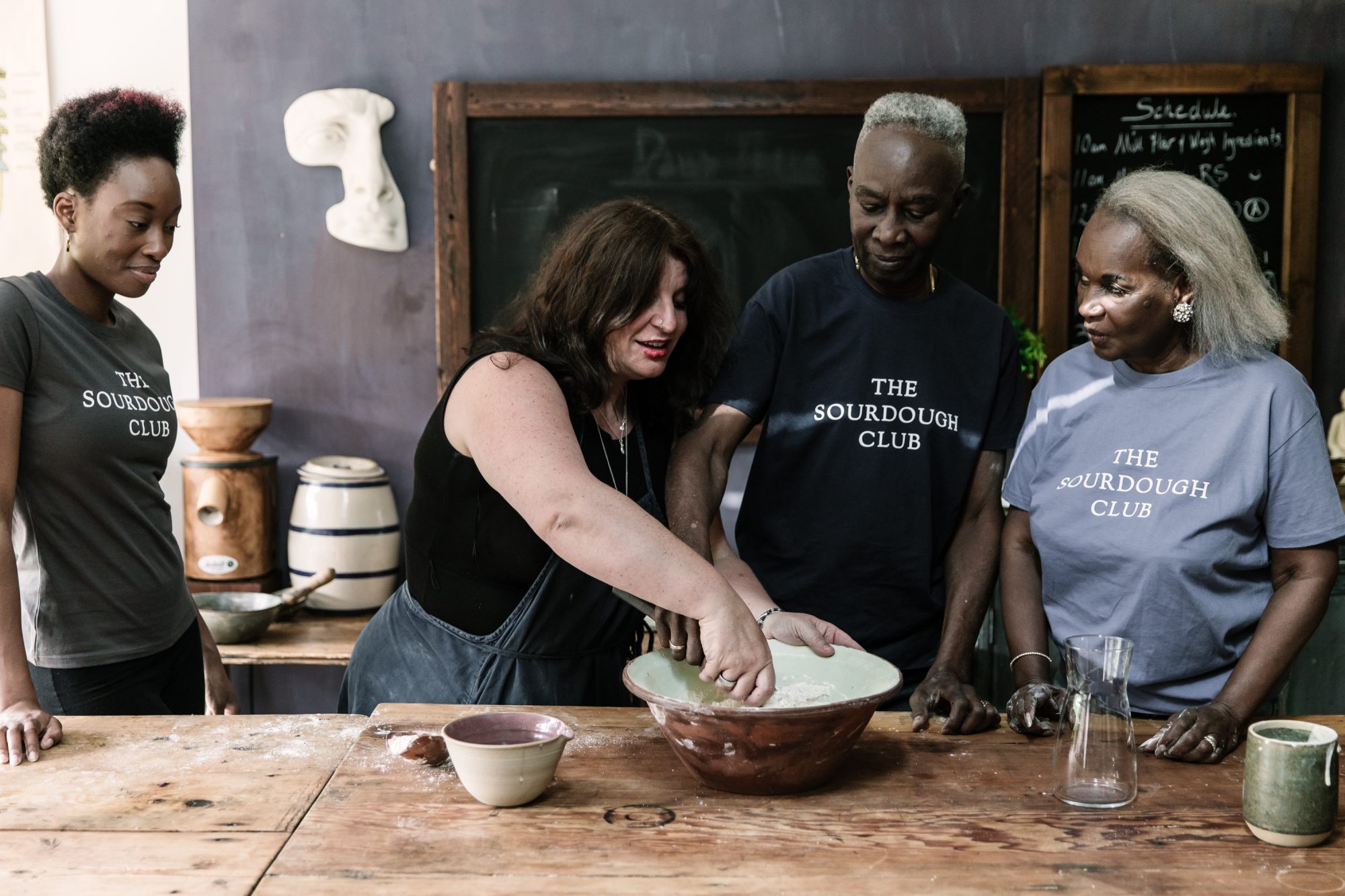
At The Sourdough School, we believe that a small class size is essential for an effective learning experience. Our preferred maximum number of students for most courses is six, especially for Diploma courses. This size strikes the perfect balance between creating a lively atmosphere filled with questions and enthusiasm while ensuring that each student receives the individual attention they may need.
In certain situations, we have taught classes of up to 12 students. The class size depends on factors such as the length of the course, the techniques being taught, and the recipes being used. For more academic courses that focus on demonstration and discussion rather than hands-on learning, we might accommodate up to twelve students. However, even with 12 students, our class size remains small and intimate.
If a course appears as fully booked on our website, we may be able to accommodate an additional student in exceptional circumstances. In such cases, please reach out directly to Vanessa at [email protected], so she can assess whether it is feasible to offer you a place in the course. We prioritize maintaining an optimal learning environment for all our students and strive to accommodate individual needs as much as possible.
Is there a waiting list for the courses?
We limit the number of students on our in-person courses to between 4 and 6.
This is so we can ensure there is time for each student to get some individual attention, and we can tailor the tuition to the interests of a small group. But it does mean that some classes get booked up very quickly, and not everyone can get a place on the course they want. We do keep a waiting list for courses once they are fully booked but, to be honest, we find that students rarely drop out once they have booked.
If you have tried to book a particular course but have found that it is already full, there are a number of options you might like to consider…
Firstly, you can add your name to the waiting list by emailing [email protected], stating your name and the course you are interested in.
Alternatively, you might like to join The Sourdough Club. This gives you access to step-by-step lessons, including videos, and a lot of sourdough-related information. Membership of The Sourdough Club brings you into our international community of sourdough bakers, and allows you to learn in your own kitchen at a pace that suits you.
What is included in a Course?
What is included:
All food and drinks whilst at the school are provided. We will be eating sourdough, local cheeses and simple, delicious homemade food for lunch, and enjoying a glass of award-winning wine from the local vineyard or our own sourdough beer.
You will only need to bring a few essentials, your favourite apron, a large basket to take your bread, your bakes, and several other bits and pieces home with you, 3 x 200g Tupperware containers with lids to take jam, cultured butter and pickles home (please ensure they are sterile and odourless) and a small plastic bottle (an empty water bottle is good) to take syrups home.
International students, please allow space in your luggage to take many items back with you.
Retreat students you need to bring a swimming costume, and pair of trainers or shoes to walk in, something warm to wear and a flask – we will fill it with hot tea. If you want to cycle then please bring something appropriate to wear – the route is some tarmac and a well-used track, but it can be muddy in places.
Please note that we are also mindful that some people want to avoid alcohol, and we have a separate table available, that is still very sociable to eat at.
What is not included:
Students are responsible for:
- Travel
- Accommodation
- Transport to and from the School.
- You will need to arrange for your own breakfast and evening meals.
Why we created the awards.
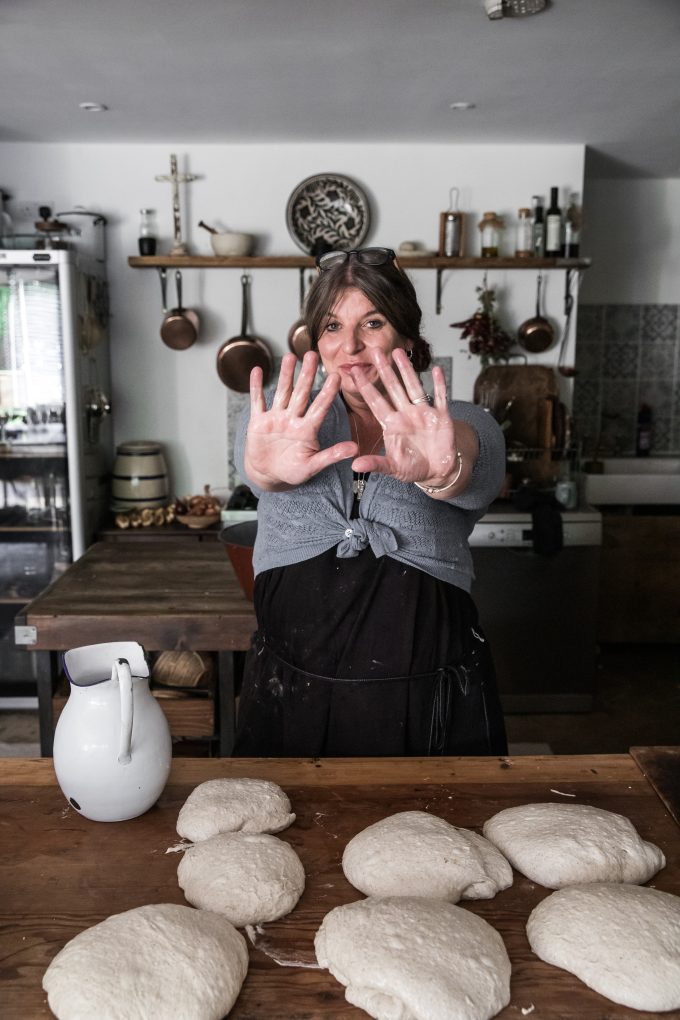
The Awards are designed to help people who want to be part of the change join our systems change programme. The course is a 2-year programme, and we recognise that it's an expensive commitment. We understand that some of the people best placed to make a difference may not be able to afford the fees. We didn't want this to be a barrier to entry, so Vanessa created a self-funding systems change programme. This innovative approach provides farmers with support, bakers with amazing flour, and customers with gut-nourishing, phenomenal bread. Our Botanical Blend Flour is specifically designed to support gut health, promoting overall wellbeing through the bread it produces. The educational programme allows us to share knowledge where people can make the most difference, emphasising the connection between good bread and health. From this, we created the Awards to make our systems change programme affordable for people who want to join but need some financial help to be able to participate, all while promoting healthier communities through better bread.
A lifetime of understanding
I have always known that the food industry creates refined food that is more addictive than cocaine. Ultra Processed food manufacturers make foods, and baked goods specifically with bliss points to be so irresistible that it has hijacked our brain chemistry, often advertised to the poorest people and minorities.
Thirty years ago, in 1992, two events happened in the same week. I ate my very first Green and Blacks chocolate bar. I savoured and celebrated each piece of a farmer cooperative fairly produced chocolate. The same week I was part of a group helping to collect and analyse data in the psychology department for one of the largest food and beverage groups in the world. Our work was on decision-making at the point of sale. The purpose of the study was to provide evidence of how to manipulate human stress responses to elicit a favourable response to maximise profit. We ran focus groups and product tests to determine the most favourable outcomes. Witnessing first-hand the extensive research on how to influence free will was chilling and gave me a unique insight into how the global food giants were consciously subverting public health.
As I learned more, I realised that we are starving and harming the microbes in our guts that produce the metabolites that our brains and bodies need to function. This isn't just food injustice. This is slow-motion genocide, as our food system is also one of the main drivers of climate change.
I believe we can revers this, but only if we have a framework, to use as a game plan and an army of individuals who are prepared to standup for health as a basic human right. If you are one of these people then you have come to the right place.
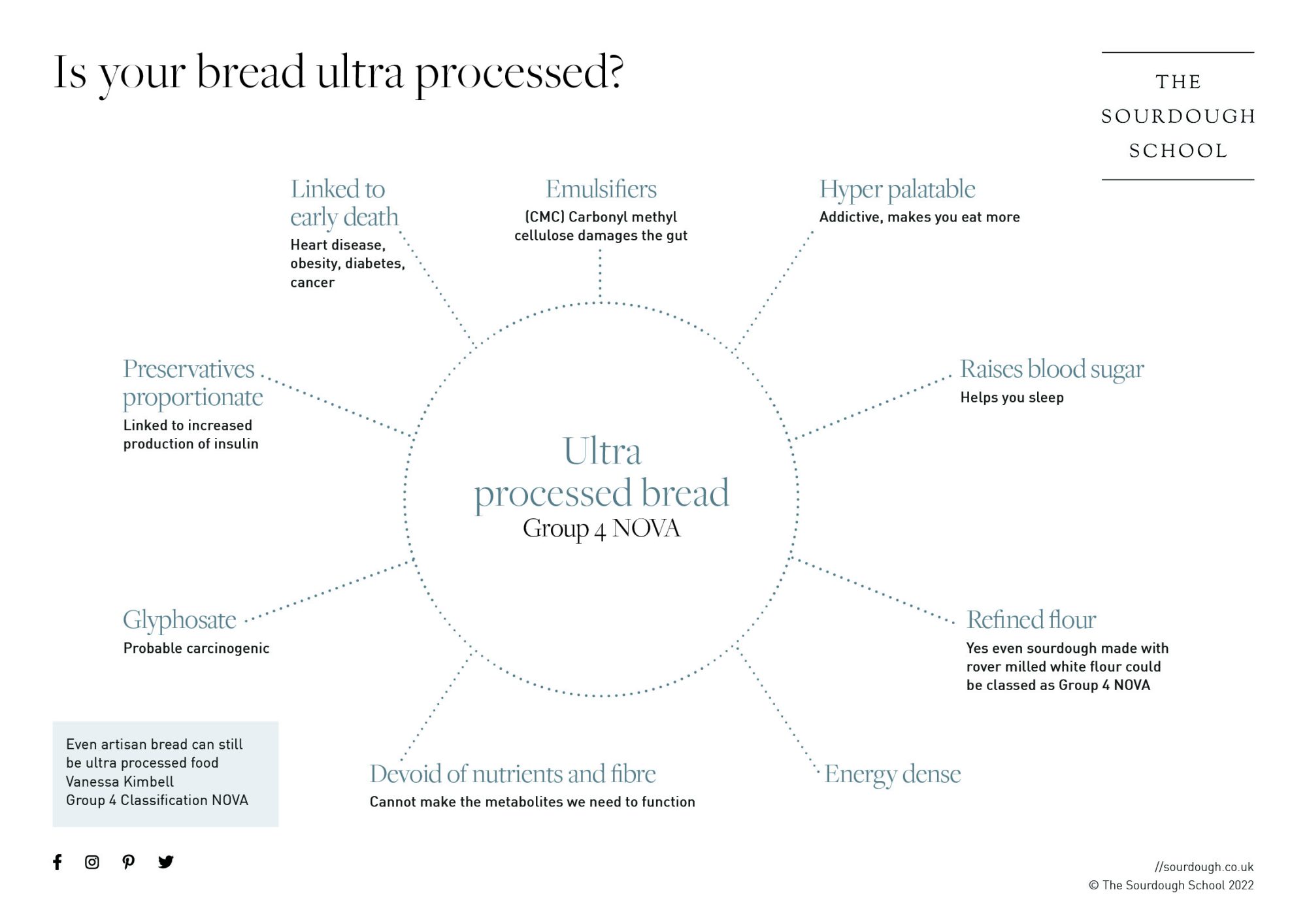
Where do I sign up?
Click here to see a full list of courses, dates and options.
What if I need to cancel?
We understand that life is unpredictable, and circumstances can change unexpectedly. Your participation in our research studies is voluntary, and you have the right to withdraw at any time, for any reason, without any consequences.
That being said, we do incur significant costs for the tests and equipment provided to each participant. If you decide to withdraw and have unused and unopened test kits, we would be grateful if you could return them to us. This allows us to utilize these resources for other participants or future studies.
Regardless of your decision to continue or withdraw, we are grateful for your initial willingness to contribute to our research. In recognition of this, you will be able to keep the flour we have provided, and we will maintain your student access to the school pages for the remaining time.
We value every individual's involvement in our studies and understand that each person's journey is unique. Whatever your decision may be, we respect it fully and are here to support you.
Can I talk about this on social media?
We highly encourage participants to engage in dialogue about their experiences and share their baking journey with us. Social media platforms provide an excellent way for you to do this. Using the hashtags #sourdoughresearch and #sourdoughschool, you can easily connect with fellow participants, our research team, and the broader community interested in our work.
You can find us on Twitter and Instagram under the handle @sourdoughschool. We love seeing your posts about the bread you're baking, the progress you're making, and any exciting observations or insights you might have during the course of the study.
Your experiences and insights can help enrich our research and inspire and educate others. We look forward to your contributions and engaging with you on these platforms.
What if there are concerns about my results?
Participant safety and wellbeing are our utmost priorities during our research studies. If we have any concerns about your test results, our dedicated in-house medical team will be immediately involved.
Dr. Amrita Vijay, a specialist in gut microbial analysis, and our private in-house General Practitioner (GP) will thoroughly review any test results that may raise concerns. If they identify anything that needs further medical attention, we will bring this to your notice promptly.
We would then recommend you to take these findings to your own GP for further investigation. It's essential to note that while our team is highly skilled and knowledgeable, our research study isn't a replacement for your ongoing medical care.
Our aim is to work hand in hand with your own healthcare providers to ensure your continued health and wellbeing. We appreciate your trust in us and are committed to maintaining transparency and open communication throughout the research process.
When do I get my results back?
Your participation in our research studies at The Sourdough School involves a complex process that includes collecting samples, conducting laboratory tests, and analyzing the results. This process often takes several weeks as we aim to ensure accuracy and rigor in our analysis.
Once we receive the results from the lab, our team needs time to interpret and understand the data. We understand your eagerness to know the results, and we assure you we will work diligently to provide you with a comprehensive and understandable analysis of the findings.
While we can't provide a specific date for when you will receive your results due to these variables, we promise to share them with you within one month of receiving them ourselves. We greatly appreciate your patience and understanding during this period, and we are committed to keeping you informed throughout this process. Your involvement in this research is of great value, and we are grateful for your commitment to improving our collective understanding of health and nutrition.
Do I need to pay for the tests?
As a participant in our research study at The Sourdough School, it's important for you to know that we have secured complete funding for all tests that are a part of our research protocols. These may include tests related to metabolism, the gut microbiome, blood sugar response, and short-chain fatty acids, among others.
On occasion, we may ask participants to collaborate with their General Practitioner (GP) to gather baseline data such as height, weight, blood pressure, or cholesterol levels. However, if this is not possible or convenient for you, or if there are additional tests required as part of the study, we will cover the cost of these tests.
Our commitment to fully funding all necessary tests is part of our dedication to ensuring our research is accessible and straightforward for all participants. It's a critical aspect of our mission to conduct comprehensive and inclusive research that contributes to our understanding of the health impacts of sourdough bread and broader aspects of nutritional health.
Is my participation anonymous?
Yes.
We will not share your individual results with anyone. You will be allocated a number. However we hope to engage within the sourdough class, and with the group of 20 students. We also often interact with the wider community in the discussion about the impact of sourdough on heath, so it would be amazing if you would be happy to discuss this with other people, but of course we respect that not everyone is happy to do this.
Will I get feedback about my results?
Yes. You will be sent your results, but we will also set aside a day when we will open the School to all participants who wish to discuss the results with our team. Dr Amrita Vijay, myself, our in-house GP and Jackie Lynch our in-house nutritional specialist, will be available at the school to discuss individual results. This will take place in 2020 once the data has been collated and analysed, giving you the chance to ask questions beyond the scope of the results.
Will I need to buy any equipment?
Participating in our research study requires some basic kitchen equipment which, in most cases, you'll likely already have if your kitchen is well-equipped. This includes items such as mixing bowls, a kitchen scale, a dough scraper, and an oven.
However, please rest assured that any specific equipment required for the course or the research study, which you may not already own, will be provided by us. This is part of our commitment to ensuring that all participants are fully equipped to participate in the study without incurring any extra personal expense.
Our goal is to facilitate your participation and make the process as seamless as possible, allowing you to focus on the process of baking and the study itself. We are here to provide any necessary support and answer any questions you may have throughout the study.
Are there any restrictions?
Yes, there are certain medial conditions that will preclude people taking part. In the main it is use of antibiotics that might alter the results, or certain digestive issues. So yes there will be some rules for attending the course so please bear in mind that even if you book the course then you will need to fit the criteria to participate. We reserve the right to refund applicants who are not suitable.
You must be willing to commit to the trial and consent to your medical details and analysis being recorded for the purposes of the study.
Is there any back up for learning to make the sourdough?
Yes. We will give you a year membership to the sourdough school student pages for Free ( This is usually £250 ) will be after-course support from the school, a year’s access to the course support material on the student pages, and access to our research database with information from over 300 studies, if you are interested in reading more. After 6 –8 weeks of eating sourdough we will contact each student to check on their health and to carry out a second gut microbiome analysis test.
Will I need to buy flour?
If you decide to participate in our research at The Sourdough School, we will cover all associated costs to ensure that there are no financial barriers to your participation. This includes the provision of all necessary baking ingredients and equipment.
Specifically, we will provide all the flour and sourdough starters you need to participate in any study, which will be handed over to you during the course at our school or posted to you. The total amount of flour can be up to 10 kg. Given this substantial amount, we ask that you ensure you have sufficient capacity to transport it home. If you are travelling to us by plane or train, you might want to consider bringing an empty suitcase for this purpose - or arrange postage with us before you attend.
If the study requires your attendance at the school, we will also cover your travel costs. Our commitment is to make your involvement in the study as convenient and seamless as possible, allowing you to focus on the fascinating process of baking and learning more about sourdough bread.
Please note that your participation in the study is entirely voluntary, and you are free to withdraw at any point should you choose to do so. We are here to provide any necessary support and answer any questions you may have throughout the study.
Do I need to know how to make sourdough?
Taking part in a Baking as Lifestyle Medicine (BALM) protocol study at The Sourdough School does not require you to have any pre-existing baking skills. Our objective is to research the potential impacts of sourdough bread on health, and your role as a participant is to provide valuable data for this investigation.
To enable this, we provide all the knowledge, recipes, and teaching lessons necessary to carry out any baking that may be required as part of the study. Our expert team will guide you through the process, offering step-by-step instructions and continuous support to ensure that you can successfully bake sourdough bread at home.
Alternatively, some studies just require eating, so for these, we provide the option of supplying the sourdough bread ready-made. This flexibility allows for a wide range of participants and ensures the study remains accessible to all, regardless of baking experience or availability of time.
In both scenarios, our priority is ensuring that you're comfortable with the process and fully supported throughout the study, as your participation is key to expanding our understanding of the relationship between bread, digestion, and overall health.
Why must I stop eating sourdough before I participate?
Although this might sound strange asking you not to eat sourdough, we need to start from a non-sourdough baseline to see the change once we introduce the fermentation. This will allow us to make comparisons before and after baking and eating sourdough. We are looking to see if there are any significant changes in the microbes found by comparing the results.
How does Gut Microbiome testing work? What will I have to do?
- Sourdough Abstinence: To provide a clean baseline for our study, we generally ask that participants avoid consuming sourdough for 6 to 8 weeks prior to the start of the study. This ensures that any changes we observe during the study can be attributed to the sourdough you'll be baking and eating during the study period.
- Gut Microbiome Test: Before the study begins, you'll need to have your gut microbiome tested. This involves providing a stool sample, which will be analyzed to identify and quantify the types of bacteria and other microorganisms present in your gut.
- Bake and Eat Sourdough: During the study, you'll bake sourdough using the ingredients we provide, and eat this bread daily for a specified period. This will allow us to study the effects of regular sourdough consumption on your health and gut microbiome.
- Re-test Gut Microbiome: After the sourdough consumption period, you'll have your gut microbiome tested again. This will allow us to see what changes, if any, have occurred as a result of the dietary intervention.
- Keep a Food Diary: Throughout the study, we ask that you keep a diary of what you eat. This helps us understand how other aspects of your diet might be interacting with the sourdough intervention.
- Avoid Antibiotics: Unless absolutely necessary for your health, we ask that you avoid taking antibiotics during the study, as these can significantly alter the gut microbiome. If you must take antibiotics, please inform us.
- Feedback and Sharing Results: After the study, we invite you to return for a results day, where you can ask any questions and receive your personal feedback. We may also ask if you're comfortable sharing your results as part of our teaching syllabus. This helps future students learn from real-world examples. However, this is entirely voluntary, and you can choose not to share your results if you prefer.
Remember, your comfort and consent are paramount throughout this process, and you always have the right to withdraw from the study at any time.
Am I automatically part of the study if I apply?
We have a limited number of places, due to funding restrictions and there are certain medical conditions, which may affect the results, so we will need to select based on the criteria for the study to be valid. However we will be running various studies that you can volunteer for and if you want to hear more about them please register here.
Why is the composition of my gut microbiome so important?
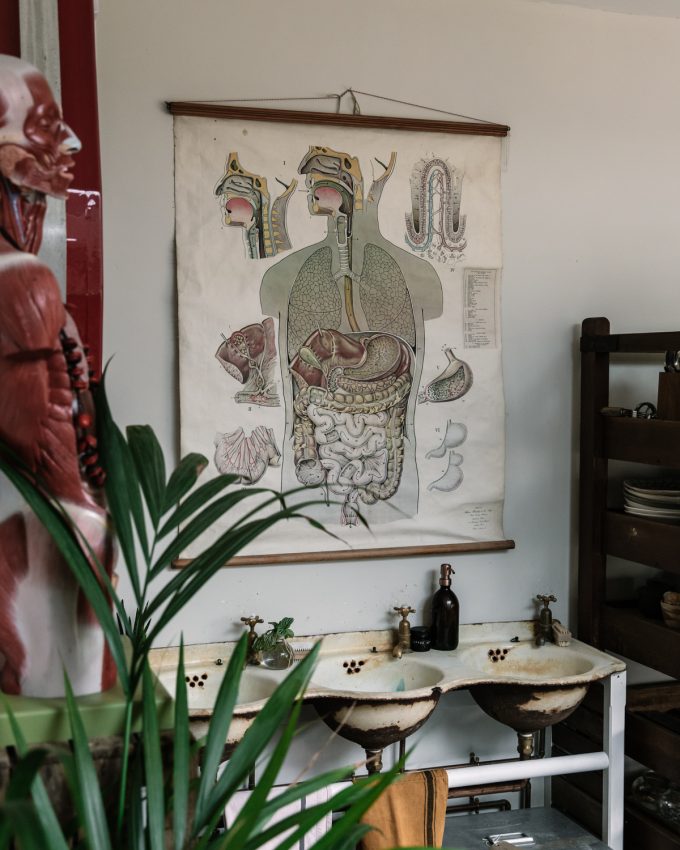 In recent years, burgeoning interest has been directed towards understanding the gut microbiome and its profound influence on our overall health. This intricate ecosystem, comprising around 100 trillion bacteria, fungi, viruses, and protozoans within our digestive system, is emerging as a critical determinant of health and disease.
In recent years, burgeoning interest has been directed towards understanding the gut microbiome and its profound influence on our overall health. This intricate ecosystem, comprising around 100 trillion bacteria, fungi, viruses, and protozoans within our digestive system, is emerging as a critical determinant of health and disease.
Though the field of gut microbiome research is still young, it's clear that our relationship with these microbes is fundamentally symbiotic. They contribute significantly to our health by aiding digestion, bolstering immunity, synthesizing vitamins like vitamin K and B12, and even impacting our mental wellbeing. These microbes communicate with our brain through pathways such as the vagus nerve, possibly affecting our mood, appetite, and anxiety levels.
Evidence suggests that an imbalanced gut microbiome, often referred to as 'dysbiosis', is linked with several diseases, including autoimmune disorders, multiple sclerosis, and Parkinson's disease. The gut microbiome's composition appears to be shaped by various factors such as our initial microbial seeding at birth, diet, lifestyle, medication use, and environmental exposures.
As a researcher and baker with a keen interest in the microbiome's role in digestion, Vanessa has become particularly interested in the potential benefits of long, slow-fermented sourdough bread on the gut microbiome. This interest springs from numerous laboratory studies and experiments conducted on laboratory animals, suggesting that diet plays a crucial role in shaping the gut microbiome. Although there is no definitive evidence yet that sourdough specifically affects the gut microbiome positively, the convergence of existing research hints towards this possibility. Therefore, we continue to study and explore this fascinating aspect of health and nutrition.
Why might you need to test my gut microbiome?
The results from your individual microbial analysis will form the basis of a study into the effect of sourdough on the human gut microbiome, and the results will contribute to the growing discussion of how sourdough is integral to good health, and specifically to gut health.
Why we test the gut microbiome?
The results from your individual microbial analysis will form the basis of a study into the effect of sourdough on the human gut microbiome, and the results will contribute to the growing discussion of how sourdough is integral to good health, and specifically to gut health.
Why are you so committed to research into sourdough?
One in five of the calories we consume as humans are from wheat. Fermenting bread is the key not only to delicious bread but also to processing wheat into a staple food that is more digestible, delicious and nutritious, and fibre helps nurture a healthy gut microbiome. A healthy microbiome is a significant factor in contributing to health and wellness.
However, the way we process and consume wheat in its traditional form may not fully unlock its potential in terms of digestibility, nutrition, and overall impact on our health. This is where fermenting bread, particularly through the sourdough method, becomes pivotal.
The process of fermenting bread involves a slow, natural fermentation of dough, usually achieved through the action of lactic acid bacteria and wild yeast. This fermentation process has transformative effects on wheat, resulting in a more digestible, flavorful, and nutritious product.
When wheat is fermented into sourdough bread, it undergoes a breakdown of complex carbohydrates and proteins. This breakdown contributes to improved digestibility, making the nutrients more accessible and easier for our bodies to absorb.
Moreover, the fermentation process of sourdough bread enhances the bioavailability of certain nutrients, such as minerals and vitamins. It can also modify the structure of proteins, potentially reducing the likelihood of adverse reactions in individuals sensitive to certain wheat components.
Additionally, the consumption of sourdough bread has been associated with positive effects on the gut microbiome. A healthy gut microbiome comprising diverse and beneficial microorganisms is increasingly recognized as a crucial factor in maintaining overall health and wellness. The fermentation process of sourdough bread can contribute to nurturing a healthy gut microbiome by promoting the growth of beneficial bacteria and the production of metabolites that support gut health.
Therefore, fermenting bread, especially through the sourdough method, can create a staple food that is more delicious, digestible, and nutritious. By embracing the benefits of fermentation, we can learn more about how to optimize the nutritional value of wheat and promote a healthy gut microbiome, ultimately supporting our overall health and well-being.
What kind of tests would I be required to do?
Depending on the kind of study, here are some examples of the kind of things you might be asked
 Metabolic tests: These could include measurements of weight, body mass index (BMI), waist circumference, or body composition (the percentages of fat, bone, and muscle in your body). More advanced metabolic tests might involve blood tests to assess levels of glucose, insulin, cholesterol, and other relevant metabolic markers.
Metabolic tests: These could include measurements of weight, body mass index (BMI), waist circumference, or body composition (the percentages of fat, bone, and muscle in your body). More advanced metabolic tests might involve blood tests to assess levels of glucose, insulin, cholesterol, and other relevant metabolic markers.
Gut microbiome analysis: This usually involves providing a stool sample, which will be analysed to identify and quantify the various types of bacteria and other microorganisms present in your gut. This can give us valuable insights into the diversity and balance of your gut microbiome and how it might change in response to dietary interventions such as eating sourdough bread.
Blood sugar response tests: These typically involve measuring your blood sugar levels at various intervals after eating a specific food - in this case, sourdough bread. This can help us understand how your body metabolises the bread and what effect it might have on your blood sugar regulation.
Short-Chain Fatty Acids (SCFAs) analysis: SCFAs are the end products of the fermentation of dietary fibres by the gut microbiota, and they play a crucial role in maintaining gut health. A stool sample can be analysed to determine the levels of SCFAs, offering insights into how your diet, particularly the consumption of sourdough bread, may affect their production.
Dietary and lifestyle surveys: Participants might be asked to complete questionnaires about their eating habits, physical activity levels, sleep patterns, and other lifestyle factors. This information helps us understand the broader context of your health and how it might interact with the specific interventions being studied.
Physical symptom logs: Depending on the study, you might be asked to keep a diary or log of physical symptoms or changes you notice during the course of the study. This can provide valuable subjective data to complement the more objective measurements.
Mental health assessments: If a study investigates potential links between diet and mental health, participants may be asked to complete validated psychological questionnaires or assessments.
Remember, the exact tests you would undergo depend on the specific study in which you're participating. Before each study, you will be fully informed about what tests are involved, what they entail, and why they're important for the research. Your comfort and consent are paramount, and you will always have the option to opt out of any tests or the study as a whole.
What kind of studies are you carrying out?
We're delighted that you're considering participating in our research at The Sourdough School. We want to share with you the kind of studies we're conducting and what you might be involved in. We work on various aspects that help us to understand bread and its impact on physical and mental health.
- Dietary Intervention Studies: Sometimes, we ask participants to change what they usually eat, so we can see what effect that has. For example, we might ask you to start eating sourdough bread regularly if you're not already, or we might suggest eating more or less of it than you're used to. We'll then look at how this change affects your health. This could help us understand more about the benefits of sourdough bread.
- Blood Sugar Studies: Some studies examine how eating sourdough bread affects your blood sugar levels. This might involve us asking you to eat some sourdough bread, and then we'll monitor your blood sugar levels for a while afterwards. This can tell us more about how your body processes the sugar in sourdough bread.
- Stool Studies using the Bristol Stool Chart: Sometimes, we ask participants to tell us about their bowel movements using the Bristol Stool Chart. This is a simple tool that helps you to describe what your stools look like. It's really useful in telling us how well your body is digesting the sourdough bread.
- Cholesterol Studies: We also do studies to see if eating sourdough bread has any effect on cholesterol levels. This involves us doing some simple tests to check your cholesterol levels before and after you start eating more sourdough bread. It's important because having the right cholesterol balance in your body helps keep your heart healthy.
- Weight Studies: In other studies, we might ask you to keep track of your weight while you're eating more or less sourdough bread. This can tell us whether diet changes might help manage your weight.
- Digestive Health Studies: These studies focus on understanding the broader impact of sourdough bread on our digestive health. This could encompass aspects such as gastroesophageal comfort, the frequency of digestive irregularities, and potential influence on conditions such as acid reflux.
- Nutrient Absorption Studies: In these investigations, we look at how eating sourdough bread might affect your body's absorption efficiency of essential nutrients like iron, zinc, and magnesium. This can shed light on the potential dietary advantages of incorporating sourdough bread in your meal plans.
- Satiety and Hunger Studies: These studies revolve around exploring the effects of sourdough bread on feelings of hunger and fullness. You may be asked to record your hunger levels at different times during the day, which can help us understand if sourdough bread has a role in appetite regulation.
- Immune System Studies: Emerging research shows that gut health is closely linked to our immune system. In this line of study, we aim to evaluate if sourdough bread, due to its beneficial impact on gut health, could influence immune responses.
- Mental Health Studies: A growing body of research, often termed 'psychobiotics', is exploring the potential links between the gut microbiome and mental health. As part of these studies, we'd examine whether dietary changes, specifically the introduction or increased consumption of sourdough bread, might affect mental well-being
We're really excited about our research, and we hope you are too. Please remember, whatever study you join, it's entirely up to you how much information you want to share, and you can withdraw at any time. We'll always ensure you understand what's involved and we're always here to answer your questions.
Ethical Guidelines and Policies for Research Participation at The Sourdough School
Ethical Guidelines and Policies for Research Participation at The Sourdough School
- Informed Consent: Before participating in any research, potential participants will be given detailed information about the nature and purpose of the study and the use of its findings. All participants must provide their informed consent before they can be included in the study.
- Confidentiality: all personal information collected during the course of the study will be kept strictly confidential. Identifying details will not be disclosed without the participant’s explicit permission. Participants have the right to remain anonymous if they choose.
- Privacy: Any personal health information provided will be securely stored and only accessible by the approved research team. We will comply with all laws and regulations regarding the protection of personal data.
- Sharing of Results: All study findings will be shared with the participants. The medical team will ensure that participants fully understand any results so they can make informed health decisions. Participants will be asked to provide their consent if they agree to share their results with others.
- Publication and Teaching: Some of the findings may be submitted for publication in relevant medical journals. This information may also be used in educational materials for the Nutrition and Digestibility of Bread courses, such as the Diploma and Certificate, and included in appendices for doctoral research. Participants will be made aware of these potential uses, and their consent will be sought via our film release form, and we will check verbally too.
- Withdrawal: Participants have the right to withdraw their consent and discontinue their participation at any time during the research without any penalty or loss of benefits.
- Beneficence: Our primary responsibility is to respect and protect the well-being of the participants. All potential risks and benefits will be clearly explained to the participants before they agree to participate.
- Non-discrimination: Our research practices ensure fairness and equal opportunity. We do not discriminate on the basis of age, gender, ethnicity, religion, or social status.
By participating in this research, you agree to these terms and conditions. We thank you for your invaluable contribution to our research and for helping us advance our understanding in the field of nutrition and bread digestibility.
For any questions or concerns about these guidelines, please do not hesitate to reach out to us.
If I take part then will my results make a difference to the research?
Absolutely, your participation and the data gathered from it are highly valuable. Even if the number of participants in a particular study is limited, each individual's results contribute significantly to the collective data pool. Every single data point helps us to build a more comprehensive understanding of the research question at hand.
In research, particularly in areas such as nutritional science and gut health, individual variability can be as informative as group trends. This is because everyone's body is unique, and understanding these differences can shed light on how different people might react to similar dietary changes or interventions.
We often use single case study design.
Single case study designs play an essential role in the field of nutritional psychiatry and hold significant importance in our work. These designs focus on in-depth examinations of individual cases, allowing for a detailed exploration of the relationship between nutrition and mental health outcomes.
In nutritional psychiatry, each person's response to dietary interventions can vary significantly due to factors such as genetics, gut microbiome composition, lifestyle, and other individual characteristics. By conducting single case studies, we can gain a deeper understanding of the unique impact of nutrition on mental health within specific individuals.
These studies often involve comprehensive assessments of an individual's dietary intake, mental health symptoms, and other relevant factors. They provide rich and detailed information about how specific nutritional interventions may affect mental health outcomes. Single case studies also enable us to observe potential mechanisms underlying the observed changes, such as changes in neurotransmitter levels, inflammation markers, or gut microbiota composition.
While single case studies may not provide generalizable findings applicable to broader populations, they offer invaluable insights into individual experiences and can inform personalized treatment approaches. The results obtained from these studies contribute to the broader body of research, guiding the development of hypotheses for future investigations and enhancing our understanding of the intricate connections between nutrition and mental health.
Therefore, your contribution to our research is indeed vital. Your individual data will help to enrich our overall understanding, add to the statistical robustness of the study, and potentially shape future research directions in the field of nutrition and health.
Why do you research bread and the impact on our health?
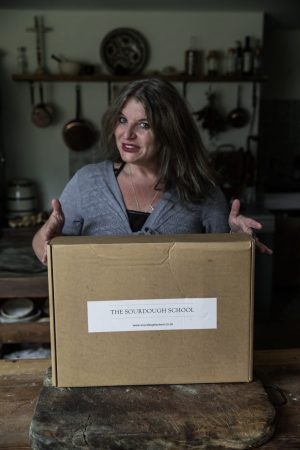
Vanessa Kimbell is a strong advocate for reconnecting the impact of bread on our physical and mental health. Bread, as one of the most basic and universal food items, has a powerful role in our diets and our culture. However, the way we have been producing and consuming bread in recent years has often overlooked its potential health implications.
Viewing bread from an evolutionary perspective, Vanessa emphasizes the importance of traditional fermentation processes in bread making, specifically the sourdough method, which can enhance the bioavailability of nutrients and increase the health benefits of bread.
Fermentation not only preserves food; it also creates an environment for beneficial bacteria to thrive and produce key metabolites during this process. These metabolites can include dietary fibre but also go beyond to produce other compounds such as short-chain fatty acids, vitamins, and minerals.
Recent research suggests that these compounds could have a far-reaching impact on our health, particularly on our gut microbiome, which is increasingly being linked to mental health through the 'gut-brain axis'. In essence, the health of our gut can have a significant impact on our brain and mental health, meaning that the food we eat could indirectly influence our psychological well-being.
However, Vanessa also acknowledges that bread, particularly when made with refined grains and processed on a large scale, can negatively affect our health, contributing to issues such as obesity and chronic diseases. That's why she believes in returning to more traditional bread-making methods, using whole grains and slow fermentation processes, to create a product that tastes better and is also better for our health.
The work at The Sourdough School has, for many years, taught that bread has a crucial role to play in social justice. As a fundamental food staple, access to quality bread is something everyone should have, regardless of their socio-economic status. By promoting more health-conscious bread-making practices, Vanessa aims to make nutritious, wholesome bread more accessible to all.
This symbiotic relationship between us and the food we eat, specifically bread, is not yet fully understood, highlighting the importance of ongoing research in this field. Understanding how different methods of bread production can influence its nutritional properties and subsequent health impacts is crucial to advancing our knowledge and making informed dietary choices. Vanessa's work seeks to illuminate this relationship further, contributing to a broader understanding of the relationship between diet, health, and well-being.
Are there different studies I can take part in?
Yes. We will be running from now on, and there are often different breads with in the studies, but these studies take a lot of resources to put together as awe are a small business and so we cannot say when these will be.
Can a member of my family or a friend join in?
Yes, but they will need to apply for participation and demonstrate that they are able meet the requirements of the study and to eat the prescribed bread.
Who is able to take part in the study?
We are able to offer participation in the study depending on the criteria of each study. This will be published for the study you are applying for on the registration page for the particular study. Each study criteria is different.
How many people take part?
There are a limited number of places in the Sourdough & Gut Microbiome & Mood Study. We usually recruit about 12 participants.
Do I need to pay to be part of the study?
No it is completely free.
Can you recommend some places to visit and things to do near the school?

Northamptonshire
Northamptonshire is beautiful. Whilst the town centre has suffered from the 1960's enthusiastic demolition of many amazing buildings, the countryside and surrounding villages are absolutely charming. There are many amazing historic houses, and some lovely market towns to visit.
https://thesourdoughschool.com/about/nearby-places-visit/
What is a wild fruit water?
Wild yeast waters
I was first introduced to this by Polly, one of my students, in the early days of the School. She had travelled from Hong Kong for a course and described a Chinese way of baking using wild yeasts from fermented fruit. She advised using cherries. The result was incredible, a delicate mild sweet perfumed yeasty bread. We use the wild cherries or grapes from my parents' vineyard, but there are many other fruits that make wild water including apricots, raisins, plums, and figs.
It is a very popular method in Asia. We call it Polly’s Wild Water. She explained that in Asia they don’t like the sourness of very long fermented bread, but they do love working with wild yeast to produce a lighter-flavoured, fermented bread.
When you make a wild water as a starter, you are effectively capturing the Saccharomyces cerevisiae, the yeast naturally found in many sourdough starters and a species believed to have been originally isolated from the skin of grapes. You can literally see the yeast as a component of the thin white film on the skins of dark-coloured fruits such as plums. There are also naturally occurring lactic acid bacteria, but these are at low levels in comparison to a wheat sourdough, so this starter is not one I recommend when it comes to students wanting a more digestible sourdough.
Mature starters … but it smells of apples and it is so good
When the yeasts are aerobic, they are at their most active. Of course, when the yeast ferments in the absence of oxygen (anaerobic fermentation) it produces alcohol and slows down, which is why when you see a sourdough culture that has been left to ferment for a while without being aerated or refreshed it develops a thin layer of water and alcohol (called hooch) on the surface as explained above.
This alcohol provides a catalyst for additional flavour dimension to mature starters in the form of iso-alcohols which contribute to the esterification of organic acids with alcohols. In other words you get esters forming, which makes your starter smell lovely. It smells of fruit - ripe apples, pears and pineapple. The reality is though that when your sourdough is at this point, it is delicious smelling but way too acidic. It needs refreshing ASAP.
Mature starter smells of nail polish remover OR old cheese
Your starter is desperate to be refreshed if it smells of nail polish remover (acetone) or, even further down the line, old cheese (butyric acid). The sad truth is that the esters in your starter, whilst delicious, are in part due to the alcohol produced by yeast fermentation because it is too mature to use. The esters actually contribute little towards final bread flavour, and you will end up with an underproved and heavy loaf. Refresh your starter back to back at least three times before you bake.
Can I change the flour I use?
Yes, although continuity will build your microbes into a robust community. The same microbes getting fed the same flour will have the food they are most used to and hence a stronger ferment. However, I have often changed flour and over a couple of refreshments the starter takes to its new food.
What kind of flour should I use?
The kind of flour you use is up to you. I use British white, rye, spelt wholemeal, heritage grain, chocolate (using 20% cocoa powder) and beetroot (using pureed beetroot instead of water). I recommend three things though. Firstly that the flour you use is organic, secondly that it is freshly milled, and lastly that it is stoneground. This will give your microbes the best nutritional support and it adds extra microbes via the flour, which also supports the health of the ferment.
How long can you leave a starter for?
I’ve often joked that I actually run the RSPCS - Royal Society for Prevention of Cruelty to Sourdough starters. I have kept a starter for over 6 months and revived it. It goes very smelly. This is the butyric and hexonic acid. It smells like parmesan or old trainers, and gets a dark hooch on top.
Can you revive it? Yes. It has to be built up again in the same way you would start a new one.
Is it worth reviving? Well that depends how attached you are to it. If the starter has an emotional significance, then yes it is worth doing.
It will take a few days to get it going again with repeat refreshments, and sometimes it is simply easier to start again.
What if my starter has a layer of grey water on top of it?
Here’s a detailed scientific explanation of hooch tailored for sourdough enthusiasts and professionals:
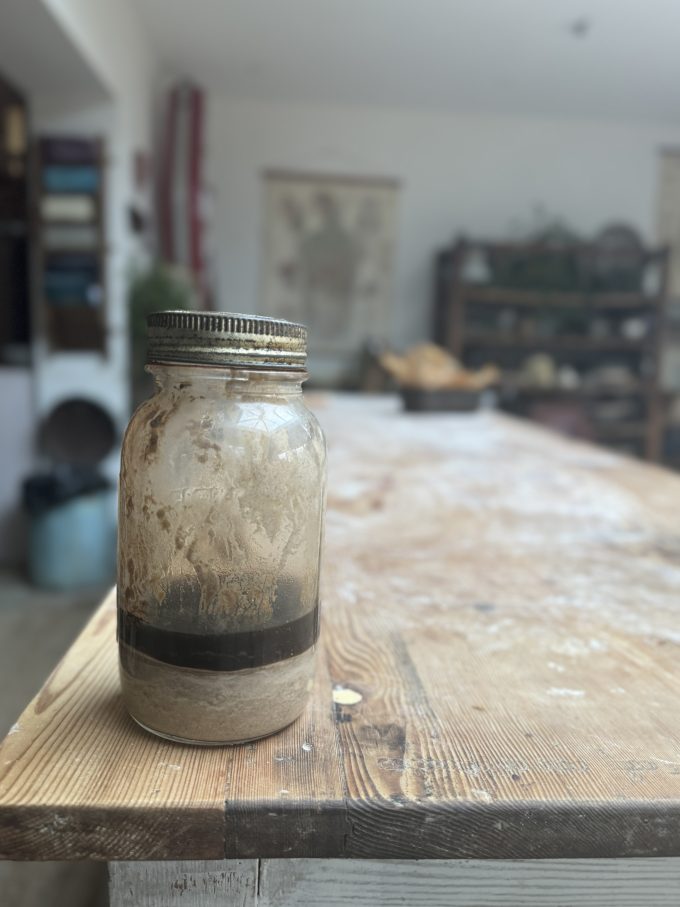
What is Hooch? A Detailed Scientific Explanation
Hooch is a layer of liquid that forms on the surface of a sourdough starter when it has not been fed for an extended period. It is a byproduct of the metabolic activity of the microorganisms in the starter—primarily yeast and lactic acid bacteria (LAB). This liquid is typically composed of water, ethanol, organic acids, and other fermentation metabolites.
The Science Behind Hooch Formation
- Yeast Metabolism
Yeast, such as Saccharomyces cerevisiae, consumes carbohydrates (primarily simple sugars derived from starch breakdown) during fermentation. In the presence of oxygen, yeast metabolises these sugars through aerobic respiration, producing carbon dioxide and water. However, when oxygen is depleted, yeast switches to anaerobic fermentation, resulting in the production of:
- Ethanol (alcohol)
- Carbon dioxide (responsible for dough rise)
- Small amounts of secondary metabolites, such as glycerol and esters. The ethanol produced during anaerobic fermentation accumulates in the liquid portion of the starter, contributing to the formation of hooch.
- Lactic Acid Bacteria (LAB) Activity
LAB, such as Lactobacillus and Leuconostoc species, co-exist with yeast in a sourdough starter. They metabolise sugars and starches into organic acids, primarily:
- Lactic acid
- Acetic acid These acids lower the pH of the starter, creating a tangy flavour profile while inhibiting the growth of unwanted microorganisms. However, when the starter is neglected, LAB activity slows due to a lack of available nutrients, leading to an imbalance in the microbial community.
- Liquid Separation (Syneresis)
Over time, the fermentation byproducts and breakdown of starter structure cause water to separate from the solid components. This process, known as syneresis, results in a layer of liquid (hooch) forming on the surface of the starter. - Microbial Imbalance
A neglected starter becomes acidic due to the accumulation of organic acids and ethanol. This high acidity can stress or kill some microorganisms, leading to reduced microbial diversity and activity.
What Does Hooch Contain?
Hooch is typically a combination of:
- Water: The liquid component separated from the dough matrix.
- Ethanol: Alcohol produced by yeast during anaerobic fermentation.
- Organic Acids: Lactic acid and acetic acid from LAB activity.
- Trace Metabolites: Glycerol, esters, and other fermentation byproducts.
- Dead Microbial Cells: In extreme cases, hooch may contain cellular debris from yeast and LAB.
Is Hooch Harmful?
Hooch is not harmful but is a sign of an imbalanced and undernourished sourdough starter. If left unattended, the starter can become overly acidic, which may inhibit microbial activity and produce undesirable flavours in your bread.
How to Address Hooch
To restore your starter to optimal health:
- Discard the Hooch: Carefully pour off the liquid layer to remove excess ethanol and acidity.
- Refresh the Starter:
- Discard half of the starter to reduce acidity.
- Feed with equal parts fresh flour and water by weight (e.g., 100g each).
- Stir vigorously to incorporate oxygen, which encourages aerobic metabolism and yeast activity.
- Repeat Feeding: In extreme cases of neglect, feed the starter twice daily for 2–3 days to rebuild microbial populations and balance.
- Monitor Activity: Look for bubbles, a pleasant aroma, and doubling in volume within 4–8 hours of feeding, indicating that the starter is active and healthy.
Prevention Tips
- Feed your starter regularly, ideally every 12–24 hours at room temperature or weekly if stored in the refrigerator.
- Maintain a consistent feeding ratio (e.g., 1:1:1 starter to flour to water by weight) to provide sufficient nutrients for microbial growth.
By understanding the science of hooch, you can better manage your sourdough starter and ensure it remains healthy, active, and ready to produce delicious, well-fermented bread.
Help – I want to go on holiday. Does my starter need a babysitter?
Leaving your starter is tough one. I often leave my starter for up to 2 weeks without any ill affects. Some people like to leave it with a friend or neighbour. If that's not an option, you can maintain your starter by leaving the microbes in a super fit condition and reducing the acidity. Refresh your starter twice a day over 2 days before you go away, and in the final refreshment thicken it up to about 60g of water for every 100g of flour that you use. Reducing the amount of water slows down the enzymes, in turn this slows down the rate of acidification. When you get back, build your starter up again by giving it a good feed twice a day for 2 days. Then return to a normal refreshment schedule.
Should I start my own starter or get one from another baker?
For people who are completely new to sourdough, I suggest it is faster and simpler to get an established culture. This can be easier because the process of culturing the starter is done for you, and you get to bake bread straight away. An established starter is also likely to be more reliable in that it already contains active yeasts and bacteria, which have been populating the dough over a long period of time. An established dough is stable, active, and resilient. This means that in your first attempts at making sourdough bread you will be guaranteed a more pleasantly flavoured sourdough, which will encourage you to bake more. Most bakers, whether home or professional, are happy to share their starters.
My starter smells horrid
Your starter should not smell horrid at any time, or have black bits in it, or indeed any mould whatsoever. On a rare occasion you may have a good go at making your own starter only to find it smells or tastes horrid, or that the bread and other baked goods it produces aren’t all that pleasant. This means the bacteria that has occupied your starter is not the right kind and the lactic acid, which makes the starter inhospitable to other organisms, hasn’t got going. You will need to discard this starter and start over. This time move the location of your culture to a different room.
I most often find when I talk to people who are having difficulties with bad smelling starters, they are not refreshing often enough. You need to refresh daily when you are starting a new culture, and you must refresh regularly when maintaining it. Once a week is the ideal.
If you are just getting a starter going, do not use hot water because this can kill the microbes you are trying to culture . Use warm water at about 27 degrees C. And there is absolutely no need EVER to add any bakers yeast.
Sometimes using fruit can introduce live yeast and other bacteria especially on grapes, but to be honest the yeast you want to encourage is on the outside of the grains. It is naturally present in the grain that you use. For the best results, use stoneground organic wholemeal flour, because the milling process is at a much lower temperature so the yeasts will survive.
How and why do I convert a starter to white?
It is generally best to start a new culture with wholegrain or organic rye. These flours are full of naturally-occurring enzymes and nutrients that encourage microbial populations to grow. It is however easy to convert your established starter to another flour, you simply refresh using the new flour. The advantage of using white roller-milled flour is it takes longer to peak because the microbes have to work harder for their food. You can use this to your advantage, especially when you are planning a bake to fit in with a schedule to suit you.
Will it float?
This is a myth. Yes white flour will float when it is ready. It will also float when it has past its optimal point. And both rye and wholegrain do not float in most cases – so you will be waiting a very long time if you are wanting a wholegrain or rye flour to float.
How do I make my own sourdough starter?
To create your own sourdough starter you just need two basic ingredients — organic stoneground flour and water, and some basic equipment and conditions.
It is important that your flour is stone ground as the roller-milled process heats the flour up to temperatures that kill the naturally occurring wild yeast.
The conditions necessary to make a sourdough starter are a warm room. Not hot, not cold, just a room that is pleasant to be in.
A non-reactive container (sourdough starter is acidic and will react with certain metals) to make and store the starter. I prefer glass but plastic is fine too.
A whisk to incorporate air – you can use a whisk if you want.
A breathable cover or a lid such as a clean tea towel, coffee filter, or a loose-fitting disposable shower cap.
You need to keep it in a space to catch your wild yeast with no other cultured foods nearby, or there will be a cross over and you might not get the yeast you need.
The easiest way to start is to put 150g of organic stone ground wholemeal flour and 150g of 34 C water in a large jar. Whisk the mixture vigorously to incorporate air because yeast likes oxygen to reproduce and cover it with your breathable lid.
Allow your mixture to sit in a warm place for 12 to 24 hours. Between the 12- or 24-hour mark, you might be lucky enough to see some bubbles, indicating that organisms are present, but if you don’t then don’t worry. Repeat the feeding by removing a cup full of the mixture, and replacing it with 75g of flour and 75g of water, this time at 28 degrees. Stir vigorously, cover, and wait another 12 to 24 hours. From now on you will need to remove half of the starter before every feeding and discard it, so the starter you do have can multiply in organisms without your jar overflowing.
If you are somewhere warm and using fresh wholegrain flour you will see activity quickly - after about 3–4 days. But if you are in more temperate climates then it can take 10–14 days. The sourdough starter should be beautifully bubbly.
If it is ready to use then it will double in size, the time it takes to do this depends on the kind of flour, the amount of water and the temperature.
In our school generally, the ambient temperature is about 22C.
Rye flour doubles in about 3 hours.
Wholegrain doubles in about 4 hours.
White roller-milled flour doubles in about 8 hours.
Once your starter does this, you have captured and bred enough yeasts and bacteria for your starter to be active enough to bake with.
Did you use a cloche? – Baking your loaf
Preheating the oven before preparing the loaf for baking is, of course, essential. You also need to pre-heat your cloche to be as hot as it can be. If you don’t have the oven hot enough, you don’t get that all important oven spring. So what bakers tend to do is set the temperature of the oven high, and then drop it slightly after the loaf goes in.
My instructions to use a cloche, is because steam is critical factor. A cloche is essential for keeping steam in the oven. Many bakers are put off by the cost of a cloche, but it’s an investment that will last for years and will make a huge difference to the quality of your baking. A cloche, or something that holds the steam around the loaf in the early stages of baking, is a wonderful tool to have. If you don’t keep a steamy environment around your bread while it has that oven spring, the crust will solidify quickly and crumb is then unable to expand. This often results in heavier, more solid loaves.
You can use a casserole, but against my advice. I burned myself so badly once that I wince just thinking about it. Casseroles do the same job as a cloche but with high sides it is difficult to get your dough in and score.
Did you Score correctly?
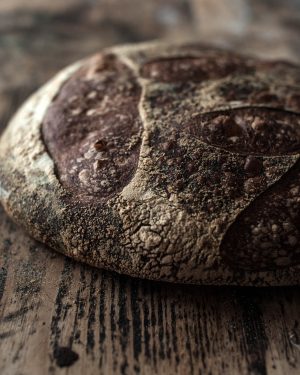 Before baking some people like to take their bread out of the fridge and leave it at room temperature for a while. I don’t tend to do this unless I have misjudged the DDT or the bulk timing I like to take mine straight from the fridge. When I’ve experimented with this, I’ve found that straight from the fridge gets me a better oven spring.
Before baking some people like to take their bread out of the fridge and leave it at room temperature for a while. I don’t tend to do this unless I have misjudged the DDT or the bulk timing I like to take mine straight from the fridge. When I’ve experimented with this, I’ve found that straight from the fridge gets me a better oven spring.
Scoring allows us to control how the loaf expands during the oven spring. This is a huge issue, because there are so many mistakes people make with scoring… it’s the easiest and the hardest thing to do. First off, make sure your blade is very sharp and don’t put any pressure on the dough as you score. It needs just a very light touch, because at this stage the dough is delicate. And there’s no sawing motion either. Just a gentle, swift movement over the top. To allow the bread to rise and have an ear on it, hold the blade at a 45o angle to the surface of the dough.
The scoring pattern and where you score on the loaf affects the way the bread rises. Often you are better off cutting to the side rather than the centre of the surface of the loaf. I tend to stick to three curves on a boule, and one long curved score on the left or right hand side of an oval shaped loaf.
Once the loaf has been scored, get it into the oven as quickly as possible.
Were the final prove timings and temperature correct?
Following shaping, the dough goes into a banneton, which will support it during the final prove. It really is essential to flour the banneton well before putting the dough in. When you come to turn the bread out ready to bake, you want it to plump straight out of the basket, gently and with no disturbance. If it peels slowly out, or sticks to the banneton in places, it may ruin the delicate network of gluten that has developed. So, correct shaping to create a taught surface, and flouring the banneton are both really important.
The dough then goes into the fridge for the final fermentation. It’s important to remember that at this stage one or two degrees difference in temperature can make a difference to the length of the fermentation. A domestic fridge can have warmer or cooler spots, so get to know how the position in the fridge might affect the dough. If I have got a dough that’s very lively, I might just bring down the fridge temperature slightly to enable it to have a long prove. But if it the dough is looking a little cook, I might bring the temperature of the fridge up, to maybe 7 or 8oC. Adjusting the temperature can help you control the timing of this final prove.
Did you shape well?
Getting the shaping right is really important, and the method is slightly different depending on whether you are using a retarded or ambient method. For an ambient loaf, if you shape too firmly and you are too enthusiastic, then you’re going to tighten the gluten and knock all the air out. So for an ambient, it’s important to shape firmly but lightly. For a retarded dough, make sure the pre-shape is nice and tight. In this case the bench rest is essential, it allows the dough to relax before the second shaping. The second shaping again has to be tight, you have to get some structure and tension into the bread. I sometimes describe it as being like a corset, giving the loaf the structure to hold itself together. It’s an important step.
Did you keep the desired dough temperature constant?
Controlling the dough temperature allows bakers to manipulate the timing of the bulk fermentation. Temperature will determine the rate of fermentation, helping you to control yeast activity and the development of flavour in the dough. The main ways you can manipulate dough temperature are through the temperature of the ingredients, especially the water, and the ambient temperature. If you’re working in a really cold kitchen, you can use warmer water to raise the temperature of the dough. Conversely, if the kitchen is hot, you might want to bring the temperature of your water down, to produce a cooler dough. This is especially important if you’re working on a mixer because the mechanical mixing will warm the dough slightly.
Did you add the water incrementally to the dough?
There is a trick to adding the water to the dough, and it’s a secret that many bakers don’t seem to talk about. It’s called bassinage. It really is the key to getting higher hydration in bread.
There is a very specific way of adding water into sourdough. Rather than simply slooshing all the water in at once, I recommend that you add roughly 70%, and set aside the rest. Mix the dough, which will be quite tight, and begin to develop the gluten. When the gluten is developed and you have a good, strong dough, add the rest of the water incrementally – maybe 20 or 25g at a time. Mix it in and let the dough rest for a few minutes to take up the water, before adding the next batch of water.
While we’re talking about hydration, there is another important thing that can lead to problems… baker’s percentages. Understanding how baker’s percentages work is essential to being able to work from a formula rather than a recipe, or for scaling recipes up or down. The baker’s percentage expresses the quantity of each of the ingredients as a percentage of the total amount of flour used. So, flour will always be 100%, and when a formula is 84% hydration this means that for 1kg of flour, you would use 840g of water. Following this example, to make the dough you would initially add 700g of water to the flour and mix. The remaining 140g of water can then be added in small amounts, mixing and resting the dough after each addition.
Getting the hydration right will also affect the structure and crumb of your loaf. An under hydrated loaf, will not have the nice, open crumb many of us are looking for in a sourdough. This is because there just isn’t enough water to allow the gluten to stretch. Equally, if the dough is over hydrated, you are going to lose structure in the loaf because it’s too wet and the gluten is effectively weakened. Optimal hydration will depend on the recipe, and especially on the flour you are using. Some flours are able to absorb more water than others and need a higher hydration. Again, it really is a case of needing to have familiarity with your ingredients.
Did you refresh your starter and make a leaven?
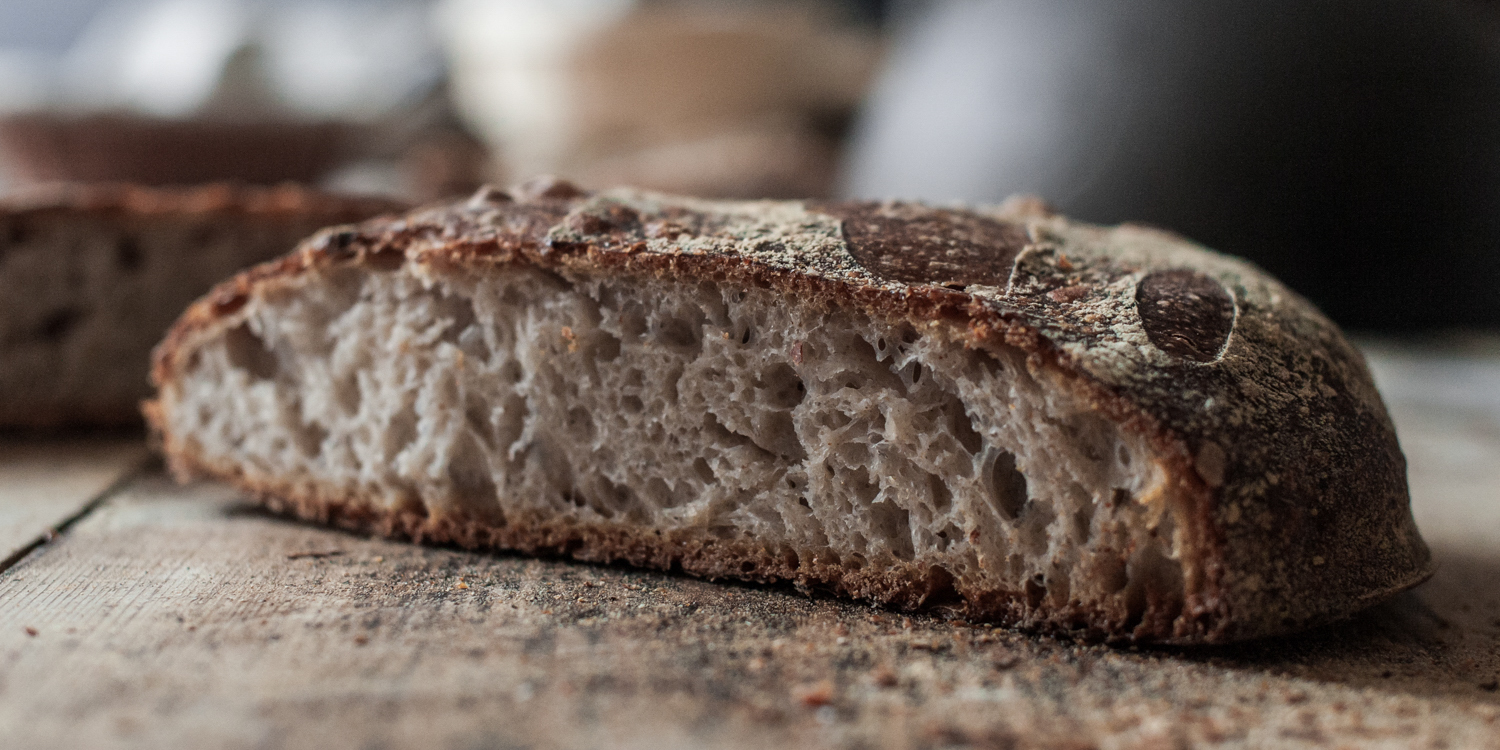 Refresh your Starter
Refresh your Starter
Success depends on your sourdough starter. I cannot emphasise this enough. Your starter needs to be good and lively, containing a healthy population of active microbes. It’s these microbes that produce the gases that fill the dough during fermentation. One of my best friends says that sourdough bakers are like farmers, they are farming microbes. I think this is a really good way to look at what you’re doing as a baker. Get to know your starter – the rhythm of microbial activity after you have refreshed it, how it reacts to different temperatures and different flours. The better you know your starter, the easier it is to predict how long it needs to reach its peak after refreshing.
A less active starter could be the result of many things. It could be that you’re not refreshing it often enough, or because you’re keeping too much starter in the refreshment process. Frequency of refreshment is really important. On the whole, the more frequently you refresh the starter, the more active and more dense the population of microbes will be. In bakeries we’re baking every day. This is one of the reasons bakeries don’t have problems getting their bread to rise, because they’re refreshing continually. Domestic bakers may be leaving their starter for a week at a time between bakes, and then expect it to perform as though it’s still a spring chicken. If your starter has been resting in the fridge for a few days, you have to refresh it a number of times to build the microbial population up before it will be ready to use. If I know that my starter is going to be left for a few days between refreshments, I tend to make it a little wetter than usual. This allows a protective hooch (the liquid that forms on top of the starter when it is left for a while), to develop.
Timing is Everything
For a good loaf we’re looking to use the starter at peak activity, after this the microbial activity begins to decline and you may struggle to get the rise you want. The time it takes for your starter to reach peak activity can be affected by the flour you are using, the hydration and the ambient temperature. Whole wheat and rye flours contain more nutrients and will ferment faster, resulting in a starter which reaches microbial peak sooner. It’s a case of getting to know the flour you use when refreshing your starter. In terms of hydration, a wetter starter will have higher enzymatic activity and reach the microbial peak faster. You also need to keep an eye on temperature, especially if your starter is stored at ambient temperature. There can be a big difference between room temperature on a cold winter day and a warm day in midsummer, and this needs to be taken into account.
A second issue that can arise if you are not refreshing your starter frequently is acidification. The activity of the lactic acid bacteria leads to a build-up of acids in the starter. Some yeasts prefer a less acidic environment than others so, depending on which yeasts are present in your starter, the more acidic environment can result in less yeast activity.
Get the Timings Right for your Leaven
Like the starter, the age of the leaven will dictate the rise of your bread. On a longer, slower fermentation (a retarded method) you're looking for a younger leaven about 2 – 4 hours old. You don’t want any acidity at all in the leaven, because the dough is going to acidify over 24 hours in the fridge. In an ambient loaf however, a little bit of acidity can help to tighten the gluten.
The amount of leaven you include in the dough is another variable. Too much leaven and you can easily over ferment your bread, but too little and it will be under fermented. There are some processes where I use as little as 2% leaven as an inoculation but, in general, for the formulas we use here at the school we tend to stick to round about 20% - just for ease of continuity really.
Is it leaven or levain?
Before I even write the word leaven I have a dilemma. In the same way as the Bible calls Satan by many different names. Each name has a slightly different meaning. The many other names for Satan give a fuller picture of who Satan is and what he does. But like the devil, the leaven is what it is .. it has the same job no matter what you call it.
There again I hear some bakers refer to leaven as the preferment, which is a good term, and to be fair the one I sometimes use to refer to something that has other ingredients in, such as pumpkin flesh, or porridge. Perhaps even more confusing are the borrowed terms from other bread baking, such as polish or a biga (which isn’t totally wrong, but I am not here to split hairs). Leaven is also referred to as the “chief”, “chef”, “head”, “mother”, “sponge” or “Massa Madre”. Some bakers simply skip this step out and just us the word starter – which is even more misleading to home bakers. After all, your starter is a starter all the time. Even 6 months old and smelling of cheese, it is still a starter. Is there any wonder there is so much confusion?
So what is a leaven?
It is the foundation of your sourdough – flour and water, mixed with a small amount of your starter culture and fermented to create an active colony of microorganisms of wild yeast and lactobacilli.
Before I start, I’ll describe a process in a bakery. First thing in the morning, the starter is refreshed. It iss then used about midday and refreshed as the bakers make the dough. Then about 6:30 pm they refresh the starter again. It totally rocks. It is alive. In fact it is so alive it could practically climb out of the bucket and make itself into a loaf. It also tastes sweet. If you stand back and watch the bakers they taste the starter, checking for acidity.
It is especially important to keep it young and fresh because too much acidity with not only overpower the delicate flavours of the flour, but it will also degrade the gluten in the dough and loose volume.
So, this how a starter in a bakery lives it’s life. Young, fresh and sweet, and tended to several times a day.
Why make a leaven?
There are several reasons.
It builds more microbes.
- By refreshing your microbes again, it creates the next generation and so your leaven is young, fresh, vigorous and full of life, but not too acidic.
- It means you can have one pot of starter and make all kinds of leaven at the same time. In this sense, it is flexible. So I often make a muesli leaven, or a Khorasan leaven, or a pumpkin leaven. It means I can play easily.
- Some recipes call for a younger leaven. One that is not fully developed, which might be too soon to return your starter back the fridge. Again it is about flexibility. As home bakers, we generally bake once a week; if we are enthusiastic bakers then perhaps twice. So as your starter ages, it acidifies, and refreshing your starter every 8 hours is not practical – trust me I have tried it and it is exhausting. Even at 14 hours old, I consider it too acidic to make bread with. It is also important to understand that you are effectively farming yeast. That means breeding them. It’s a bit like getting the most workers possible to build a pyramid, the more you have the easier it is to get the job done. The yeast’s job is to create carbon dioxide, so making a leaven from a freshly refreshed starter is the easiest way to to ramp up the numbers of yeast. This way they are young, vigorous and enthusiastic. It is however as important as it is also a means of controlling the acidity. The other factor to consider here is the foundation of your dough. You may not want the same flavour from your starter in your dough. Making a leaven gives you the opportunity to control the flavour through changing the flour in the leaven. To make great sourdough, we have to create that robust colony again and for a domestic baker, the most practical way to do this is by making it a three step process. You make a leaven using 10% of your starter mixed with equal quantities of water to flour at about 28 degrees C and mixing with the flour you want to use for the bread. And you do this 3 – 8 hours before you bake, depending on the method you are baking with.
How long do I have before I MUST use my leaven?
Well that is a matter for you to judge. As I described the method of seeing if it is ripe, so too much you become familiar with your starter as it ages. I tend to recommend that you only really have about two hours. Truthfully you have more time, it is actually about personal preference and is a question of flavour and volume preferences, the enzyme activity of your flour and the ambient temperature.
When should you make a leaven?
On the ambient, I make mine as late as possible before I go to bed, ideally 11pm, using a white roller milled flour.
On the retarded method, about 3 – 4 hours before the dough is mixed. So that is about 7 – 8am and we use either rye or wholegrain.
What kind of flour should I use in my leaven?
That is totally up to you to decide, although I do make suggestions in the recipes. The only other things to consider is that if the extraction rate of your flour will change, you might want to adjust the water slightly. So wholegrain flour might need a little bit more water. I hydrate wholegrain at about 115g of water to 100g of flour.
The other consideration is the liveliness of your flour, so rye will ferment much faster than say a standard strong white bread flour. This can be used to your advantage, say if you wanted to bake a day loaf you could get up early and make your leaven about four hours before with a rye flour and warm water.
So how do you know if your leaven is ripe and ready to go?
.. the most common test, providing your starter is made using predominantly white flour, is that it will float if popped in a glass of water.
This however is not the only factor. Yes it needs to float but just because it does float does not mean it is at it’s perfect ripeness. So, the second thing to do is to smell it and taste it. Please don’t pull a not likely face, this is a totally organoleptic experience and you need to be intimate with your culture. You only need about ¼ of a teaspoon. It should smell lactic, wheaten and yogurty and still a little bit floury. It should taste lightly yeasty and sweet, then you will get a slight tiny tang. It should almost be undetectable. Then, depending on the strength, and the extraction rates of your flour, you will find a tiny bitter back note.
Your leaven will float even when it has gone too far. It will float, even when it is too acidic. You can taste the acidity. It has a citric quality. Like Lemons - light and tarty. The Day method is actually quite forgiving of some acidity, and I rather like the tang it brings to the bread. The overnight method though is not forgiving. The acidity will on the one hand give you that wonderful sour flavour, but if you are fermenting your dough for long periods in the fridge then the hetrofermentative bacteria will do their work anyway and your sourdough structure can become compromised.
When do I refresh a starter to make a leaven?
That depends on the kind of starter that you have.
Generally white is 8 – 12 hours before, whilst wholegrain and rye is 4 – 5 hours before.
What if my starter has mould on it?
Sometimes yeast flocculating on the top of your starter looks like mould. It is actually rather beautiful, and in this instance you will need to trust your sense of smell. If it smells foul then discard it.
If you see black or red mould then you must also discard your starter.
Occasionally you can rescue a stater that has mould on it. You have to be very careful, get rid of all of the top of the starter. I recommend doing this outside as mould spores are a threat to your starter and can linger in the air for a few days waiting for somewhere to land.
If you find a creamy uncontaminated section at the bottom of the pot then you can double refresh with rye flour at 28C and see if it shows signs of life. If not, start again.
Question: How many students will attend a course?
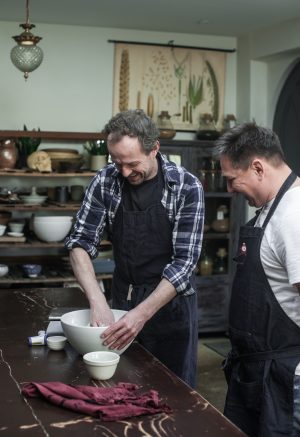 My preferred number of attendees for workshops and retreats ranges between 4 and 6. This count strikes a balance between fostering a vibrant and engaging environment and ensuring personalized attention for each participant.
My preferred number of attendees for workshops and retreats ranges between 4 and 6. This count strikes a balance between fostering a vibrant and engaging environment and ensuring personalized attention for each participant.
For one-day events, which are typically more academic, we can host up to 12 individuals. Please note that these sessions primarily involve demonstrations and discussions as opposed to hands-on baking due to the larger group size.
For larger events, we can accommodate up to 18, such as the Tuscan baking week.
In the case of a course appearing fully booked on our website, there may be circumstances under which we can accommodate an additional student. Should this be your situation, please reach out directly to Libiana@sourdough.co.uk. She will then determine if offering you a place on the course is feasible.
Mobile phone usage at The Sourdough School
During the classes, we are a mobile phone-free space.
Part of learning how to implement the 6 pillars of lifestyle medicine is learning to let the world carry on sometimes so you can focus on being here and now while you are with us. You are free to make calls in the library or garden and take photos of your bakes during breaks, but we have a complete ban on phones in the classes.
Should anyone need to contact you in an emergency, they can use the school number +44 (0)7707 480336
The video below is a good explanation from Professor Adam Alter about why changing your attitude toward your phone is part of our lifestyle medicine approach.
Why do I need to use WhatsApp?
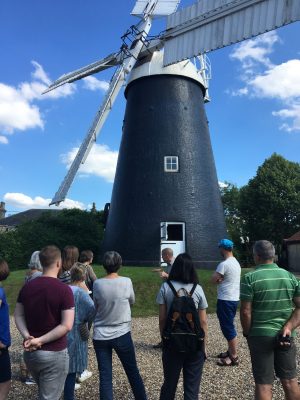 We encourage all students to download WhatsApp before they arrive at the school. This allows us to keep in touch during the course. The signal in rural Northamptonshire isn't always great so when we go shopping or visit then being able to communicate with the group is essential.
We encourage all students to download WhatsApp before they arrive at the school. This allows us to keep in touch during the course. The signal in rural Northamptonshire isn't always great so when we go shopping or visit then being able to communicate with the group is essential.
The Sourdough School and your classmates are also then contactable after the course has finished. We find WhatsApp a great way to share photos of your bakes, exchange ideas and ask questions.
We offer ongoing support through the WhatsApp group for up to 12 months after the course, so it is important to have access to the app to fully participate.
Key Topics on the Diploma
Are there any medical conditions that can be supported through personalisation of Bread?
Bread, especially when tailored according to the principles of Baking as Lifestyle Medicine (BALM), can play a preventative, and supportive role to optimise health in a variety of health conditions by addressing specific nutritional needs and promoting overall gut health. Here's a comprehensive list of conditions that can potentially benefit from medically tailored bread:
- Inflammatory Bowel Disease (IBD): Specially formulated bread can help manage symptoms by incorporating easily digestible, low-FODMAP ingredients that reduce gastrointestinal distress.
- Cardiovascular Disease (CVD): Whole grain, high-fiber bread can lower cholesterol levels and improve heart health by reducing blood pressure and inflammation.
- Diabetes (Type 2): Low-glycemic-index breads can help manage blood sugar levels by incorporating whole grains and seeds that slow glucose absorption.
- Obesity: High-fiber, nutrient-dense breads can promote satiety, helping to manage weight by reducing overall calorie intake.
- Celiac Disease: Gluten-free sourdough breads made from naturally gluten-free grains can provide safe and nutritious options for those with gluten intolerance.
- Irritable Bowel Syndrome (IBS): Bread made with low-FODMAP ingredients can help minimize IBS symptoms by avoiding triggers such as wheat, rye, and barley.
- Allergies and Food Sensitivities: Tailoring bread and baking to exclude specific allergens (like nuts, dairy, or eggs) can help individuals avoid allergic reactions while still enjoying bread.
- Metabolic Syndrome: Incorporating whole grains and seeds rich in omega-3 fatty acids and fiber can improve metabolic health by regulating blood sugar and reducing inflammation.
- Non-Alcoholic Fatty Liver Disease (NAFLD): Bread rich in antioxidants and healthy fats can support liver health by reducing liver fat accumulation and inflammation.
- Osteoporosis: Fortifying bread with calcium, vitamin D, and magnesium can support bone health, particularly in postmenopausal women.
- Mental Health Conditions (such as depression and anxiety): Fermented breads rich in probiotics can influence gut-brain communication, potentially improving mental health through the gut-brain axis.
- Autoimmune Diseases: Gluten-free or low-inflammatory ingredient breads can reduce inflammation, potentially benefiting conditions like rheumatoid arthritis and Hashimoto's thyroiditis.
- Cancer Prevention: High-fiber breads can promote digestive health and reduce the risk of colorectal cancer by enhancing bowel movement and reducing transit time.
Each of these conditions can benefit from a tailored approach to bread-making, where the choice of ingredients, fermentation process, and nutritional profile are aligned with the specific health needs and dietary restrictions of individuals. This approach not only makes bread a versatile component of a therapeutic diet but also empowers individuals to use food as a tool for managing and potentially preventing chronic health conditions.
What Makes the Diploma such a unique course?
The Sourdough School Diploma is an engaging, collaborative learning experience
Of course, I would say this: It is far better to listen to students who have attended the courses and what they have to say. You can see a video of one of our graduates, Melanie, here talking about how she uses BALM protocol and applies the knowledge.
Here how we teach personalisation of bread and baking as preventative healthcare and lifestyle medicine
- You Follow a Dynamic Weekly Modules:
- Each module features its own unique live discussion, typically updated towards the end of the week. This allows students to prepare and engage actively in the upcoming week’s topic.
- You attend Interactive Live Feedback Sessions:
- Scheduled either on Tuesdays or Thursdays, these sessions are vital for real-time feedback and discussion. Students can submit questions in advance, which are then addressed during the session, often with screen sharing to guide them to relevant resources within our extensive library.
- You access Comprehensive Lesson Libraries:
- Our course includes over seven hundred hours of lessons. While the Diploma course is curated to a concise format, students have access to this expansive resource for deeper exploration.
- We Have a Community-Based Learning Approach:
- Emphasising community learning, our course fosters a collaborative environment where diverse questions and perspectives enrich the learning experience.
- Accessibility and Inclusion:
- Live sessions are recorded with captions to cater to diverse needs, including different time zones, languages, and learning paces. We also accommodate dietary requirements and provide glossaries to support students with language barriers.
- I run Drop-In Open Sessions:
- Regular drop-in sessions at 4 pm allow students to seek clarifications or assistance on the syllabus, as well as receive technical support. These sessions provide an opportunity for personalised interaction and ensure that all students, regardless of their specific needs, are fully included in the learning process.
- Your experience is Essential for Personalisation and Application:
- The course includes personalised elements, such as the blood sugar module, where students observe their own responses to different breads. This practical application of the Baking as Lifestyle Medicine (BALM) protocol allows students to understand the impact of bread on a personal level.
- Living Life as Inquiry:
- Our teaching philosophy is rooted in ‘living life as inquiry’, an academic approach that encourages students to create their own knowledge through experience and reflection. This methodology supports a deeper understanding of the interdisciplinary nature of baking, nutrition, and wellness.
- We welcome Transdisciplinary Perspectives:
- The course brings together a diverse range of students, including farmers, gastroenterologists, and nutritionists, creating a rich learning environment. This diversity encourages students to consider multiple perspectives, enhancing their understanding of systems change and sustainability in food production.
- Your Assessment is Through Participation:
- Participation in live discussions is a key component of our assessment method. Engaging in these dialogues allows Dr. Kimbell and the team to understand each student’s progress and provide tailored guidance.
Learning Outcomes: By participating in this course, students will acquire a comprehensive understanding of baking as lifestyle medicine, including practical skills in sourdough bread-making and a deep knowledge of the nutritional aspects of bread. They will also develop the ability to apply these principles as personalised nutrition, enhancing both their health and that of their clients and customers.
What makes a successful applicant?
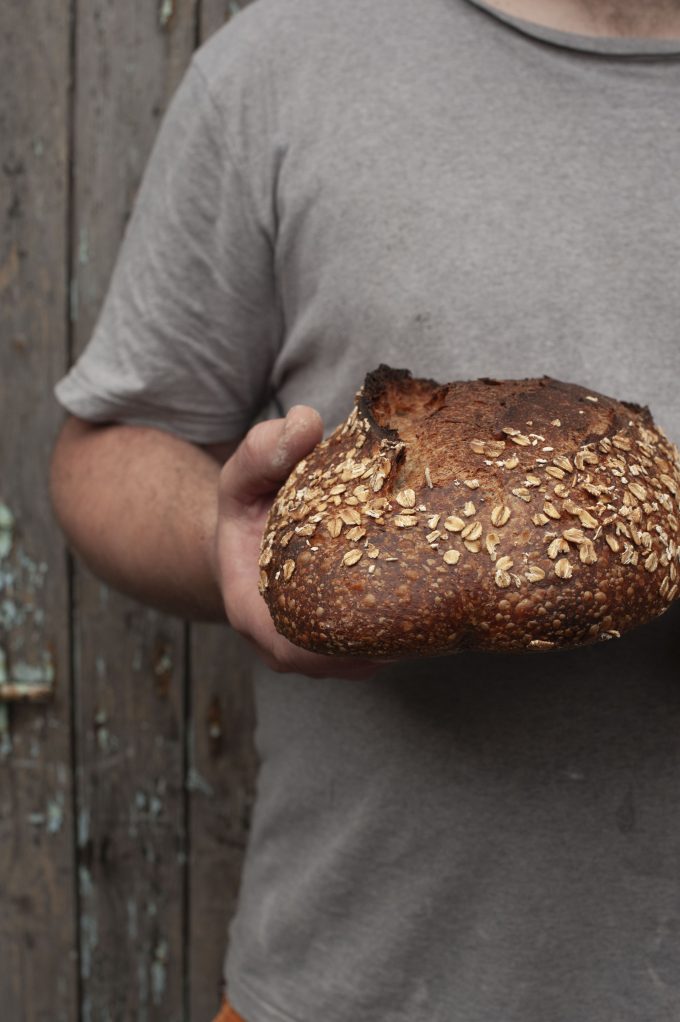
We are interested in you and what you are proposing to do with the knowledge and why this is important to you. We are not looking for what qualifications you have. It is more about understanding why we need change and attitude and intention to do so.
There are many ways to use this knowledge, including individually if you are looking after someone, or as a teacher, a professional baker, or a healthcare professional wanting to get your patient baking great bread.
Here are our tips for successful applications:
- Successful candidates will demonstrate a clear understanding of the needs of the customers or the patients in their community and propose how they will apply the knowledge.
- We suggest that you provide a clear rationale, including who you feel that you will be prescribing for (if you are a healthcare practitioner) or who your customers are if you are a baker and why you are motivated in particular to improve the nourishment of bread. Please include specific aims and well-defined criteria of how you will apply the knowledge.
- We recommend that you take time to write this and then cut copy paste it into the form. Please keep this concise and make it as easy as possible for us to understand, and remember to include which country you are in, if you are not UK based.
Will I learn to make Sourdough on the Diploma?
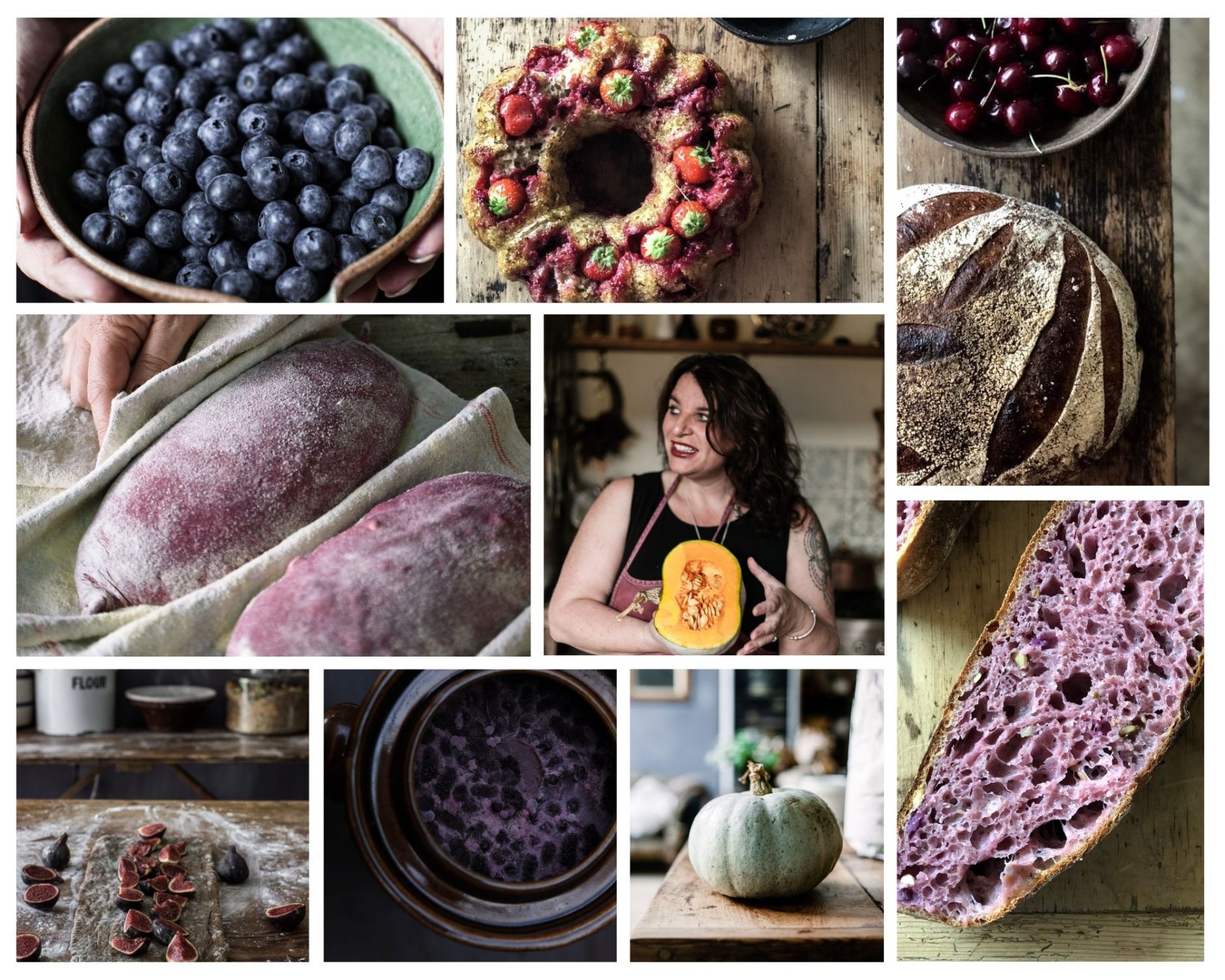 To put this simply, you will learn every aspect of baking Sourdough bread to an advanced level
To put this simply, you will learn every aspect of baking Sourdough bread to an advanced level
Dr Kimbell is one of the most renowned sourdough bakers; with a lifetime of baking, the practical module builds your knowledge each week and will take you beyond the standard baking approach to bread, and you will be amazed at how your artisan baking skills build on this course.
So yes, you will learn how to make sourdough. You will also learn to understand the Sourdough process, fermentation mechanisms, and its impact on health. Baking is key to being able to prescribe.
- You learn baking as a separate module called BALM Practical. You will learn the following:
- How to look after many types of starter
- How to create a botanical blend
- How to control the flavour of sourdough
- How to blend and mill your own flour
- How to make a classic sourdough boule
- Which variables affect the fermentation?
- How much to hydrate your bread by
- How to get an open crumb structure
- About fibre, protein & gluten in the flour
- Understanding shaping & Scoring
- An overview of nutrition & digestibility of bread
- Eating symbiotically for optimal gut health
- Why diversity is key to gut health
- About the gut microbiome and why the kind of bread you eat matters
- Probiotics & prebiotics
Does The Sourdough School have a complaints Procedure?
The Sourdough School Complaints Procedure
The The Sourdough School does have a complaints procedure.
We view complaints as an opportunity to improve for the future, as well as a chance to put things right for the person [or organisation] that has made the complaint.
Our 6-step approach is to:
- To provide a fair complaints procedure which is clear and easy to use for anyone wishing to make a complaint
- To make sure all complaints are investigated fairly and in a timely way
- To publicise the existence of our complaints procedure so that people know how to contact us to make a complaint
- To make sure everyone at The Sourdough School knows what to do if a complaint is received
- To make sure that complaints are, wherever possible, resolved and that relationships are repaired and apologise.
- To gather information which helps us to improve what we do and implement changes to prevent this from happening again.
What is the definition of a complaint?
A complaint is any expression of dissatisfaction, whether justified or not, about any aspect of The Sourdough School
Where do complaints come from?
Complaints may come from any individual, volunteer or organisation who has a legitimate interest in THE SOURDOUGH SCHOOL including the general public if something is perceived to be improper. A complaint can be received verbally, by phone, by email or in writing. This policy does not cover complaints from staff, who should refer to HOPE UK’s internal policy on such matters.
Confidentiality and responsibility
All complaint information will be handled sensitively, telling only those who need to know
Overall responsibility for this policy and its implementation lies with the board of Directors
This policy is reviewed regularly and updated as required. Publicised Contact Details for Complaints: Written complaints may be sent to The Sourdough School
Complaints may also arrive through channels publicised for that purpose or through any other contact details or opportunities the complainant may have, such as social media. Complaints received by telephone or in person need to be recorded.
Telephone complaints
The 6 step process for the person who receives a phone or in person complaint should:
- Write down the facts of the complaint
- Take the complainant's name, address and telephone number
- Note down the relationship of the complainant to The Sourdough School e.g. student, customer, club member, volunteer, sponsor, supplier
- Explain to the complainant that we have a formal complaints procedure
- Explain to the complainant what will happen next and how long it will take
- Where appropriate, ask the complainant to send a written account via the form below so that the complaint is recorded in the complainant’s own words
Resolving Complaints
Step One
In most cases, a complaint is best resolved by the person responsible for the issue being complained about. If the complaint has been received by that person, they may be able to resolve it swiftly and should do so if possible and appropriate. Whether or not the complaint has been resolved, the complaint information should be passed to The Sourdough School Director within five business days.
On receiving the complaint, the Director needs to contact the complainant. If it has not already been resolved, they delegate an appropriate person to investigate it and to take appropriate action. If the complaint relates to a specific person, they should be informed and given a fair opportunity to respond.
Complaints should be acknowledged by the person handling the complaint within five working days. The acknowledgement should say who is dealing with the complaint and when the person complaining can expect a reply.
A copy of our complaints procedure should be attached. Ideally complainants should receive a definitive reply within a month. If this is not possible because for example, an investigation has not been fully completed, a progress report should be sent with an indication of when a full reply will be given. Whether the complaint is justified or not, the reply to the complainant should describe the action taken to investigate the complaint, the conclusions from the investigation, and any action taken as a result of the complaint.
Step Two
If the complainant feels that the problem has not been satisfactorily resolved at Stage One, they can request that the complaint is reviewed at Board level.
At this stage, the complaint will be passed to the Board The request for Board level review should be acknowledged within five working days of receiving it. The acknowledgement should say who will deal with the case and when the complainant can expect a reply. The Board of Directors may investigate the facts of the case themselves or delegate a suitably senior person to do so. This may involve reviewing the paperwork of the case and speaking with the person who dealt with the complaint at Stage One. The person who dealt with the original complaint at Stage One should be kept informed of what is happening.
If the complaint relates to a specific person, they should be informed and given a further opportunity to respond. Ideally complainants should receive a definitive reply within a month. If this is not possible because for example, an investigation has not been fully completed, a progress report should be sent with an indication of when a full reply will be given. Whether the complaint is upheld or not, the reply to the complainant should describe the action taken to investigate the complaint, the conclusions from the investigation, and any action taken as a result of the complaint.
Illegal practices
The decision taken at this stage is final, unless the Board feels that it is appropriate to seek external assistance with resolution if any illegal matters arise.
Please submit your complaint in this form
Silent moments – teaching styles in person
Pausing Your Course
In line with our policy of supporting others to achieve their aims, we do not limit the amount of time that it takes to graduate online. Life and be challenging and circumstances change so we try to be as flexible as possible.
Whilst we do not give refunds, we do offer the opportunity to stop and transfer your course to the following year, in line with our terms and conditions.
To pause your course please fill in this interruption of study below and we will transfer you to next year's course.
Please select a valid form.
How we use your fees to run our Social Enterprise
A conscious decision to operate my business as something more than a commercial entity
As the concept of teaching people to bake for health took shape, it was initially framed by a simple ambition: to contribute, in whatever modest way I could, to the broader goal of making people understand our connection to sourdough. I am determined to change the way we understand bread and inspire change.
A commitment to share knowledge with those who might not ordinarily have the means to access it empowers change.
This was not just in my classes but through social media; I always responded to people to help. This wasn't about the pursuit of profit in the traditional sense. At its core, it was an exploration of how a business could transcend commercial boundaries to serve a deeper, more meaningful purpose - to change the world, for one person is changing the whole world.
In the early stages, the idea was somewhat formless; it was a feeling driven more by an intrinsic sense of duty than by a clear-cut plan. It became evident that there was a significant dichotomy between the availability of knowledge and its accessibility, but I felt that the true value of knowledge lies not in its accumulation but in its dissemination. Why, then, should access to transformative education and information be restricted to those who happen to have money?
I measure success by the impact on the community and the wider world.
More recently, as my understanding of the business world deepened, a phrase caught my attention and resonated with my evolving vision: "social enterprise." It was a total revelation. This was the articulation of my practice. The precise terminology to describe it existed. The realisation dawned on me that the path I had been navigating was not uncharted but instead aligned with a far broader movement that places societal impact at the heart of the entrepreneurial endeavour.
So whilst we do need fees to run, I do not measure success as profit. I measure success by the impact on the community and the wider world.
Making my own starter is going wrong.
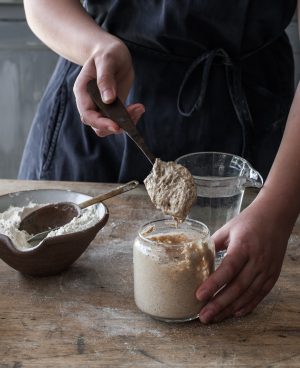 On rare occasions, you may have a good go at making your own starter only to find that it smells or tastes horrid or that the bread or other baked goods it produces are not very pleasant. This means that the bacteria that has occupied your starter is not the right kind, and the lactic acid, which makes the starter inhospitable to other organisms, hasn’t got going. You will need to discard this one and start over, moving your culture to a different room.
On rare occasions, you may have a good go at making your own starter only to find that it smells or tastes horrid or that the bread or other baked goods it produces are not very pleasant. This means that the bacteria that has occupied your starter is not the right kind, and the lactic acid, which makes the starter inhospitable to other organisms, hasn’t got going. You will need to discard this one and start over, moving your culture to a different room.
I most often find that people who are having difficulties have meddled with the process of trying to fast-track it or are not refreshing frequently enough. Please be patient. You do not need hot water, live yeast, grapes or any other extra thing to get wild yeast going. It is naturally present in the grain you use and, for the best results, use stone ground, organic, wholemeal flour.
For people who are completely new to sourdough, I suggest using an established culture as it is easier to get started with. When people first get going and they are keen to bake bread straight away, it is faster and simpler to use an established one that already contains active yeasts that have been populating the dough over a long period of time. An established dough is stable, active, and resilient. It is because of its established bacteria and yeast that in the first attempts of making sourdough bread you will be guaranteed a more pleasantly flavoured sourdough and more likely to continue baking. Try asking your local sourdough bakery if they are happy to give you some of theirs.
What Is The Best Way To Reach The Castle From The Surrounding Airports?
The dog rules at The Sourdough School

Can I bring my own dog?
We have cats and chickens, and hygiene rules, so unless your dog is a service dog, then we are not in a position to accommodate dogs.
Can you put your dogs away?
Although we are able to lock the dogs away whilst people are arriving or leaving. Their job is to alert me that there are people here, and this is their home.
Are dogs allowed in The School?
As we have the doors open in the school in the summer they occasionally wander into The School however we do not allow that pets in this area and ask that you do not encourage them in, please.

Service dog
Whilst we do not allow animals in the food preparation areas, it is important to understand that Arlo is a service dog, and is trained to perform a role that helps in certain challenges. Vanessa is neurodiverse and Arlo's job is to help manage anxiety and help in certain situations interact with others to maintain a happy and healthy lifestyle. He is a devoted companion providing reassurance, security and friendship. We are able to limit the presence of Arlo, but The Sourdough School is part of Vanessa's home, and we use some areas during the course that are not food areas but our day-to-day family space, so if you are afraid of dogs or have an allergy then please speak to us before attending and we will try to accommodate.
Polly does not like to be fussed
Polly is the small Jack Russel. She is the whiter dog and she deeply dislikes being touched by people. She may look friendly and as though she wants to be petted, but if you fuss her she will growl and may snap. We ask that you do NOT touch her at any time on the course. She will not attack you, or chase you, or engage with you. She will ignore you, but do not be fooled by her!
Can I speak to Vanessa Directly?
Yes - there is a regular session which is ideal if you want to speak directly to Vanessa. Vanessa and the team are a small part-time team so this is a much quicker way to ask about things than sending long emails.
If you would like to ask a question beforehand then we will try and prioritise the answer.
The sessions are NOT shown on the catch-up, so you will need to attend live. You are muted and asked to be respectful of the other students in the meeting. It is an open session and Vanessa is happy to chat with people once she has answered any questions sent in, and if there is enough time.
Sessions are 45 minutes long. We are very sorry but this is the time limit as there is another tutorial at 5 pm.
Topic: 4 pm Open Session Vanessa Kimbell at The Sourdough School (Term-time Only)
Join Zoom Meeting
https://us02web.zoom.us/j/89781518036?pwd=bzdvWElibUFMdVd2b1ovRitWNUNTdz09
Meeting ID: 897 8151 8036
Passcode: 813462
Sessions are every Thursday 4 pm (London Time) starting this 29th September 2022 and run throughout this term.
When are the live sessions and how often?
Live Sessions are weekly on Tuesdays in terms time - please see the Live Session Board for information
What if I miss a Live session or I am learning from a different time zone?
Do not worry - we have it cover. All the sessions are recorded and you have 4 weeks to catch up with them.
How you deliver The Diploma Course?
The Diploma at The Sourdough School goes far beyond any other course in the way we approach traditional baking education, delving into the art and science of personalising bread to enhance health and wellbeing. It's a comprehensive program designed not just to teach the craft of baking but to understand and apply the nuanced process of personalising bread to meet specific health needs, using our foundational Baking as Lifestyle Medicine (BALM) protocol.
Understanding How Our Courses Work:
- Module Structure:
- We offer two distinct modules: the Bake for Health Module and the Personalising Bread Module.
- Each module is designed to complement the other, providing a comprehensive learning experience.
- Bake for Health Module:
- This module focuses on the practical aspects of baking sourdough bread for optimal health.
- The content is structured into three syllabi, following the Oxbridge terms timetable.
- Weekly live baking clinic interactive sessions that are held on Tuesday evenings at 7 pm (GMT) to discuss course tasks and assignments.
- Participants are encouraged to refrain from skipping ahead in the baking process and to actively participate in the forum to contribute to the learning community.
- A living syllabus approach ensures that course materials are regularly updated and relevant.
- Personalising Bread Module:
- This module complements the Bake for Health Module by providing theoretical knowledge and understanding. You watch a lecture, or read a feature that focuses on how bread and dietary choices impact physical and mental health. There are a wide range of topics.
- Live sessions run concurrently with the Bake for Health Module, this is conversational and interactive Weekly interactive sessions that are held on Tuesday evenings at 6 pm (GMT) to discuss course and bring insight into the research and theory behind bread's effects on health.
- Participants are encouraged to engage with the provided resources and ask questions to deepen their understanding.
- Course Structure:
- Both modules span one year, with an additional year provided for refining graduation recipes.
- The curriculum is designed for repetition and depth, allowing participants to revisit topics and apply knowledge over time.
- Live sessions are interactive and responsive, tailored to address participant interests and queries.
- Completion and Graduation:
- Participants have the flexibility to learn at their own pace over the two-year period.
- Graduation involves showcasing a final recipe that reflects the participant's learning and creativity.
- Feedback and engagement from participants shape the evolution of the course, ensuring it remains relevant and enriching.
The Two Modules
Overview of The Diploma
- Understanding the Impact of Bread on Health: Students begin by exploring how mass-produced bread can negatively influence health and why the personalisation of bread through the BALM protocol offers a path to improvement, particularly for the gut microbiome and mental health.
- The Science of Fermentation: A deep dive into how slow, long fermentation processes not only enhance the flavour and texture of bread but also contribute to significant health benefits, grounding our understanding in scientific evidence.
- Practical Application of Personalised Bread: Each week, students apply theoretical knowledge to the practical baking of personalised bread. This hands-on experience is crucial for understanding how to tailor bread to specific health needs and dietary preferences.
- Unique Insights into Gut Health: Through the course, students gain a unique perspective on how the BALM approach influences the gut microbiome and overall health, supported by pre- and post-course gut microbiome testing and personalised feedback sessions.
- Case Studies and Clinical Practice: The programme includes appraisal of case studies demonstrating the positive impact of personalised bread on physical and mental health outcomes. This evidence base supports medical professionals in incorporating BALM into their clinical practice, offering a new dimension to patient care.
- Community Health and Social Prescription: Emphasising the 'bake two, share one' principle, the course encourages community connection and support, addressing loneliness and social isolation. This principle was inspired by transformative stories from healthcare professionals who have witnessed the power of shared baking to change lives.
- BALM as Activism: Students are encouraged to view and participate in BALM as a form of activism, promoting a healthier, more connected society through the medium of bread.
- Graduation and Beyond: The culmination of the Diploma involves creating and sharing a case study and a personalised bread formula or cake recipe. Graduates can apply for a license to prescribe BALM, extending the benefits of their learning to patients and communities. The journey continues with the opportunity to mentor and inspire the next generation, staying connected as an Alumni member.
This Diploma is not merely an educational pursuit; it's a movement towards integrating the nurturing power of bread into our lives and healthcare practices. It's about bringing joy, nourishment, and a deep sense of purpose to both the baker and those with whom they share their creations. Through the personalised approach to bread-making taught in this program, we aim to forge stronger connections between healthcare professionals and patients, enhance physical and mental health through diet, and empower a community of bakers to make a difference in the world, one loaf at a time.
Where is The Sourdough School?
Trains, taxis, airports etc
The School is are a world away from the hustle and bustle in a pretty village just 4 miles north of Northamptonshire – which is possibly one of the most easily accessible counties in England. We are within an hour reach of London, Oxford, Milton Keynes, Cambridge, Leicester and Birmingham, which is just 15 – 20 minutes from the M1, the M6 and the A14.
Driving distances to The Sourdough School
- London 75 miles via M1
- Cambridge 55 miles via A14
- Oxford 48 miles via A43
- Birmingham 53 miles via M6
- Manchester 135 miles via M6
The nearest train station Northampton is also only a 15 minute taxi ride away, making it really easy to get to us from London on the train.
.
How to get to here by Train
BY TRAIN
There are regular trains from London Euston and Birmingham to Northampton.
Central London – trains go directly from London Euston station to Northampton station and take about 55 minutes. A taxi to the school from Northampton station takes about 15 minutes.
If there is ever a problem with the Euston to Northampton line, trains also run from St Pancreas to Wellingborough and Market Harborough both of which are about a 20 minute taxi drive away.
Birmingham – trains go from Birmingham to Long Buckby station and take about 40 minutes. A taxi from Long Buckby station to the school is about 15-20 minutes. Long Buckby is a rural station so there are no black cabs here.
Check www.nationalrail.co.uk for train times. We are about 15 – 20 minutes away from the station by car, dependent on traffic.
Taxi service from the Train station.
Amber Cars – 01604 232666 https://www.ambercarsnorthampton.com/
Ace Cars – 01604 719697
Bounds – 01604 626262
Phoenix Class – 01604 222222
We would advise that you pre-book a taxi to take you from the train station to the school, and vice versa. Black cabs at the train station are more expensive.
How to travel here By Air
BY AIR
The closest airports are –
Birmingham – there are regular trains direct from the airport to Long Buckby (about 40 minutes). Then take a taxi to the school (approximately 15 minutes). You will need to pre-book a taxi as this is a small rural train station and there is no taxi rank.
Luton – the quickest option is to take a taxi from the airport (approximately 50 minutes) – we have used Skyways Cars before. The most affordable option is the National Express bus service to Northampton town centre which takes about 1 hour 15 minutes. Then take a taxi or the X7 bus from the bus station to the school. The bus stop at the top of Pitsford village is about a 10-15 minute walk to the school. You can book National Express bus journeys online.
East Midlands – a taxi from the airport will take a little under an hour. National Express runs two buses each weekday, the journey to Northampton town centre takes either 2 hours 15 minutes or 2 hours 50 minutes depending on which service you take. You will then need to take a taxi or an X7 bus from Northampton town centre to the school.
Stanstead – trains run every 20 minutes from Stansted to Tottenham Hale underground from where you can get an underground train to London Euston. Overland trains from Euston run hourly to Northampton. You can then take a taxi or the X7 bus from the bus station to the school. The train station is about a 15 minute walk to the bus station.
Heathrow – trains via Euston London take about an hour to Northampton railway station. To get to Euston from Heathrow follow signs for the London Underground, take the Piccadilly Line to Green Park, then the Victoria Line to Euston. Allow an hour to get from Heathrow to Euston.
Or you can just take the Piccadilly Line straight to Kings Cross St. Pancras and walk to Euston (about ten minutes). From Northampton train station to get to the school you will need to take a taxi (about 15-20 minutes). If you can pre-book a taxi it will be cheaper.
Alternatively you can take a bus to Watford Junction and then the train to Northampton (both run hourly) this takes 2¼ hours.
When you are booking flights around a course at The Sourdough School, please allow plenty of time for travel between the school and the airport.
How to Get to The School by Bus
By Bus
There is a stagecoach service which will drop off at the main road on the A508 which is about a 10 – 15 minute walk into the village here – please contact me for more details of which stop is best to get off at. You will need the X7 bus.
It is about 15 minutes to walk through the village to The Sourdough School.
Why do I need to agree to Certain legal forms?
There are several forms that you need to fill in to attend the School. Film release forms, non disclosure, and your student registration form.
Refund policy and pausing your Online Course
Our Commitment to Educational Access: Explaining Our No Refund Policy
To enable this cycle of reinvestment, we have a no-refund policy for our courses. We want to ensure that all potential students are aware of this policy at the time of enrolment. This approach allows us to plan for and allocate scholarships and support our social prescription baking scheme effectively.
We understand that life can sometimes be unpredictable, and we want to accommodate our students' needs as much as possible. Therefore, if you need to take a break after starting a course, you can pause and resume at your convenience.
Before you enrol, please make sure to familiarize yourself with our policies and the unique social enterprise model of The Sourdough School. We are here to support your learning journey and empower you to become part of a movement for systems change in the world of baking, health, and social equality.
Terms and conditions We are passionate about providing education to as many people as possible, regardless of their financial circumstances. As both a small business and a social enterprise, we strive to use our resources effectively and inclusively.
Each year, we calculate our tuition fees and allocate our scholarships, bursaries, and awards accordingly. This calculation is based on the assumption that once a student accepts a course, they commit to completing it, and the tuition fees they pay are dedicated to implementing our systems change programme.
Our no refund policy, in the simplest terms, is integral to our ability to provide this opportunity to others. For every person who pays for a course, we can extend the training and education to two people who would not ordinarily have the opportunity. This approach aligns with our values of inclusivity and learning accessibility.
Refunding course fees would significantly impact our ability to run this programme. Therefore, instead of providing refunds, we offer the option to pause your course. We've found this to be a supportive and inclusive solution, allowing students to return when they are ready without financial loss.
For the 2022/23 Programme, we generated £50,000 in revenue and awarded £150,000 worth of scholarships and awards. To continue operating and providing these opportunities, we cannot offer refunds. This is why we have a strict application process and require all applicants to fully understand and agree to our no-refund policy.
If unforeseen circumstances arise and you are unable to continue with your course at this time, we can pause your course and re-enroll you the following year. We believe this approach respects both our commitment to providing educational opportunities and our students' varying life situations.
Thank you for understanding and supporting our mission to make sourdough education accessible for all.
To pause your course, please fill in this interruption of study below, and we will transfer you to next year's course.
Mobile Phones
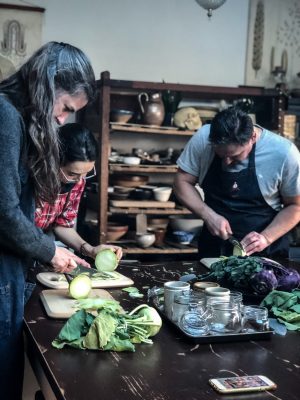 School is a mobile phone-free space during the classes while I am teaching.
School is a mobile phone-free space during the classes while I am teaching.
It is important to focus on sourdough while you are with us, and it is unfair to everyone else when someone is taking calls, texting and scrolling through their emails during the class.
You can take photos, and of course, you are free to make calls in the library or garden during breaks, but we ask that you turn your phone off during the retreats and the workshops whilst we are teaching.
Should anyone need to contact you in an emergency, they can use Vanessa's personal mobile which will be on in the school for emergencies only +44 (0)7813308301 -
What Should I wear & why neutral colours?
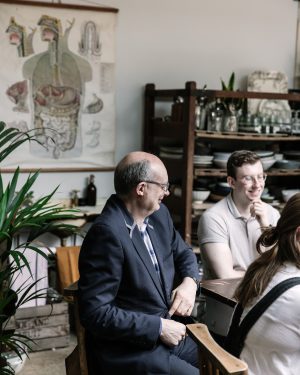 You will need:
You will need:
- An apron OR two if you are staying longer.
- Indoor shoes
- Outdoor shoes
- A swimming costume if you are on the retreat and wish to do outdoor swimming
- A coat if it is raining,
- Something comfortable to do gentle exercise - for example, yoga on the lawn
- Something to tie your hair up with
- Layers - The School gets warm when the ovens are on, so cotton.
- Clothes that you don't mind getting flour on!
Colour policy
Please try to choose non-bright colours, and no patterns when choosing your apron and avoid wherever possible any bright colours or red. We have a policy of inclusion and we pay particular attention to reducing sensory overload through colours and sound. This helps make The Sourdough School a calm and relaxing environment for neurologically diverse people, and by asking that you wear neutral colours whenever possible this significantly reduces overload of the senses, making the environment calm for everyone.
1 Purpose Of Our Policy
This policy represents a commitment to a common set of values and objectives
Our policy ensures transparency, assists in the performance of this duty.
We have used the guidelines of the Equality Act 2010 Regulations 2011 (Which requires public authorities, to publish, quality objectives, and to provide information to demonstrate compliance with the public sector equality.)
We are committed to advancing and achieving equality of opportunity for all. We believe that bread that nourishes is a fundamental human right and we believe that everyone is entitled to equality of opportunity. We have even named our bread as Diversity Bread ®
All team members, club members and students are responsible for the promotion and advancement of this policy. Any behaviour, actions or conversation that transgress the policy will not be allowed and will be subject to our Disciplinary Policy and Procedure.
H
2 Roles and responsibilities
As a small business, designated member of staff for equality is Vanessa Kimbell and she is happy to discuss any issues and how any issue is being addressed. Any suspected breaches are investigated and managed swiftly, effectively, fairly and consistently.
We publish this policy to ensure that that everyone is aware of this policy and associated procedures. The team will also ensure that this policy is implemented fairly and consistently, and to ensure that this policy is fairly and equitably Vanessa is happy to give guidance, clarification and support as and when required.
Anyone Involved with the Sourdough School or Club must promote equality and diversity, and they must actively respond to any incidents of unfair discrimination related to protected characteristics perpetuated in any communication. We expect that suppliers and any organisation dealing with The Sourdough School respect others in their language, behaviours and actions and they must adhere to our equality and diversity policies, procedures and practices.
3 Equality, Diversity, and Inclusion
3 Equality, Diversity, and Inclusion
- The Sourdough School is committed to:
- Promoting equality and diversity in all our policies, procedures and guidelines
- Delivering high quality Baking as Lifestyle Medicine Knowledge that meets the diverse needs of our students, and members.
- Ensuring anyone with a protected characteristic as described within the Equality Act 2010 and does not experience discrimination
- Foster good relations across all characteristics, between people who share a protected characteristic and people who do not share it.
3. 1 How we encourage openness, fairness, and transparency
6 ways we encourage openness, fairness, and transparency
- We do our utmost, within available resources, to remove any barriers which limit or discourage access to The Sourdough School or club.
- We take effective action immediately to provide information and encouragement and support to individuals and groups whose may been limited be stereotyping or using cultural misconceptions.
- We ask that all our team members follow policies and procedures that are fair, transparent and in line with our culture and ethos, and our legal and statutory responsibilities.
- We ask that we ensure our communications are fair and polite, but we point out wherever possible any decisions, behaviours and actions align with our ethical leadership framework, in a supportive non conformational way.
- We try to actively advance equality of opportunity
We create recipes and approaches to our recipes that celebrates a diverse society
Our community promotes good relations. - At all times we eliminate all forms of unfair indirect and direct discrimination, bullying, harassment, by having an open policy we hope that we can set any misunderstandings straight as soon as possible to avoid any unnecessary distress.
The policy applies to all and underpins all The School and Club policies and procedures.
3.2 Supporting Neurodiversity
Encouraging people to bring their whole, authentic self to work and school, with the knowledge that we value difference and diversity. As Vanessa is neurodiverse, we have an open policy of sharing this information, as challenges from ASD, ADHD symptoms and dyslexia, are given support,
Avoiding Ableism Through Organizational Education
In order to be inclusive of those with less visible disabilities, we ensure that we have an open policy of disability awareness and make sure that we show sensitivity to all team members. We do not tolerate ableist language choices that may unconsciously discriminate against team members with disabilities.
To avoid accidental ableism and increase accommodation, we try at every opportunity to educate our team members and out suppliers and community (individually and collectively) on some of the most common misperceptions about disabilities.
Flexible working
Mental fatigue and ability to focus certain times of day may be an issue for those identifying as neurodiverse. We record our live sessions so they can catch up when they are ready, and wherever possible we allow people to self- schedule around their optimal times of productivity as we know this is of great benefit.

We Encourage Screen Breaks and taking time out
We are very fortunate to have Arlo who is Vanessa’s Service dog and so while screen breaks and check ins are important to reduce risks for all team members, for any individual with autism and/ or ADHD, the potential risk is increased. Hyperfocus for these neurotypes lead to overworking and so one of Arlo’s jobs is specifically to encourage Vanessa and anyone else at The Sourdough School to step away from the screen, walk outside get some sunshine and fresh air, and some gentle exercise and he helps to limit consecutive work hours may reduce future risk of burnout.
Sensory overload
The Sourdough School environment is very calm. The colours and pallet, textures and light have been created over many years to provide a soft light, and a quiet environment that reduces sensory overload. This is particularly designed to create a peaceful space for anyone with sensory overload, we find that everyone who spends time here feels that this is a magical environment that promotes a relaxed atmosphere.
We also ask our students to bring a non-bright colour apron and avoid wherever possible colours that overload the senses.
3.3 Support for Women
Women
A proactive approach to makes sure everyone feels supported, including women doing the courses and team members.
Mindful of Menopause
We are committed to supporting women during menopause
The things that make The Sourdough School a menopause friendly workplace
Open conversations to help raise awareness and understanding of the menopause and its symptoms and addressing any stigma.
- A workplace that empowers anyone to ask for support.
- Flexible working available to allow time out
- A flexible clothing policy.
- Fans and good ventilation in the school and the offices
- Clean, well-equipped, and comfortable toilet facilities with washing facilities and deodorant in case anytime needs to freshen up
- Cold drinks and water always available (and tea and coffee and wine too!)
- Quiet workplace rest areas, and the garden to sit quietly in.
- Lunch is made by Vanessa for everyone most days.
Supporting Mothers
The Sourdough School has been created by Vanessa, who began The School when her children were very little. With 3 children and a business to run Vanessa is more than aware of the demands made on mothers, so we are a friendly and comfortable place for mothers. We try with all people connected to The Sourdough School, from suppliers and team members, club members and students to ensure that we are as flexible as possible to allow mums to do all the things that are needed of them whilst still being part of the Sourdough School.
4 Our Duty
Both The Sourdough School, and The Sourdough Club is aware of its obligations under the Equality Act 2010 and whilst we comply with non-discrimination provisions, we actually aim to actively encourage a positive culture where we go above and beyond any legal and statutory requirements to ensure we operate in a climate where difference is valued and understood, and where everyone experiences equal opportunities so that everyone feels part of an inclusive community.
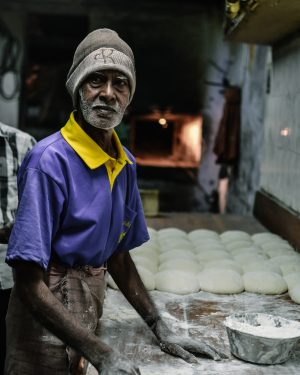
We promote tolerance, friendship and (although we are not religious,) we celebrate all religions and cultures through different aspects of our baking in courses, online and in our books. This includes breads and recipes that are from many different cultures, and different religious celebrations, however we are also aware of not crossing the boundaries of inappropriate or unacknowledged adoption of an element or elements of one culture or identity by members of another culture. Vanessa is keen to ensure that bread culture is not replaced by dominant accepted bread popular culture.
Going above and Beyond
We also invite external guest speakers to contribute
5. Objectives
Our objective are to increase participation from all walks of life,- we have an awards programme that we run to help with this.
We also encourage increased understanding between religious groups through food culture, baking eating and sharing bread. We are a safe inclusive environment and encourage engagement and understanding of differences in the way we approach Baking as Lifestyle Medicine
We also acknowledge the inequalities and challenges women at work face, and look to reduce those inequalities and challenges, increasing understanding through education, signposting and support wherever possible, and also through empowering through nutritional support and knowledge.
We aim to increasing opportunities to learn, including flexible catch-up sections
6. Breaches to policy
If any team member, club member or student or indeed anyone who is in contact with The Sourdough School or Club feels that they have not been treated in accordance with this policy, they have right of complaint our Complaints Procedure.
7 Monitoring compliance and reviewing
Effectiveness and compliance of this Policy will be monitored on an annual basis. This Policy and Procedure will be reviewed once a year in December ( the original date of implementation).)
- December 2019 Written and reviewed
- December 2020 updated and reviewed
- December 2021 updated and reviewed
- December 2022 update and reviewed
Do you have office opening hours?
Office Admin Hours.
Truthfully we don’t really hang out in the office.
We find computers, flour and water don’t mix. Mostly we are in the school baking, teaching or filming, so we respond to emails and non-urgent queries on emails and Vanessa does a live session each week for any queries.
This session is ideal if you want to speak directly to me. I find this a much quicker way to answer peoples queries than long emails!
If you would like to ask a question we will review it and send you an invitation to attend. The sessions are NOT shown on the catch up, so you will need to attend live. You are muted and asked to be respectful of the other students in the meeting. It is an open session and I am happy to chat with people once I have answered any questions sent in, and I have enough time.
Sessions are 45 minutes long. I am very sorry but this is the time limit as I have to be in another tutorial at 5pm.
Topic: 4pm Open Session Vanessa Kimbell at The Sourdough School ( Terms time Only)
Join Zoom Meeting
https://us02web.zoom.us/j/89781518036?pwd=bzdvWElibUFMdVd2b1ovRitWNUNTdz09
Meeting ID: 897 8151 8036
Passcode: 813462
Session are every Thursday 4pm ( London Time ) starting this 29th September 2022 and run through out this term.
Why personalisation of bread is non diagnostic
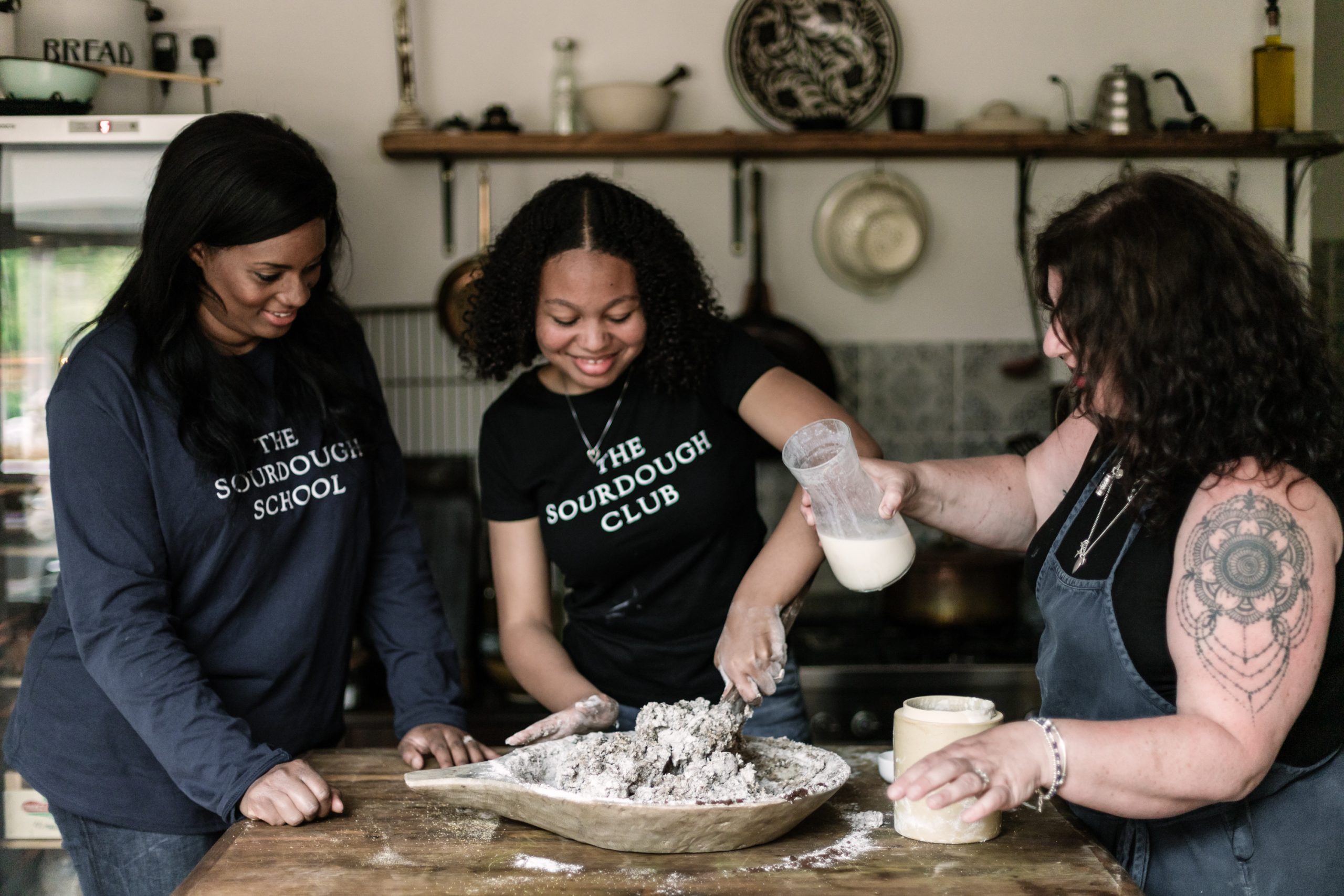 In our practice of personalising bread at The Sourdough School to support health and well-being, however it's crucial to clarify our position regarding the diagnosis of medical conditions. Our approach is fundamentally rooted in working collaboratively with healthcare professionals and their patients to personalise bread in a way that supports their diagnosed health conditions. We adhere to a strict protocol that prioritises the safety and well-being of individuals seeking to integrate personalised bread into their lifestyle for health benefits.
In our practice of personalising bread at The Sourdough School to support health and well-being, however it's crucial to clarify our position regarding the diagnosis of medical conditions. Our approach is fundamentally rooted in working collaboratively with healthcare professionals and their patients to personalise bread in a way that supports their diagnosed health conditions. We adhere to a strict protocol that prioritises the safety and well-being of individuals seeking to integrate personalised bread into their lifestyle for health benefits.Here's why we do not diagnose:
Learn how to challenge the threats from food inequality

We acknowledge that overhauling our current food system towards a more equitable and sustainable model is a multifaceted challenge. However, it is a challenge that requires immediate attention. Research has shown that our gut microbiomes respond to changes in our diets over a very short period. With our climate changing at an alarming rate, these issues are intrinsically connected.
By engaging in our courses, you are contributing to this necessary change. You are gaining the knowledge and skills to bake sourdough bread, yes, but you are also learning to understand the broader implications of your choices. You're becoming an advocate for healthier eating, a more sustainable food system, and a healthier planet.
In a sense, our students are the change-makers. By learning with us, you're moving towards a healthier lifestyle and a more sustainable world. Together, we can make a significant impact. We invite you to join us on this inspiring journey.
Acceptance
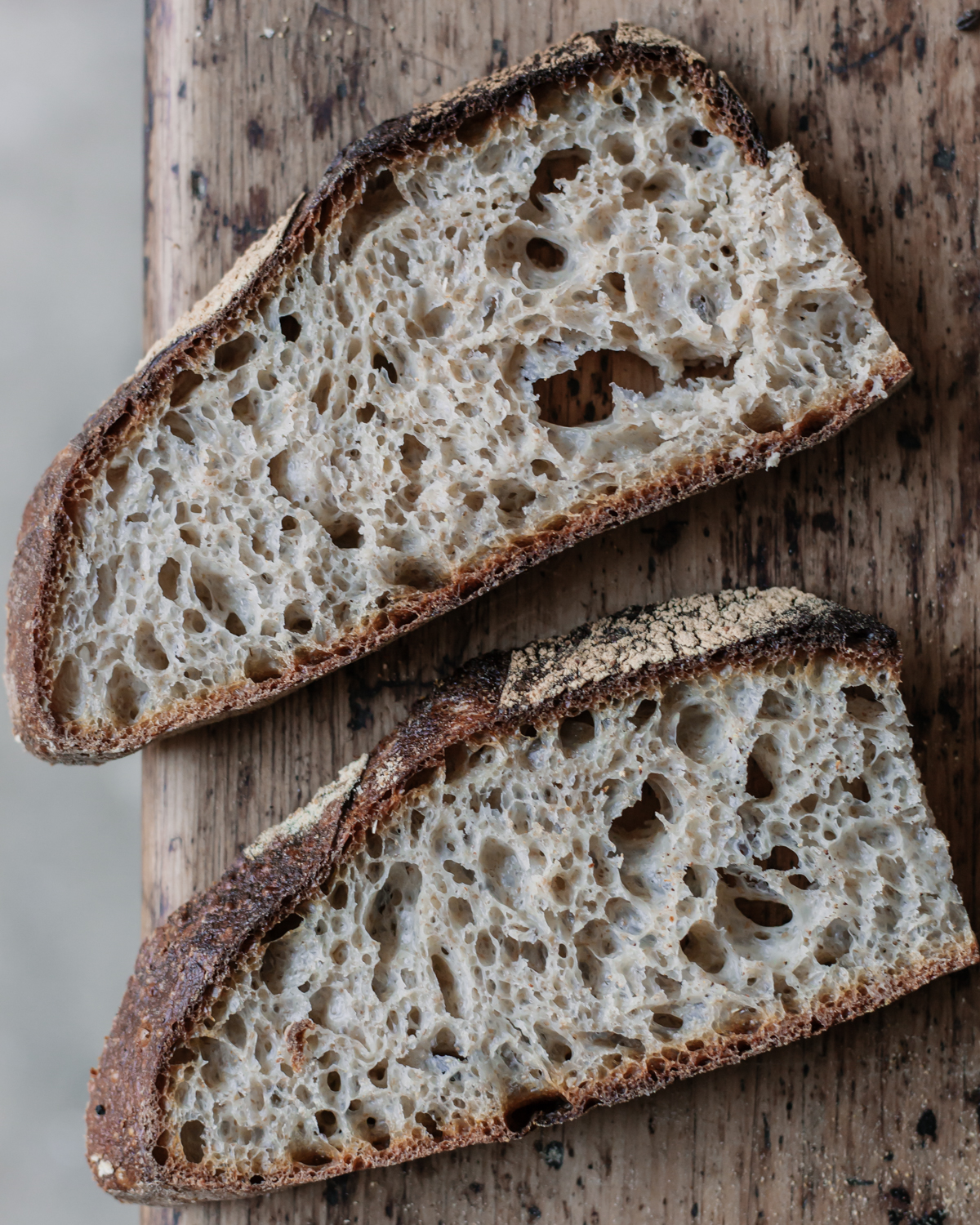
Should you be accepted on the course you be invited to enrol via the standard course booking process in mid September.
Unsuccessful applications are reviewed and deleted after 3 months.
We have limited spaces on our programmes, we therefore ask that in applying below you agree:
-
- Agreed not to accept an award if you cannot fully commit to the programme. We have a limited number of places, so before applying please check out the number of hours required for the course you are applying for.
- You understand that the scholarship programme is for online courses only, and discounts cannot be transferred to in-person courses.
- Understand that scholarships and bursaries are subject to the Sourdough School Terms and Conditions of business.
Can you please explain the Baking As Lifestyle Medicine (BALM) Protocol?
The BALM Protocol is integral to the course taught at The Sourdough School because it addresses the complex system of baking, eating, and sharing bread in a way that promotes health, well-being, and environmental sustainability. It simplifies this complex system by focusing on 7 core principles, which are grounded in evidence-based practices and the 6 pillars of lifestyle medicine.
By teaching the BALM Protocol, The Sourdough School provides students with a gold standard framework for creating and consuming bread that nourishes both the body and the mind while also supporting the environment. This holistic approach to bread-making ensures that students learn how to create bread that can prevent, treat, or modify non-communicable chronic diseases while also empowering positive change at various levels within the food system.
The BALM Protocol can be applied by individuals through prescription courses, by healthcare professionals such as GP's, and by bakeries, as well as used to influence Population Health Management through industrial applications. By teaching the BALM Protocol, The Sourdough School enables students to understand the importance of each component, from using diverse Botanical Blend flours and fermentation techniques to promoting healthy eating habits and reducing the consumption of sugar and ultra-processed foods.
In summary, the BALM Protocol is an essential part of the course taught at The Sourdough School because it provides a comprehensive and evidence-based framework for baking, eating, and sharing bread that benefits physical and mental health and supports environmental sustainability. By learning and implementing the BALM Protocol, students gain the knowledge and skills necessary to create bread that nourishes and empowers positive change within the food system.
USA Resources for recovering from addiction
- Substance Abuse and Mental Health Services Administration (SAMHSA): SAMHSA is a US government agency that provides resources, information, and treatment options for individuals struggling with addiction and mental health issues. Their website offers a wealth of information and a national helpline that operates 24/7. Link: https://www.samhsa.gov/
- National Institute on Drug Abuse (NIDA): NIDA is a US government research institute that focuses on drug abuse and addiction. Their website provides evidence-based information on various substances, addiction science, and treatment approaches. Link: https://www.drugabuse.gov/
- Alcoholics Anonymous (AA): AA is an international mutual aid fellowship that offers a 12-step program for individuals struggling with alcohol addiction. Their website provides information on meetings and resources to help people find support and maintain sobriety. Link: https://www.aa.org/
- Narcotics Anonymous (NA): Similar to AA, NA is a global, community-based organization that offers a 12-step program for individuals struggling with drug addiction. Their website provides information on meetings and resources to help people find support and maintain sobriety. Link: https://www.na.org/
- HelpGuide: HelpGuide is a nonprofit organization that provides evidence-based mental health information and resources. Their website offers a comprehensive guide on addiction, including understanding addiction, recognizing the signs, and finding help. Link: https://www.helpguide.org/home-pages/addictions.htm
UK Resources for recovering from addiction
- NHS: The National Health Service provides information on addiction, treatment options, and support groups available in the UK. Their website offers a comprehensive guide on various types of addiction and how to find help. Link: https://www.nhs.uk/live-well/healthy-body/drug-addiction-getting-help/
- Alcohol Change UK: This organization works to reduce the harm caused by alcohol in the UK. Their website offers resources on alcohol addiction, treatment, and support groups, as well as information on alcohol policy and research. Link: https://alcoholchange.org.uk/
- Action on Addiction: Action on Addiction is a UK-based charity that provides support and treatment for individuals and families affected by addiction. Their website offers information on their programs, research, and resources to help those struggling with addiction. Link: https://www.actiononaddiction.org.uk/
- FRANK: FRANK is a UK government-funded service that provides confidential advice and information about drugs, their effects, and the law. Their website and helpline offer support for individuals who are concerned about their own or someone else's drug use. Link: https://www.talktofrank.com/
- UK SMART Recovery: This organization offers a science-based program to help individuals recover from addiction, including drugs, alcohol, and other behavioural addictions. Their website provides information on meetings, online resources, and tools for recovery. Link: https://www.smartrecovery.org.uk/
Empowerment through Awards
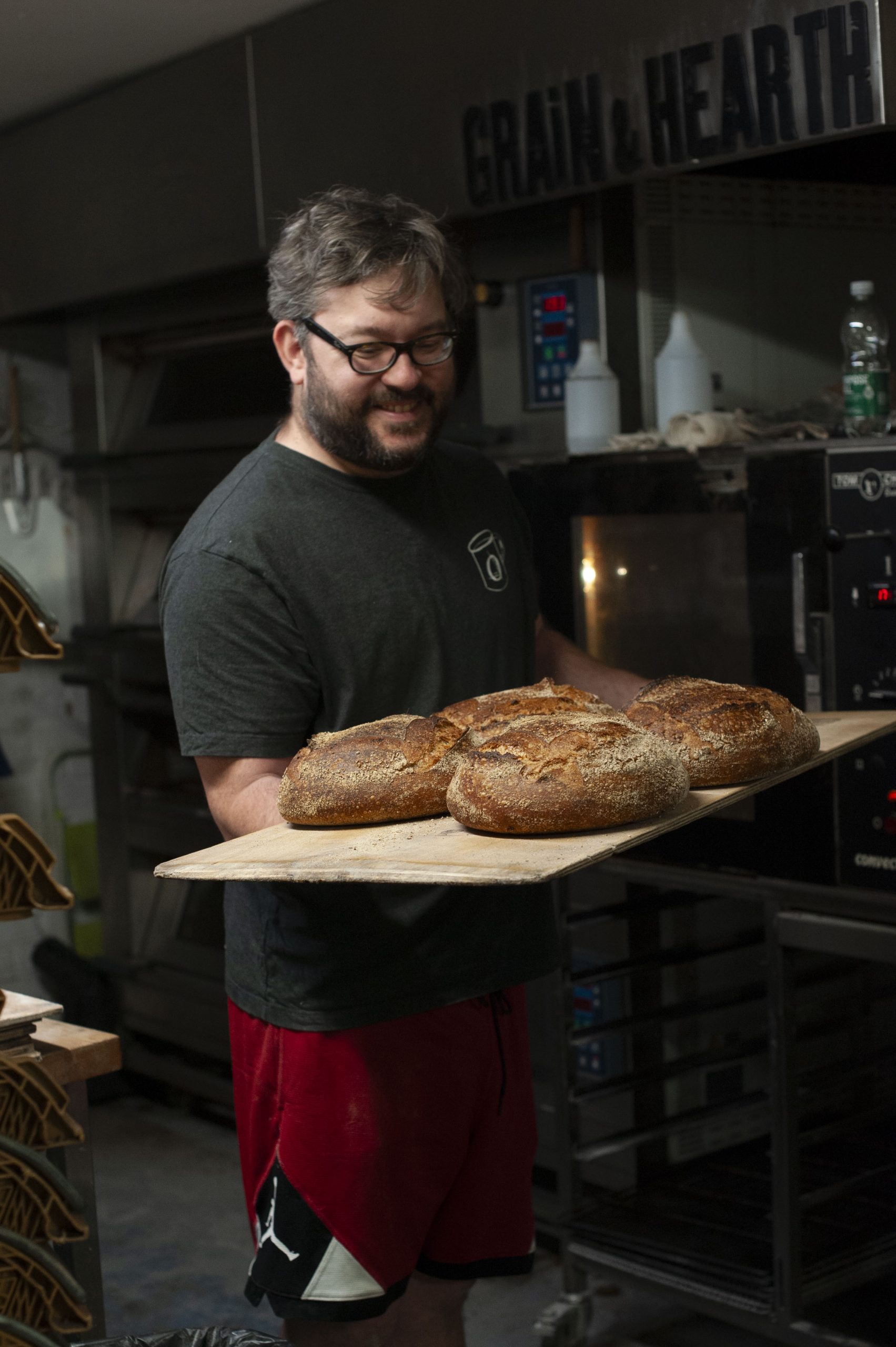
The Sourdough School Diploma is more than a program - what we teach is about empowerment . We are a community and we provide tools and knowledge that enable individuals to take charge of their health and the health of their communities through the simple yet transformative act of baking.
Here's how:
- Self-Efficacy: By teaching participants the art of baking as a form of lifestyle medicine, BALM enhances peoples confidence in their ability to manage their own health and well-being. This can be a powerful motivator and a catalyst for sustained lifestyle changes.
- Knowledge Sharing: The program encourages participants to share their newfound knowledge with their communities, spreading the benefits of great bread far beyond the individual participant. This fosters a sense of purpose and contribution, which can be deeply empowering.
- Community Building: Baking and sharing bread can help create and strengthen social bonds, fostering supportive communities that can collectively work towards better health outcomes.
- System Disruption: BALM empowers participants to challenge and disrupt unhealthy food systems by choosing to bake nutritious bread and sharing these healthier alternatives with others.
Our awards reflect this empowerment ethos. They aren't simply financial aids; they're recognition of the potential within each recipient to create meaningful change. They provide resources to those who may otherwise be unable to access this transformative education due to financial constraints. By removing this barrier, the awards empower recipients to take control of their health, become knowledgeable advocates for healthier lifestyles, and contribute positively to their communities.
In short, our awards which are supported by amazing bakers like Adam Pagor at Grain and Hearth Bakery, are about empowering individuals to become agents of change in their own lives and in their communities, using the power of baking as a catalyst for healthier lifestyles and systems
How does BALM Protocol work?
We take immense pride in our awards, totalling four times our turnover last year, a testament to our dedication to the community.
The BALM (Baking as Lifestyle Medicine) programme offered by The Sourdough School operates as a social enterprise, embodying a living syllabus that is continuously evolving and growing. Shaped by ongoing research, feedback, and lectures and tutorials are delivered by many people. With contributions from a diverse community of experts, the programme offers a unique, multidisciplinary, and evidence-based approach to lifestyle medicine through baking. Our commitment to broadening access to education and promoting inclusivity is demonstrated through our awards programme, providing scholarships and bursaries.
Graduates of our BALM diploma course are empowered with a prescription license.
A prescription licence enables graduates to prescribe BALM vouchers for social prescribing to their patients via The Sourdough Club. This means the benefits of our programme extend beyond the immediate participants, reaching patients and the wider community. - We have given over £75,000 of social prescription memberships from The Sourdough Club.
Through our unique and ever-evolving BALM programme, The Sourdough School is leading the way in demonstrating the transformative potential of baking as a tool for lifestyle medicine. Our commitment to providing accessible, evidence-based education and supporting our students to bring about systems change in their own practice contributes to improved health outcomes and well-being in the community.
Our course delivery is flexible, accommodating various learning preferences and geographic constraints. We offer both in-person and online courses, enabling accessibility and convenience for all participants. The curriculum combines lectures, tutorials, practical baking sessions, and regular live support sessions through The Sourdough Club, ensuring a comprehensive learning experience.
Engaging
What sets the BALM programme apart is its engaging, conversational style, encouraging participants to partake in inspiring conversations that motivate lifestyle changes. This approach ensures that our courses are not just about imparting knowledge but also inspiring action and personal growth.
A critical aspect of our programme is the extensive database of over 700 categorized academic studies available to students as part of their course. This resource allows students to delve deeper into the evidence base supporting the BALM protocol, enhancing their understanding and fostering a greater appreciation for the science of baking and its impact on health.
Contributions to the course from various leading experts in their respective fields add richness to our programme. They bring their wealth of knowledge, real-world experiences, and unique perspectives, creating a dynamic and engaging learning environment. Through this collaborative approach, our programme continually evolves in response to new insights, research findings, and the diverse needs of our students.
How does The Sourdough School company’s activities benefit of the community
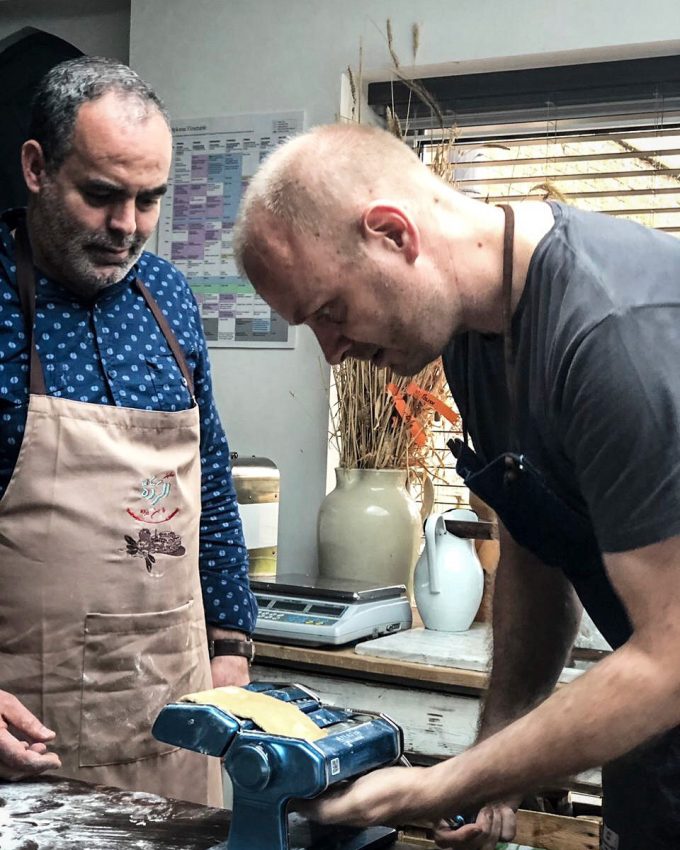 The Sourdough School activities extend far beyond mere baking instruction, sparking systemic change that benefits the community and public health at large. Our programmes facilitate the diffusion of health-enhancing practices throughout the community, promoting wellness, fostering social connection, and uplifting local agriculture.
The Sourdough School activities extend far beyond mere baking instruction, sparking systemic change that benefits the community and public health at large. Our programmes facilitate the diffusion of health-enhancing practices throughout the community, promoting wellness, fostering social connection, and uplifting local agriculture.
A key foundation of our work is the robust evidence base underlying Baking as Lifestyle Medicine (BALM). Our dietary intervention studies have consistently shown the positive impacts of our approach on health outcomes. Participants who followed our BALM regimen experienced meaningful improvements in gut microbiome diversity, increased dietary fibre intake, and reported lower levels of constipation and bloating. Notably, they also reported better sleep and significant enhancements in mental health scores. These findings are scientifically compelling and serve as powerful testimonies to the transformative potential of BALM on individuals' health and well-being.
Furthermore, baking can serve as a profoundly empowering and connecting activity. It is an affordable source of nutrition that offers therapeutic benefits, instils a sense of purpose, and fosters community connection. The 'bake two, share one principle encourages individuals to actively contribute to the health of their community, thereby reducing social isolation and fostering a stronger sense of communal support and belonging.
Our focus on regenerative agriculture and local sourcing further amplifies the benefits to the community. By championing these practices, we support local farmers and biodiversity and contribute to the larger movement toward sustainable food systems. Using local, high-quality, and sustainable ingredients benefits all stages of the food chain, from the soil to the consumer, leading to healthier ecosystems and healthier people.
For healthcare professionals and the National Health Service (NHS), the empowerment model of BALM presents an innovative approach to wellness that goes beyond traditional medicine. It presents a proactive, preventive health strategy, potentially reducing strain on healthcare resources by promoting long-term health through diet and lifestyle change.
Which Applicants do we award Scholarships and Bursaries to?
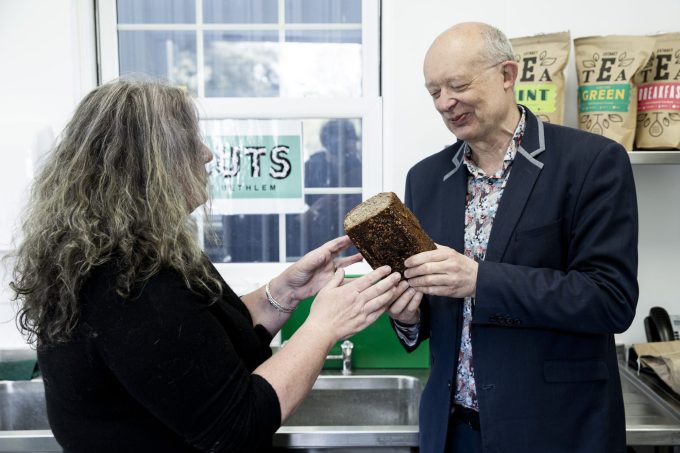
If you are applying for an award, then it is useful to understand that the programme seeks applicants who can use the BALM principles to create a significant impact. Whether you come from the healthcare sector, industrial baking, or a baker in the local community. The focus is on empowering individuals to make a tangible difference in public health outcomes through the transformative power of baking as lifestyle medicine.
The most suitable AWARD applicants would be those who can demonstrate the following:
- You have the capacity to Influence Health Outcomes: The ideal award recipient would have a platform or position that enables them to directly influence health outcomes on a significant scale. This might include professionals such as healthcare practitioners, dieticians, GPs, oncologists, and other medical professionals or social prescribers who have the ability to implement and prescribe the BALM framework within their practice.
- Bakers and Bakery Operators: Bakers who own, manage, or work in a bakery - from a small community bakery to a large industrial bakery - all professional bakers are excellent candidates. They have the potential to apply the BALM principles in their practice, transforming the production and delivery of bread on a public health scale.
- Potential for Systems Change: Those who can articulate a clear plan for how they will utilize the BALM framework and prescription license to affect systems change within their sphere of influence. GP surgeries, Applicants should detail how the AWARD will help them introduce BALM principles into their work, alter existing practices, and promote healthier outcomes in their communities.
- Commitment to the Community: Applicants who show a clear commitment to enhancing their community's health and well-being. They should demonstrate a willingness to go beyond their immediate responsibilities and use the BALM framework to improve their communities' health outcomes.
- Alignment with BALM Values: The ideal candidates are those who align with the core values of the BALM programme. This includes a commitment to evidence-based practice, an emphasis on regenerative agriculture, a dedication to promoting gut health and environmental diversity, and a belief in baking as a tool for systems change.
Home bakers who wish to learn baking as a lifestyle medicine are encouraged to apply for a social discount to The Sourdough Club membership. While they may not have the same scale of influence as those in the healthcare sector or industrial baking, their passion for baking and commitment to improving their own and their family's health aligns with the values of BALM.
What is BALM?
Baking as Lifestyle Medicine (BALM) is evidence-based.

A Holistic Approach
Baking as Lifestyle Medicine (BALM) focuses on improving gut health, mental well-being, and overall health by adopting specific dietary and lifestyle changes.
The first principle is lifestyle changes, and the protocol is underpinned by the six pillars of Lifestyle Medicine.
Each principle has been meticulously researched and applied to the recipes in the Sourdough School books, the Sourdough Club, the Diploma and the Certificate. We have a fully catalogued date base with over 700 + references that we use throughout our work.
Increase fibre: baking using high-fibre ingredients, such as whole grains, seeds, and nuts, can significantly improve gut microbiome health. This, in turn, can support overall health and wellness. Incorporating fibre-rich ingredients in your baked goods is a practical and delicious way to increase daily fibre intake.
Increase diversity: the BALM approach emphasises using a wide variety of plant-based ingredients in your baking to promote a diverse gut microbiome. By incorporating different grains, seeds, fruits, and other plant-based ingredients, you can create nutrient-dense baked goods that contribute to overall gut health and well-being.
Ferment: sourdough baking, which involves a natural fermentation process, increases the bioavailability of key nutrients and reduces the gluten load. This process can improve nutrient absorption and enhance the health benefits of baked goods.
Increase levels of antioxidants: using diverse blends of grains and incorporating antioxidant-rich ingredients such as green tea, cocoa nibs, and herbs in your baking can significantly increase the antioxidant content of your baked goods. Antioxidants are essential for combating inflammation and promoting overall health.
Increase probiotics alongside your bakes: incorporating probiotics in your diet, along with your fibre-rich and diverse baked goods, can improve gut health and support mental well-being. Consuming fermented foods like live syrups, vinegars, sourdough fizz, sauerkraut, and cultured butter, can promote the growth of beneficial gut bacteria and positively impact mood and stress resilience.
Reduce refined sugar: reducing refined sugar intake can help decrease inflammation and improve overall health. By choosing healthier sweeteners and limiting the use of refined sugar in your baking, you can create delicious baked goods that contribute to overall well-being and adhere to the principles of the BALM Protocol.
Baking as Lifestyle Medicine BALM Protocol by focusing on increasing fibre and diversity, fermenting ingredients, enhancing antioxidant levels, incorporating probiotics, and reducing refined sugar. When applied to baking, these principles can transform how we nourish our bodies and minds, ultimately promoting overall health and well-being.
An explanation of why we have an NDA
Please note that we have a separate agreement on photography that explicitly covers the legal aspect of photography; however, as part of this NDA, we protect the confidentiality of the other students who attend the class. We encourage students to share their personal insights about what impacts their digestion and the way they feel about baking, and this can be something personal or medical, so we ask that students respect the confidentiality of other students in the courses. In this agreement, we also ask that you agree to be mindful of some of Vanessa's work. She will be very clear verbally that the technique or recipe is not yet public knowledge.
These might be techniques and know-how of things that she is working on. For example, you might be learning about recipes that will be in a forthcoming book or details about the research that has yet to be published. You might like to share things that are unfinished or still under development. Vanessa makes it clear when things are not to be discussed, but over the years, we have run into problems when Vanessa is working on something. Students have ( out of delight and enthusiasm) shared recipes that are destined for a book or a technique not yet common knowledge.
This means a breach of confidentiality or knowledge of something that is under embargo, and it means that her work is compromised. If a recipe is " leaked" from a forthcoming book, it is removed from the publication - as all work has to be original. We, therefore, ask that you agree to a non-disclosure agreement. This way, it allows Vanessa to teach you all the things she knows openly, even unpublished work .. this means you can learn about recipes, test recipes, and learn the techniques for things that are under development and do not accidentally contradict agreements that Vanessa has from publishers or sponsors. Essentially if you want to share a recipe or a photo of a formula not in a book, please check with Vanessa first and respect the privacy of other students.
What if I do not want to agree to an NDA?
Agreeing to this Non-Disclosure Agreement (NDA) is a necessary prerequisite for joining our courses. If you have any hesitations or questions about agreeing to this NDA, we would be more than happy to discuss this with you. Our primary duty is to ensure the safety and protection of all our students and staff, and as such, we cannot invite individuals to join a course unless they have agreed to this NDA. Please understand that these measures are in place to create a secure and productive learning environment for everyone involved.
Is BALM Clinically Proven?
Social prescribing, including integrating Baking as Lifestyle Medicine (BALM), has shown promising results in improving health and well-being outcomes. Our case studies have demonstrated improvements in quality of life, emotional well-being, mental and general well-being, and significantly reduced levels of depression and anxiety. We've been teaching for over two decades, and while so many positive outcomes have been reported, we're the first to admit that our studies are modest and small-scale. However, the changes we saw in the gut microbiome of our participants were significant and reflected positive outcomes.
What should I do if I get overwhelmed
You can always talk to Vanessa. She is pretty understanding and we recognise that life can present unexpected challenges and commitments. Unlike traditional educational institutions, we offer a degree of flexibility to accommodate our students during such times.
If a student experiences unforeseen life events that prevent them from fulfilling their commitments under this course, they are encouraged to communicate with us as soon as possible. We'll endeavour to find a suitable solution, which may include deferring the student's responsibilities to the following academic year. This flexibility allows the student to continue their learning journey with BALM without unnecessary pressure or stress.
However, it's important to note that while we strive to be accommodating, any adjustments made are at the sole discretion of BALM and The Sourdough School Ltd, and certain conditions may apply.
How do I graduate?
To graduate, you will need to create a recipe that demonstrates that you have been able to understand and apply all the principles of the Bread Protocol. Please see the task guidance before you submit your recipe.
Adding your studies is essential.
Please make sure that before you log in to add your recipe
Go to the research library and make a list of the hyperlinks and the number of studies you have used to develop this recipe.
Keep this list to hand so you add the details in the form below.
Please note that you must submit on one sitting. We are not able to save this entry to come back to, so make sure that you have all the information that you need filled in on your worksheet and study hyperlinks BEFORE you begin your data entry.
Do remember that you need to book your graduation interview with Vanessa here. https://calendly.com/sourdoughschool/interview
What do I need to do to graduate?
Rising to the Challenge - you will need to create a BALM recipe
Our graduation process is a radical departure from traditional learning and assessment methods, placing a strong emphasis on practical application, sharing, community, and continuous learning.
It has been designed to be a learning experience for individual students but also creates a ripple effect of knowledge and healthy practices within the wider community. We ask you to create and share a BALM recipe which on graduation is published on your graduation page.
. In most traditional educational settings, the knowledge acquired is tested via exams, after which the exam paper is essentially discarded. The student proves their understanding but doesn't contribute anything tangible or reusable to the learning community. By contrast, creating and sharing a recipe is a unique way of demonstrating one's learning while also contributing to the community.
What is important is that this recipe can be used, enjoyed, and learned from by others, fostering a more communal and contributory spirit of learning.
The recipe it requires real life application of the principles of BALM, and students must demonstrate they can take the principles they've learned and create something practical and useful. This encourages a deeper level of understanding and engagement with the material
What are the Graduation Steps
The ultimate outcome of this process is not only a validation of your learning but also a recipe that embodies the principles of BALM and can be shared with others. This approach allows for a more thorough assessment of your understanding and practical application of the course material, fostering an environment of shared learning and community building.
- Complete the Community Recipe Worksheet: This involves recording all the relevant information and cited studies necessary to create your unique recipe.
- Submit the Recipe: Once the worksheet is completed, you should submit your recipe for review. This involves following strict guidelines to ensure adherence to the principles of BALM. Some key points to remember include:
- Hyperlinking terms using the provided glossary.
- Stating the relevance of your recipe to the six pillars of Lifestyle Medicine.
- Ensuring your recipe produces two servings (Bake 2, Give 1).
- Highlighting who would benefit from your recipe, considering social and digestive aspects.
- Recommending a point in your recipe for movement, such as walking or dancing, and using the opportunity to exercise as a functional movement.
- Suggestions of symbiotic recipes.
- Detailing and explaining your chosen fermentation methods and timings.
- Referencing at least seven studies from the research library.
- Graduation Appointment: After submission, you should schedule an appointment with your instructor to discuss the recipe and proceed with graduation.
- Provide Feedback: Filling out the feedback form helps the program understand the community's experiences and needs better. It contributes to improvements in services, resources, and content.
- Stay as an Alumni: Post-graduation, you have the opportunity to continue accessing course materials and attend live baking sessions for a monthly fee.
If you are already a student, then click here to follow the graduation steps.
What if I live abroad and can’t buy Botanical Blend Flour?
If want to bake according to the BALM protocol but you can't access the flour here in the the UK do not despair!
We encourage people to connect locally and for home bakers to consider buying a mill. Of corse we appreciate that not everyone can afford mill, of course. Mills are not inexpensive, but if you are able to purchase one, they are a superb investment. If you are lucky enough to have people who buy you gifts for special occasions, I would encourage you to ask your friends and family to contribute towards one as a collaborative gift.
However we also teach people how make up a Botanical Blend without a mill – here's how.
What if someone does not want to use a Botanical Blend?
Just to be totally clear, you don't have to use a Botanical Blend. You can use a good-quality, shop-bought stoneground flour in place of any of the Botanical Blends used in our BALM recipes (with the exception of Blend No. 10, which is a bean flour and behaves differently).
We don't force people to bake with botanical blend flour. It might be that pole are just starting to bake, and making such a radical change is too much early on in their journey towards learning to bake sourdough. Don't worry – I am not going to turn up in your kitchen and tell you off for not wanting to use a Botanical Blend in your bread! However, learning to bake as lifestyle medicine is about reevaluating your approach to your bread. It's my belief that redefining flour is integral to the process of creating breads that nourish the gut microbiome, so I hope you will consider this approach.
Castello di Potentino Background
Graduation week at Castello di Potentino is exciting, and in this video, Charlotte Horton gives us some of the the context of connecting to baking as lifestyle medicine at the Castle:
- Historical Connection: The ancient castle is built on an Etruscan site, providing a rich historical background. This connection to the past can foster a deeper understanding of traditional practices, including those related to food and medicine. Baking as a form of lifestyle medicine can be explored through the lens of history and cultural heritage.
- Connection to the Earth: The description emphasizes the castle's location in unspoiled countryside, surrounded by vines and ancient olive trees. These elements provide a tangible connection to the land and agriculture, reinforcing the idea of food as a source of nourishment and healing. The growth of quality ingredients like wine and olive oil links directly to a philosophy of well-being and sustainable living.
- Dynamic Cultural Center: As a place that operates as a cultural centre, Castello di Potentino is an intersection of art, history, and community. This creates an enriched environment for exploring baking in a broader cultural and social context, enabling your students to see how it intertwines with various aspects of life.
- Sustainability and Ethos: The emphasis on sustainability and the specific ethos of the castle about how we inhabit a place can translate into a more mindful approach to baking. Understanding the source of ingredients and how they are produced can promote a deeper appreciation for the food we consume. It's a hands-on approach to lifestyle medicine that embraces the entire process, from farm to table.
- Ideal Venue: The mention of it being an off-season travel venue that hosts events and weddings suggests that it is equipped to accommodate guests in a comfortable and engaging setting. The quality of the surroundings and the services available would surely make the graduation week a memorable and enriching experience.
- Combining Pleasure and Health: The castle's production of high-quality wine, grappa, and oil resonates with the concept of enjoying life while being mindful of health and well-being. Baking, especially when done with quality ingredients and mindful practices, can be an act of pleasure and nourishment for both the body and soul.
- Inspiring Environment: Finally, the sheer beauty and unique character of the location would undoubtedly inspire creativity and reflection. The connection between mind and body is central to the idea of lifestyle medicine, and a beautiful, peaceful setting like this can foster that connection in profound ways.
In summary, Castello di Potentino's historical significance, connection to nature, focus on sustainability, and beautiful setting creates a perfect backdrop for exploring baking as a form of lifestyle medicine. It’s a multi-faceted experience that transcends mere culinary practice, reaching into history, culture, and personal well-being. No wonder we are excited about the Graduation week there.
Top Tips For Your Stay At The Castle
Do you Provide A Shuttle Service To The Castle?
Is There Free WiFi At The Castle?
What Are The Amenities I Can Expect At The Castle?
Is Tea & Coffee Available In The Middle Of The Night?
What Type Of Food Can I Expect At The Castle?
Do You Accommodate For Dietary Restrictions?
How Does The Food Work At The Castle?
Is There A Dress Code At Supper?
What Is the Weather Like In Italy During The Course?
Can I Bring My Partner With Me To The Course?
What Activities Can My Partner Participate in While I Am On The Course?
Is It Possible To Have A Guided Tour Of The Castle?
What Are The Health & Safety Policies At The Castle?
Is The Castle Wheelchair Accessible?
What Are The Rules & Guidelines Regarding The Swimming Pool?
What Is The Castle Cancellation Policy?
Looking after user issues and technical queries
The Prospectus
Will There Be Any New Books Or Publications Coming Out And How Can I Get Them?
Why Is The One Week Starter Course Tuition Free And What Does It Include?
Why Do You Invite Students To Attend?
Why Can’t You Arrange Lifts Between Students?
Who Are The Sourdough School Team And How Do I Contact Them?
Where Can I Find Information About The 3 Licenses?
What Is The Difference Between A Workshop & A Retreat?
What Support Is Available If I Have Food Allergies Or Dietary Restrictions?
What Should I Bring With Me To The Course?
What Safety Measures And Protocol Do I Need To Be Aware Of In The Schools Kitchen?
What Safety Measures And Protocol Do I Need To Be Aware Of In The Schools Kitchen?
What Is My Weekly Schedule Like For My Course?
What Is A Social Enterprise And Why Do You Run As One?
What Extracurricular Activities & Clubs Can I Join While Doing The Course?
What Can I Do If My Bakes Aren’t Working Out As I’d Hoped?
What Are The Live Sessions And How Do I Participate In Them?
What Are The Housing Options For Students, How Do I Arrange Accommodation?
What Are The Expectations For The One Week Starter Course In Tuscany?
What Are The Career Prospects Or Further Opportunities After I’ve Completed My Course?
What Is A Systems Change Program?
Is There Any Prereading Or Preparation Required Before Starting The Course?
How Many Hours Are On The Course And Why Can I See 600 Hours In The Libraries?
How Long Are The Courses?
How Do I Obtain My Certificate Or Proof Of Completion After My Course?
How Do I Communicate With My Instructors And The Sourdough Team?
How Do I Access Course Materials & Syllabus Prior To The Course?
How Can I Stay Connected To The Sourdough School Through Its Alumni Network?
How Can I Apply For A Bursary?
Do You Have A Shop For Equipment?
Do The Books Go With The Course, How Do I Access Them?
Do I Need To Bring My Own Baking Tools Or Equipment To The School?
Can You Send Botanical Blend Flour Abroad?
Can My Family Come With Me To The Tuscany Starter Course?
Can My Family Attend The Course With Me In The UK?
Can I Tour The Facilities Before The Course Starts?
Are There Study Areas And Libraries Specialised In Culinary Arts I Can Use?
Where Is The Sourdough School Based And How Do I Get There?
What If I Do Not Want To Go Swimming Or Cycling On A Retreat?
Is There A student Support System Or Community I Can Join During The Course?
Dr Davidson Explains The BALM Protocol is about Engaging Patients In A Systems Change Programme In Which They Play A Key Part
How Does BALM Protocol Support Behavioural Change?
Can You Describe The Community Of The Club?
Why do people choose to learn to bake through the Sourdough Club?
Dr Davidson explains how keeping a food diary and a list of symptoms can help your GP diagnose your digestive issues
Why Doesn’t My Health Care Practitioner know about Gut Health Already
Why Does How We Bake Eat And share Bread Matter So Much To Our Health
Dr Alex Davidson explains how BALM protocol validated and how it is used.
Dr Davidson advice to members on what your GP needs to consider when you discuss digestive issues with your GP
=
What Things Could you Ask your Doctor about when You Have a Digestive Issue
How we work with healthcare practitioners and what a holistic approach means.
What Are The Symptoms That Must Not Be Ignored
Why Baking as Lifestyle Medicine is the same approach that we have see in the Mediterranean and in particular the Blue Zone
How prescribing by gifting a voucher as a social prescription ensures patient confidentiality.
Dr Davidson’s advice: Trust Your Gut
Dr Davidson explains more about the bestselling Sourdough School Books and how they compliment Club Membership
Dr Davidson explaining how the Self Assessment form is part of the clinical BALM Prescribing protocol.
The Prescription Checklist is a helpful list of reminders for patient suitability & prompts to help you prescribe effectively
Dr Davidson explains how she works with you specific diagnosis in small focused group sessions?
After a spell of avoiding gluten this is how we set patients up for success reintroducing gluten
Section Header Non Clinical Social Prescribing License
Section Header Clinical Prescribing License
Please Pre Submit Your Questions To Dr Davidson For Your Live Sessions
Dr Davidson explains the clinical license commission structure and the 3 options available that best suit your practice
Dr Davidson explains our approach to gluten avoidance.
Dr Davidson Explains The Evidence Available To Clinicians About How The Gut Is Central To Physical And Mental Health
As Part Of The Diploma You Will Learn About The Mechanisms OfFermentation And How This Can Help With Many Conditions Such As IBS
Dr Davidson Explains How To Get Involved As A Clinician By Finding Out More With A Sourdough Prospectus
Dr Davidson Explains How The Self Assessment Form Allows Clinicians To See How Their Patients Have Benefited From A Prescription
Dr Davidson Explains How Club Members Benefit From The Sourdough School
Dr Davidson On How BALM Protocol Gives you a Framework for Life And How This Mirrors The Lifestyle Of People In The Blue Zone
Dr Davidson Explains How At The Sourdough School We Teach People To Manipulate The Gluten In Their Bread For Health
For Further Questions Don’t Hesitate To Get In Touch
Food Diary Section Header
Dr Davidson On How Baking Sourdough Is Practical for Patients and Clinicians With Busy Lives Using The 1 Minute Technique
Dr Davidson Explaining A Few Of The Things People Find Enjoyable About Being A Member Of The Sourdough Club
Section You Will Find Information On Digestion, Symptoms, NHS Alternatives And Resources To Work With Your Healthcare Practitioner
Course Options For BALM Clinicians: fast track 3 day workshop to socially prescribe, and The Diploma to clinically prescribe
How The Corporate Membership Can Build A Community And Culture Within Your Business Around BALM Protocol
Dr Davidson on BALM potentially preventing celiac disease and we do not teach patients who have a diagnosis of celiac disease.
Helpful Tips and Tool To Work With Your Healthcare Provider As A Sourdough Club Member
The Fucked Up Bread Library
Understanding The Syllabus
The Forum
Graduation
Enrolment
Please Ask Any Questions In The Live Sessions
Communications Procedure
Will Introduction
Understanding The Purpose Of The Live Sessions
Symbiotic Eating Section Header
Precourse Syllabus
Health And Safety For Teachers
Diversity Bread
Who are the BALM Systems Change Contributors
The Contributors to the Diploma
In addition to the in-house team of Lifestyle Medicine health experts and bakers, we have many contributors who generously give their expertise. We operate as a social enterprise, and this is a key difference in the way that we deliver the program. It is transdisciplinary and interdisciplinary in its nature.
Each part of the syllabus on both the clinical module of the Baking as Lifestyle Medicine (BALM) Diploma and The Baking Certificate is supported by esteemed individuals teaching their area of expertise.
This incredible generosity brings unique insights and expertise from many esteemed guest contributors, who have provided knowledge, lectures, conversations, and research and have supported the change as part of the social activism and systems change program. Our Community Spans across many disciplines. All our contributors believe in sharing knowledge of supporting physical and mental health and the environment, which is key to a sustainable and equitable future. You can see the full contributor list here.
Student Handbook
Understanding The Syllabus
Welcome To The Sourdough Club
IBS
Core Knowledge Library
Blue Zone Baking
BALM Bake for Health Module
Baking For Connection – Retarded Boules
Baking For Connection – Ambient Boules
Pizza For Mental Health
Teaching Sourdough Starters
The Potential Health Benefits Of Fermentation
Quick Tips For Bacteria Yeast polyphenols and scientific terms
How To Introduce BALM
How To Use Lunch As A Lesson
Breaking Down The Gluten
Teach The Teachers Q&A
How To Prioritise What Parts Of Balm You Teach In Your Short Course
How To Help All Your Students Keep Up With The Class On Short Courses
Is the certificate is the pre qualification to apply for the BALM teaching licence?
Yes. Our relationship with our graduates goes beyond just getting a qualification. The licences offer continued support to our graduates.The certificate is the pre qualification to apply for the BALM teaching licence.
How long Does The Certificate Course Take?
The BALM Certificate is a comprehensive 2 year programme teaching every practical aspect of Baking as Lifestyle Medicine. It is made up of a baking and task syllabus with weekly lessons, lectures and baking tasks to build your skills and knowledge with regular weekly live guidance sessions.
.
Why do You have 3 options on the Certificate?
- Online Only - Graduation is completed online
- Online as above + a 5 day workshop in Tuscany.
- Online as above with a 4 day workshop at The Sourdough School in the UK
What Can I expect from the Certificate Baking ?
The Certificate encompasses a new Teaching Module alongside the Baking Module.
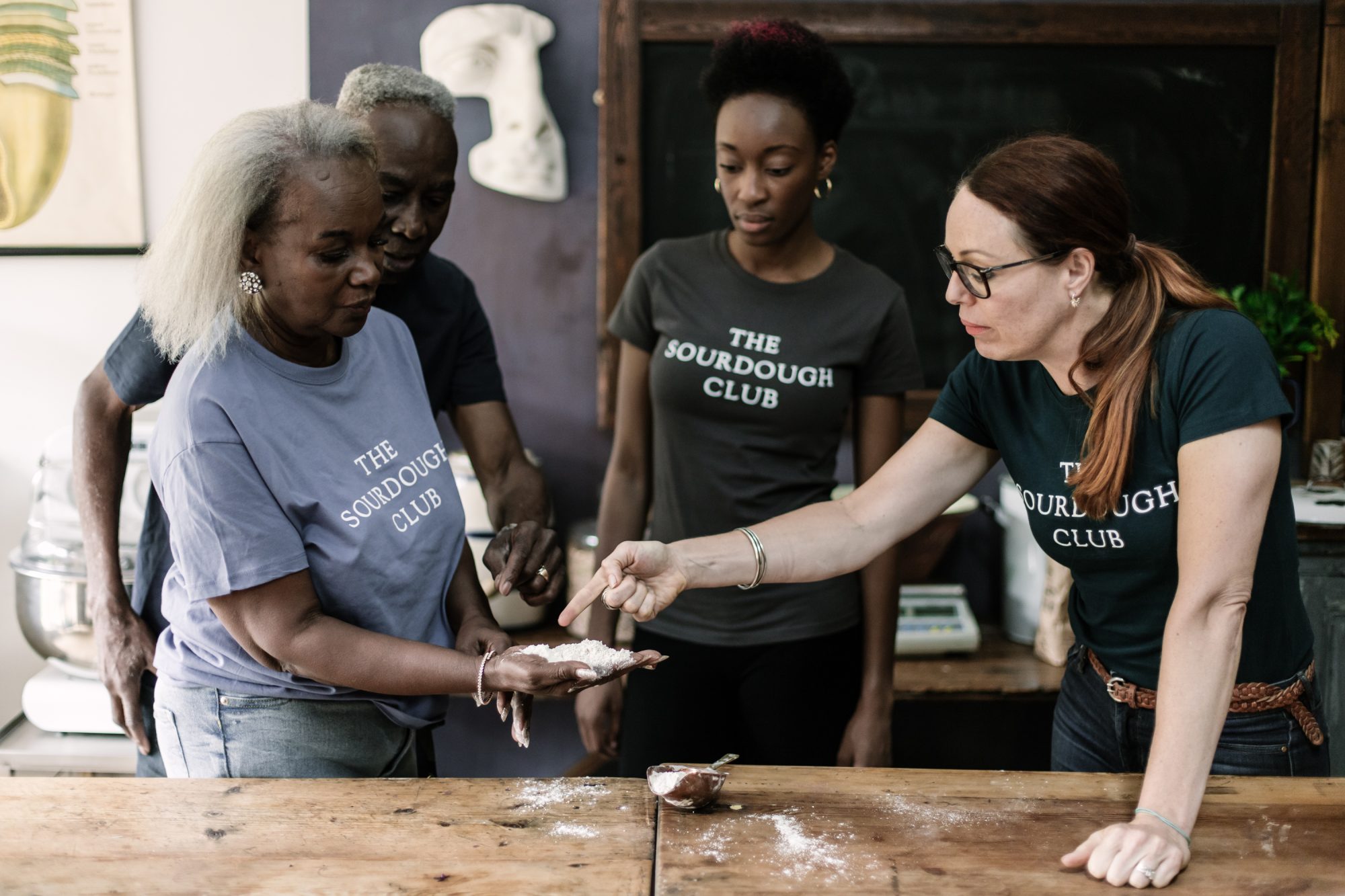
- Skill Building: You'll bring your existing skills to the table and develop them further, learning to bake in a way that's both nourishing and joyful.
- Enhancing Lives: The focus is on baking as a means to improve health and well-being. You'll learn how to share this knowledge with others, transforming simple ingredients into something that can genuinely enrich lives.
- Structured Teaching Approach: If you decide to teach, we'll support you with a structured methodology that makes teaching a joy. You'll learn how to combine your knowledge, experience and passion in an engaging and effective way using bread.
- Community Focus: As part of this program, you'll join a community of like-minded individuals. It's a network of support and collaboration where you can share ideas and learn from others who are equally committed to using baking as a force for good.
- Empowerment Through Teaching: Graduates of the program have the opportunity to obtain the TEACHING BALM License, enabling them to inspire others and spread the joy of baking further.
- A World-Changing Mission: This isn't just a course; it's a movement. By embracing the principles of BALM, you're joining a mission to make a positive impact on the world through the time-honoured craft of baking.
This Certificate in BALM is for those who see baking as more than a hobby. It's for those who want to share their knowledge, support others, and be part of a community that believes in the power of baking to change lives. Join us on this journey and be part of something truly special.
Monthly fees
ONLY when you enroll in The Dipoma you will pay a monthly fee provides a comprehensive package, but it's important to note that access to certain features, including our extensive libraries, is ONLY granted to Diploma Level students and only after completing the registration process and and consultation. Here's a detailed overview:
- Registration Consultation: Before gaining access to the full range of resources, you must complete the registration and go through a consultation process. This step ensures that all our students are well-suited for the programme and can fully benefit from what we offer.
- Access to Extensive Libraries (Post-Interview): After completing the registration and interview, you will gain access to our extensive libraries. These libraries have tutorials, in-depth studies, and various materials to enhance your sourdough baking skills.
- Dedicated Support Services: The monthly fee includes access to dedicated support services, ensuring that you receive the necessary assistance and guidance throughout your learning journey.
- Participation in Live Sessions: Your fee also covers participation in our live sessions. These sessions are crucial for real-time learning, allowing you to engage directly with instructors and fellow students.
- Continuous Learning Opportunities: Beyond the core syllabus, your fee provides ongoing access to a wide range of tutorials and resources, enabling you to learn at your own pace and deepen your understanding of sourdough baking.
- Forum Access: As part of the programme, you will have access to our community forum. This platform is a great way to connect with peers, share experiences, and gain insights from the sourdough baking community.
- Personal Guidance from Dr Vanessa Kimbell: The fee includes the opportunity to receive personalised guidance from Vanessa Kimbell. Her expertise and insights are invaluable to the programme and will aid greatly in your sourdough baking journey.
Please remember, your full engagement with the course materials and resources begins after the completion of the registration and interview process. We're here to support you every step of the way and look forward to welcoming you to our community. If you have any further questions, do not hesitate to reach out to our support team.
Please note that while full access to the course syllabus is granted in the third week of September, your learning can begin immediately upon registration and enrolment through the use of our libraries and participation in live sessions.
We believe this structure provides a balanced and thorough approach to learning, enabling you to make the most of your educational experience with The Sourdough School. If you have any questions or require further clarification, please do not hesitate to contact our support team.
We look forward to supporting you on your sourdough baking journey
What recipes will I learn to bake on the Diploma?
The Diploma takes you from not knowing how to bake to baking boules. Over the course you will bake many recipes but these are some of the bakes you can expect to learn:
- Simple 10-Minute Tin Loaves: These are likely to be basic recipes designed for ease and efficiency, suitable for beginners or those with limited time.
- Heritage Grain Breads (like Emma Spelt Tin Loaves): Recipes using ancient or traditional grains, such as spelt, which are known for their distinct flavors and nutritional profiles.
- Sourdough Pastries: This could include a variety of pastries made with sourdough starter, adding a unique flavor and texture compared to traditional yeast-based pastries.
- Sweet Recipes (like Cakes): These are likely to explore the use of sourdough in sweet bakes, a less common but intriguing application of sourdough fermentation.
- Creative Uses of Leftover Sourdough Starter: This category could include recipes for pancakes, waffles, and muffins, utilising excess sourdough starter that might otherwise be discarded.
- French-Style Ambient Techniques (e.g., Beetroot and Feta Bread): Recipes that involve ambient (room temperature) fermentation, possibly with unique ingredient combinations like beetroot and feta.
- Retarded Techniques for Mid and High Hydration San Francisco-Style Overnight Loaves: Advanced sourdough bread techniques that involve longer fermentation times, typically resulting in a more complex flavor profile.
- Baguettes: The classic French bread, likely with a sourdough twist.
- Brioche: A rich, soft bread typically made with a high proportion of eggs and butter, adapted here for sourdough preparation.
- Cinnamon Rolls: A sweet, rolled pastry, usually with a cinnamon filling, adapted for sourdough baking.
- Pocket Breads: These could include varieties like pita or other flatbreads that puff up to create a pocket.
- Panettone Course: A traditional Italian Christmas bread, rich in eggs, dried fruits, and citrus zest, adapted for sourdough baking.
- Pizza Recipes: Diverse approaches to sourdough pizza crusts, likely exploring different toppings and styles.
- Focaccias: An Italian flatbread, often topped with herbs and olive oil, made here with a sourdough base.
- French Regional Breads: A category that could include a variety of breads specific to different regions of France, each with its unique sourdough interpretation.
These tested and photographed recipes represent a broad and diverse range of sourdough baking, from the simple to the complex, and from the savoury to the sweet. They offer students a comprehensive experience in sourdough baking, covering a wide spectrum of techniques and styles
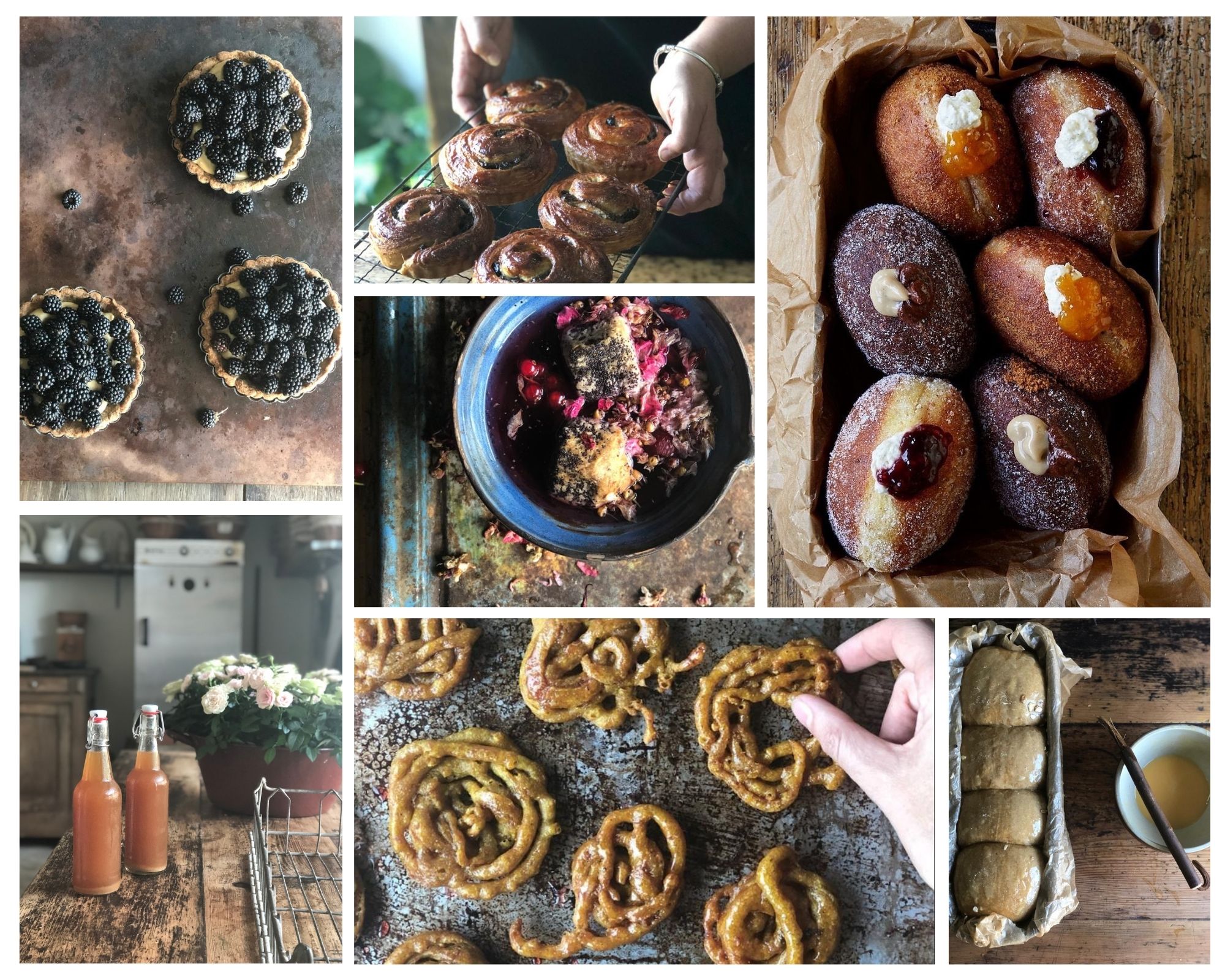
What makes the ‘Personalised Bread Nutrition & Wellness’ program unique compared to other nutritional programs?
How does understanding one’s genetic makeup influence the type of bread and diet recommended in the program?
Can you explain more about the DNA testing with Lifecode Gx® and how it integrates into the program?
Who is this program ideally suited for? Are there specific health conditions or dietary preferences that benefit most from this approach?
What are the key health benefits of participating in this program, particularly regarding gut health and overall wellness?
Could you give an example of how a personalized bread recipe might differ based on an individual’s genetic report?
How does the program accommodate people with specific dietary restrictions or allergies, such as gluten intolerance?
What can participants expect from the 3-day Bread Nutrition Workshop, and how is it structured to cater to individual needs?
Can you detail the follow-up support offered after the workshop? How do the additional feedback sessions and alumni membership enhance the experience?
How do the pricing and packages work, and what is included in the cost? Are there any additional fees participants should be aware of?
For someone new to baking or nutrition, how approachable is this program? Does it require any prior knowledge or skills?
What kind of ongoing support and resources are available to participants after they complete the program?
How does the program align with current scientific research and findings in nutrition and gut health?
Can you share a success story or a testimonial from someone who has completed the program?
What steps do you recommend for someone interested in starting this program? What should be their first course of action?
How does the program take into account individual lifestyle factors, such as physical activity levels or stress, in its dietary recommendations?
What are the qualifications and experience of the professionals leading the program, and how do they contribute to its effectiveness?
How is the program adapted for different age groups or health conditions, such as diabetes or heart disease?
Can you explain the BALM protocol in more detail and how it integrates into the program’s approach to bread nutrition and wellness?
What measures are in place to ensure the safety and efficacy of the dietary plans and recipes provided?
How does the program balance the enjoyment of bread with nutritional needs? Are there options for those with a preference for certain types of bread, like sourdough or whole grain?
In terms of environmental sustainability, how does the program address this aspect in its approach to bread-making and ingredient sourcing?
Could you elaborate on how the program’s approach aligns with the principles of social justice and equality in health and nutrition?
How does the program incorporate ongoing research and developments in the fields of nutrition, gut health, and genomics?
For individuals who live in different geographical locations, is there remote access or online support available as part of the program?
What has been the most significant feedback from participants who have completed the program, and how has this shaped its evolution?
The development of this programme has been profoundly influenced by over two decades of teaching experience. Every student who has attended over these years has shaped the unique workshop programmes we offer today. Their feedback has been invaluable in informing and refining our teaching methods and delivery.
On our website, you will find numerous videos where past participants discuss their experiences with the programme. They speak candidly about the impact of the BALM Protocol, their time here, and their reflections. I encourage you to visit the website and listen to their stories. Hearing directly from those who have experienced the programme offers a more authentic perspective than any description I could provide. Hearing about the programme's impact from the participants is always more compelling than us telling you ourselves.
How does the program address the psychological aspects of eating and diet, such as habits or emotional eating?
Personalised eating, as embodied in the BALM protocol, is pivotal in addressing the physiological aspects of your dietary habits. The essence of this protocol's success lies in its practical application. It's not solely about crafting a recipe; it's about formulating a baking method that caters to your digestive needs and integrates seamlessly into your daily life. This approach encourages the development of a rhythm and routine, providing support throughout the process.
The key to this method is in its simplicity and habitual nature. The aim is to create recipes that become second nature to you, akin to effortless daily activities like brushing your teeth or walking the dog. These small, ritualistic acts, such as refreshing your sourdough starter, are infused with mindfulness techniques, like focused breathing. This practice is designed to offer a moment of respite, even amidst a hectic day, allowing you to reset your parasympathetic nervous system while performing a simple yet rewarding task. This ensures your starter is vibrant and ready for the next day's baking.
Incorporating these practices into your life is what makes the BALM protocol more than just a dietary change; it's a form of lifestyle medicine. The rituals and routines you establish are not just about baking or eating; they are about nurturing your well-being at every level.
Are there any additional educational materials or resources provided during or after the program, such as books, online content, or community forums?
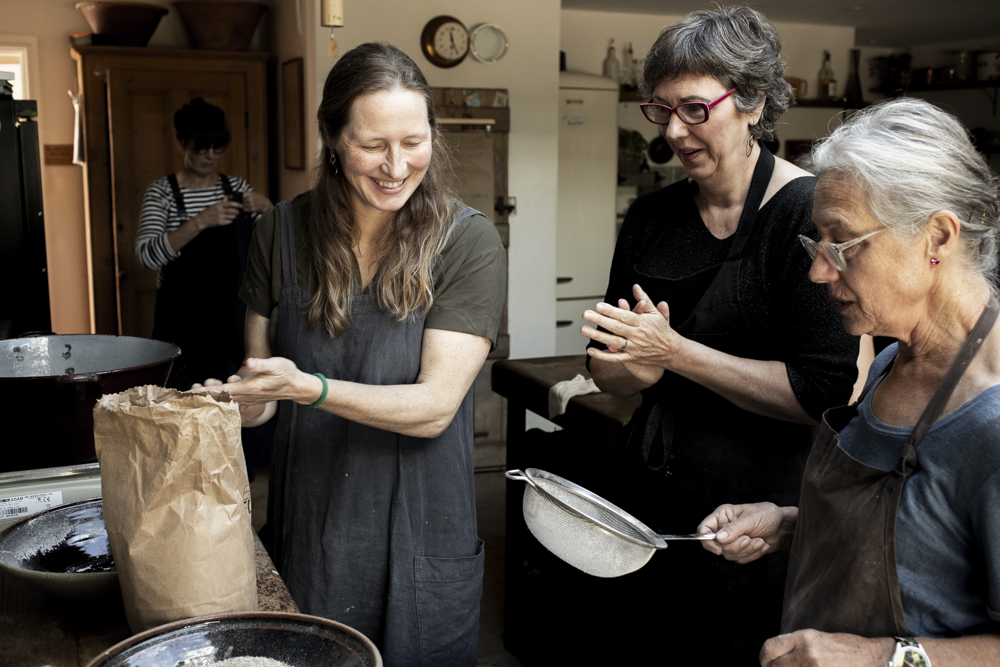
There are several ways to learn the art of making my bread, and for those on this programme, I highly recommend starting with the "10-minute Sourdough" book. It provides an excellent foundation and a great starting point for your bread-making journey.
In addition to this, we offer a variety of other resources. For instance, the "Sweet Sourdough School" book is an extensive work focusing on the gut and mental health, which complements the programme exceptionally well.
Once you've mastered baking, you can progress to the "Sourdough School" book. This book delves into more artisan-style breads, offering advanced techniques and recipes.
You will have the option to join our alumni students and gain access to the website libraries and access a treasure trove of information, hosting a vast repository of knowledge on various aspects of baking, health, and wellness. And of course, there's also our Instagram page, where we regularly share insights, tips, and updates. Rest assured, you will always have access to a wealth of information and guidance throughout your baking journey.
Can participants expect changes in their overall health and well-being in the short term, or is the program focused on long-term benefits?
So often people write to me in the months following a course with updates on both the short-term and long-term benefits to their overall health and well-being. The best thing to do is to log how you feel before ether course, and this is why we encourage you to fill in the self assessment form. In the short term, you may notice immediate improvements, particularly in digestive health. As you begin to consume bread tailored to your specific needs, it's common to experience better digestion and a more balanced gut microbiome. This can lead to a general feeling of increased energy and well-being.
In the long term, the workshop aims to instil a deeper understanding and appreciation for nutritionally rich bread, which contributes to sustained health benefits. Regular consumption of well-crafted bread, combined with a balanced diet, supports ongoing gut health, improved blood sugar balance, and overall diet management.
Additionally, the knowledge and skills acquired in the workshop about bread-making and its connection to health can lead to a lifelong appreciation for quality, wholesome food. This not only benefits your physical health but also enhances your mental and emotional well-being, as you become more connected with your food and its sources.
So, while immediate benefits are noticeable, the true value of the workshop is realised in its long-term impact on your lifestyle and approach to nutrition.
I thought bread is unhealthy? If I am hesitant or unsure about joining the Diploma, what would you say to encourage them to take that first step?
It's very common for health professionals—doctors, nutritionists, dieticians, or psychiatrists—to advise caution with bread consumption, mainly due to concerns about gluten. However, gluten and bread are often misunderstood in our diets. Modern bread, which has evolved, might not be suitable for everyone, and avoiding certain types can be beneficial.
In our personalised workshop, we look closely at why you, as an individual, find it difficult to digest bread and work on tailoring recipes to your specific needs, often uncovering and addressing underlying health concerns. This approach has improved gut microbiome health, blood sugar regulation, and overall dietary management.
But our approach extends beyond bread-making. It fosters a deeper connection with local artisans, like cheese makers and farmers, enhancing your understanding of the environment and your role as both an activist and a baker.
Joining isn't just a personal choice; it encompasses the well-being of your loved ones. It’s a holistic, evidence-based journey toward not just better baking but a healthier lifestyle.
If you're contemplating joining, I encourage you to take a look at our books, Instagram, and website. The real understanding, however, comes from direct conversation. Feel free to call for a chat. Trust your instincts – if it feels right, then get in touch with Vanessa and have a chat.
How do you balance a relaxed approach with rigorous learning
While we fosters a relaxed and nurturing learning environment, it's important for students to understand that the depth and breadth of content covered are substantial and clinically rigorous. This diploma isn't just a casual foray into the world of baking; it's a comprehensive academic and clinical program designed to provide medical practitioners with the skills and knowledge to prescribe bread as a form of lifestyle medicine. The diploma includes robust clinical modules that empower you to diagnose, prescribe, and monitor the use of BALM (Baking as Lifestyle Medicine) in the context of patient care. Over the course of the diploma, you will delve deep into scientific research, clinical case studies, and hands-on assessments, providing a multi-faceted understanding of BALM and its impact on various health conditions. The end goal is not just to become proficient bakers but to become proficient healthcare providers using BALM as an effective tool in your medical practice. Below is a summary of the assessments.
Formative and Summative Assessments
- Live Session Verbal Quizzes: Instead of written quizzes, understanding is checked through verbal quizzes during live sessions to assess real-time comprehension and engagement.
- Peer Reviews of Baking Technique: During hands-on lab sessions, students will assess and critique each other's bread-making skills, this fosters a warm and collaborative learning environment.
- 1:1 Progress Meetings with Instructor: Periodic meetings to discuss individual learning pathways, upcoming projects, and any questions or challenges.
Your Final Assessment:
- Graduation A Personalised Loaf Case Study
-
- Assignment: Students will create a case study surrounding their "Graduation Loaf," showcasing their ability to prescribe a bread recipe based on BALM protocol and clinical evidence.
- Recipe Approval in 1:1 Meeting: The proposed recipe will be vetted for clinical and nutritional appropriateness during a one-on-one meeting with the instructor.
- Evidence-Based Recipe: The chosen recipe must reference clinical papers from the Sourdough School database and other relevant studies. This ensures that the recipe is not only delicious but also supported by scientific research.
- Community Baking and Peer Review: Upon approval, students will bake their Graduation Loaf and present their case study. The loaf and the supporting documentation will be reviewed by peers, serving as a form of collaborative evaluation.
- Community Sharing: The approved recipe and case study will be published in the community's knowledge base, affirming the program's values of community and sharing.
- Assessment Criteria:
-
-
- Relevance to BALM principles
- In line particularly the six pillars of lifestyle medicine
- Nutritional appropriateness
- Clinical feasibility based on cited research
- Quality and clarity of presentation and documentation
-
This structure should provide a robust, multi-faceted assessment process that aligns well with the course's academic, clinical, and community-oriented goals. It offers an evidence-based, peer-reviewed approach to learning that is deeply rooted in both practical and theoretical understanding.
How does this course change the way I understand bread?
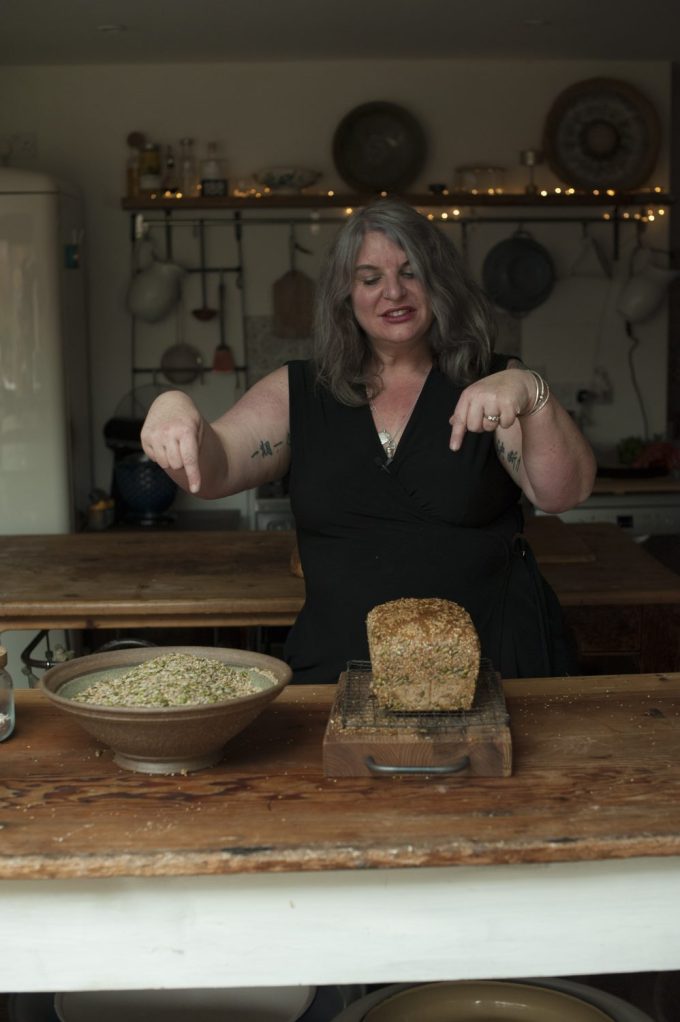 The prevailing discourse within the healthcare sector is that bread is bad for you.
The prevailing discourse within the healthcare sector is that bread is bad for you.
Bread is demonised.
A significant number of healthcare practitioners will tell you that bread is to be avoided. Through no fault of their own, they are caught in a web of misconceptions surrounding bread, flour, monocultures, and fermentation processes. This demonisation of bread is not out of malice but due to a lack of understanding, perceiving it solely through the lens of its most processed, nutritionally void forms. The problem is that modern agriculture and bread-making techniques means that most bread is bad. But, this dominant narrative means that bread has become a victim of oversimplified narratives that fail to capture its nuanced potential for nourishment. The heart of this misunderstanding lies in the understanding that all bread, in its most commercially ubiquitous form, is white, refined, and devoid of nutritional merit. This is only half the picture, and it is a reductionist view that overlooks the rich diversity of bread-making traditions that emphasise whole grains, natural fermentation, and artisanal methods, which can elevate bread to a vehicle for health.
The examination of every aspect of the bread-making process, from soil to slice
This course aspires to challenge and dismantle the entrenched narrative that unfairly maligns bread, advocating instead for a nuanced appreciation of how carefully crafted bread can be among the most nourishing of foods. By exploring the intricacies of bread-making, from the selection of diverse, nutrient-rich grains to the slow, natural fermentation processes that enhance digestibility and nutritional profile, this course illuminates bread's potential as a cornerstone of a healthful diet. It educates on the dangers of monoculture in grain production and champions the return to more sustainable, diverse cropping practices that benefit our health and the environment.
The diploma offered aims not just to educate on the art and science of baking bread but to empower participants with a comprehensive understanding of how bread can be made in a way that supports optimal health, the examination of every aspect of the bread-making process, from soil to slice.
It is as much a journey through the world of bread as it is a mission to correct the misconceptions that have led to us ruining our relationship with one of humanity’s oldest and most nourishing, and affordable foods.
Who Should Enrol on a Diploma? Do I have to be a medical professional?
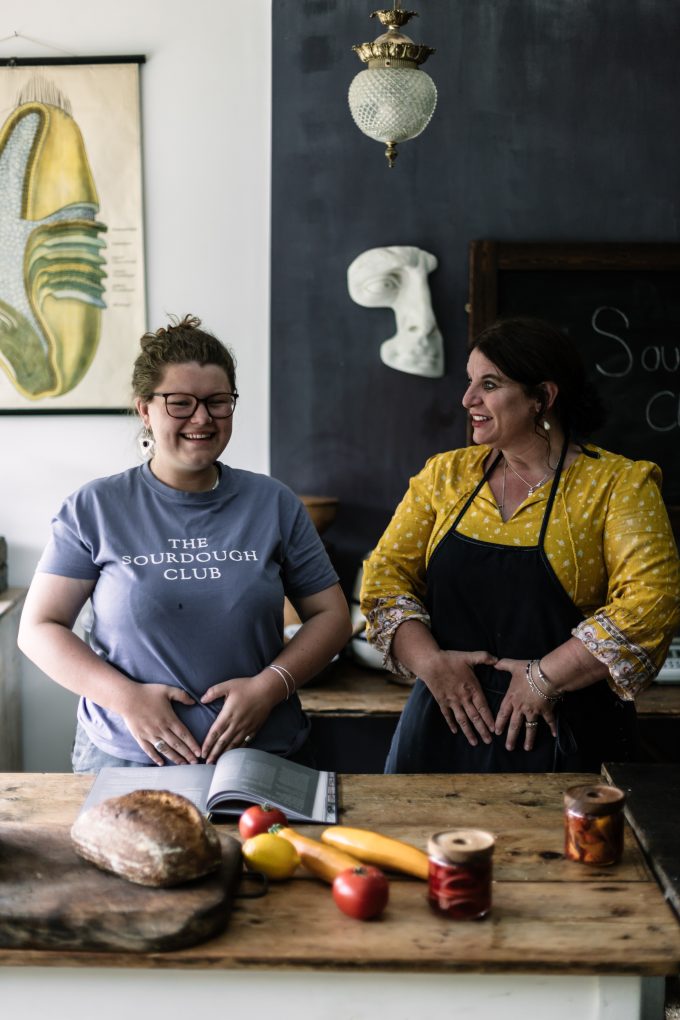 Anyone can enrol.
Anyone can enrol.
The Diploma is about understanding bread and especially the intact on our health and the planet. We teach both medical professionals and bakers. You do not need to be medical to do this course, but you do need to be curious about bread, and how the bread that we eat impacts us.
Who Has Benefited from This Course?
Over the past decade, the diversity among our students has been nothing short of remarkable. From farmers to professional bakers, including artisan bakers and large plant bakery managers, the course has welcomed all. The roster extends to flour millers, GPs, psychiatrists, nurses, oncologists, physiotherapists, and even microbiome specialists ranging from professors to local small artisan bread makers.
I love this eclectic mix of backgrounds highlights a unique aspect of the course: it’s not about your prior knowledge of baking or your professional background. We start from ground zero, often challenging and debunking myths around bread-making.
The Ideal Candidate
So, who is the course for? It’s for those with an open mind. It’s for those who recognise that bread, a staple in 99% of British households, plays a pivotal role in our diet, culture, and well-being. The course goes beyond teaching the art of baking; it’s about understanding bread’s potential in promoting equality and empowerment and delivering optimal nutrition affordably and equitably.
Applying Your Knowledge
The crucial question isn’t about your ability to bake but how you intend to use this knowledge. Whether you aim to nourish, initiate behavioural change, support your community, or advocate for environmental and systemic change in our food systems, this course offers the tools and insights to make a difference.
Consider how integrating this knowledge into your practice could enhance what you offer to your clients, patients, or customers. Nutritionists, for instance, can tailor recipes to specific dietary needs, providing advice that transcends generic guidelines and addresses individual conditions where dietary intervention is crucial.
Why Bread?
Bread connects us all, yet it’s often misunderstood and undervalued. This course seeks to restore bread to its rightful place as a nourishing, affordable staple, challenging the misconceptions that have diminished its value.
Your Next Steps
The best way to ascertain if this course resonates with you is through dialogue. I’m not just here to teach but to engage, discuss, and help you see how personalising bread can empower you and those around you. If understanding and leveraging the true value of bread to foster social and systemic change aligns with your goals, then yes, this diploma is indeed for you.
So, if you’re ready to explore how this knowledge can transform your approach to bread and its place in our lives and society, let’s have a conversation. Your journey to becoming an advocate for better nutrition, community support, and systemic change in our food system starts here.
Who can benefit from personalised bread?
 Personalising Bread and baking for Health Understanding the intersection between traditional baking and modern health science can revolutionise patient care. Personalised bread making as part of lifestyle medicine offers a therapeutic approach that addresses various health conditions. This guide provides some of the topic areas covered on the Diploma and some explanation of how medical professionals can incorporate baking into personalised health plans to enhance both physical and mental well-being of there patients.
Personalising Bread and baking for Health Understanding the intersection between traditional baking and modern health science can revolutionise patient care. Personalised bread making as part of lifestyle medicine offers a therapeutic approach that addresses various health conditions. This guide provides some of the topic areas covered on the Diploma and some explanation of how medical professionals can incorporate baking into personalised health plans to enhance both physical and mental well-being of there patients.
Baking as Lifestyle Medicine (BALM) Protocol The BALM protocol, an evidence-based framework, transforms baking from a neutral or potentially harmful activity into a health-enhancing practice. By personalising bread recipes to meet specific health needs, we ensure that each loaf supports optimal health outcomes.
Community and Support Central to this approach is the community support system. Weekly live meetings facilitate shared learning, experience exchange, and collective progress. This community aspect is crucial for sustaining behavioural changes and integrating healthy baking into daily routines.
Detailed Health Benefits:
1. Obesity Management Engaging in bread making promotes a healthy diet rich in essential nutrients and fibre. Personalised bread recipes can help manage weight by providing satiating, nutrient-dense options that combat obesity and improve overall health.
2. Mental Health Baking in a community setting enhances mental health by fostering a sense of achievement, routine, and creativity. Personalised bread supports cognitive function and mental health by ensuring the availability of key neurotransmitters and metabolites necessary for brain health.
3. Children's Health Personalised bread making for children addresses rising rates of obesity and other health issues. Involving children in the process of making and understanding bread can instil healthy eating habits. Our bread provides the essential nutrients and fibre needed for their growth and development, making it an excellent addition to their diet.
4. Teenagers and Pizza Teenagers often prefer fast food, but our approach includes making healthy, delicious options like sourdough pizza. This not only appeals to their taste preferences but also ensures they receive the necessary nutrients and fibre. Baking together can also serve as a bonding activity, promoting mental health and well-being.
5. Bowel Cancer Prevention Increasing fibre and nutrient diversity in the diet is crucial for families with a history of bowel cancer. Our bread enhances the bioavailability of key minerals and promotes a healthy gut microbiome, which are vital for preventative health measures. The diversity in fibre supports gut health and may reduce the risk of bowel cancer.
6. Cancer Support For individuals undergoing chemotherapy, our bread recipes are designed to accommodate changes in taste and texture preferences. Chemotherapy can alter taste buds, making certain foods unpalatable. Our recipes are tailored to provide essential nutrients and maintain calorie intake during treatment, ensuring patients receive the necessary nourishment.
7. Blood Sugar Management Proper management of blood sugar levels is essential for overall health, especially for individuals with diabetes or prediabetes. Our bread helps manage blood sugar levels by providing a steady release of carbohydrates, reducing spikes and crashes. This contributes to better overall glycaemic control and supports long-term health.
8. ADHD, ASD, and Autism Our bread is specifically designed to support neurodiverse individuals by providing increased fibre and nutrients that create metabolites beneficial to brain function. The fermentation process reduces gluten and FODMAP content, making the bread easier to digest and reducing bloating and discomfort. This is crucial as it can help manage the unique dietary needs associated with these conditions.
9. Non-Coeliac Gluten Sensitivity and IBS While we do not specifically work with coeliac disease, our fermentation process degrades gluten and FODMAPs, making the bread easier to digest for those with non-coeliac gluten sensitivity and IBS. This reduces bloating, pain, and discomfort, supporting better digestive health.
10. Women's Health During menstruation and menopause, women often need additional support for managing symptoms like constipation and bloating. The soluble fibre in our bread aids gut transit and supports overall digestive health during these times. Additionally, our bread provides nutrients that can help balance hormone levels and support women's health.
11. Athletic Performance Athletes benefit greatly from our focus on gut microbiome support and nutrient availability. Our bread helps maintain blood sugar balance and extends nourishment through polyphenols, aiding muscle repair and overall performance. Athletes often suffer from gut dysbiosis, and our bread helps restore gut health, which is essential for peak performance.
12. Anaemia Management The fermentation process in our bread neutralises phytic acid, making key minerals like iron more bioavailable. This is particularly beneficial for those managing anaemia, as it helps in the retention and absorption of iron levels, thereby improving overall health.
13. Sleep Quality Proper sleep is crucial for overall health, and our bread supports this by providing essential nutrients like magnesium and B vitamins. These nutrients help regulate sleep patterns and improve sleep quality. The fermentation process also enhances the production of serotonin, which is a precursor to melatonin, further supporting restful sleep and managing insomnia.
14. Elderly Nutrition Supporting the elderly in maintaining a healthy diet is crucial for their overall well-being. Our bread provides essential nutrients, easy digestibility, and promotes a healthy gut microbiome, which are vital for older adults. Baking also provides a sense of purpose and community engagement, enhancing mental health and well-being. Personalised bread making offers a holistic approach to health through the BALM protocol. With over two decades of experience training healthcare professionals and bakers and the dietary intervention studies supporting our methods, we offer a proven way to improve both physical and mental health to your patients and customers.
The joy of baking, the sense of community, and the health benefits make personalised bread making a unique and enriching experience. We invite you to explore the transformative power of baking as lifestyle medicine.
Who should do the Diploma in Personalisation of Bread?
Anyone can train in Pesonlisation of Bread, but here is an overview of the kind of students we have taught over the years:
- Doctors who use this approach to socially prescribe baking as Lifestyle Medicine to their patients, recognising the therapeutic and nutritional benefits of tailored bread-making.Nutritionists who apply personalised bread-making in their recommendations to clients, offering customised nutritional advice that includes bread tailored to specific dietary needs.
- Dieticians who have incorporated this method into dietary plans for patients, using the specific nutritional composition of bread to address health concerns and promote overall well-being.
- Both Artisan Bakers and Industrial Bakers develop recipes for their customers, focusing on crafting bread that meets the growing demand for health-oriented, personalised nutrition in both artisanal and industrial settings.
- School Cooks and Cafes integrate personalised bread into their menus to cater to the diverse nutritional needs and preferences of their students and customers..
- Psychiatrists and Occupational Health Specialists within the NHS have incorporated a baking initiative, recognising the mental and physical health benefits of bread-making and its role in patient care and rehabilitation.
- Parents, especially those with children who require additional nutritional support or have specific dietary needs, such as children with adhd and autism, utilise personalised bread-making to ensure their children's diets are nutritious, optimal to support gut health, and enjoyable
- Carers, looking after someone with an autoimmune condition or cancer. Every bites counts when it comes to nourishment.
- Elderly Care Facilities staff who can use tailored bread-making to address the specific dietary requirements and preferences of older adults, improving their nutritional intake and quality of life.
- Community Health Workers and Social Workers can leverage personalised bread-making as part of community health initiatives, promoting accessible and affordable nutrition.
- Fitness Coaches and Personal Trainers might incorporate this knowledge to provide comprehensive wellness advice that includes nutritionally rich, personalised bread recipes to support physical health and recovery.
- Public Health Officials could advocate for the integration of personalised bread-making into public health nutrition strategies, aiming to address widespread nutritional deficiencies and improve population health outcomes.
- Culinary Schools and Cooking Classes could offer specialised courses on personalised bread-making, equipping future chefs and bakers with the skills to cater to the diverse nutritional needs of their clientele.
- People who work in hospices as end of life therapy for the families who are visiting their loved ones. Students have told me that often the smell of freshly baked bread is described as the most beautiful smell to enjoy in your last days, and the bread making is therapeutic and comforting when words fail.
Graduation Recipe Task
Graduation Task Overview
For those considering enrolling in our diploma courses, the graduation task represents the bread and the principle of sharing. The task is to create a recipe that uses the BALM protocol as the framework and the practical application of knowledge. This task requires students to develop a personalised bread recipe adhering to the Baking as Lifestyle Medicine (BALM) protocol. It is an edible demonstration of a deep understanding of the principles of personalised nutrition and the therapeutic potential of bread-making.
Each student is tasked with creating a recipe that is more than just a culinary achievement; it is a testament to their ability to integrate scientific research into practical baking. These recipes are tailored to address specific health needs and conditions, supported by robust evidence and research references.
Examples of such personalisation include:
- Fermentation and Gluten Breakdown: Recipes might explore techniques to enhance fermentation processes, improve gluten breakdown, and reduce FODMAPs for individuals with digestive sensitivities.
- Nutrient Availability: Some recipes could focus on enhancing the bioavailability of essential minerals and vitamins, addressing conditions such as anaemia by incorporating ingredients rich in iron and folate.
- Specific Nutritional Requirements: Tailored recipes might be designed, for example, for postpartum recovery or for focusing on ingredients supporting nutritional requirements, such as reducing phytic acid to increase iron absorption in someone with anaemia. It might be for gut microbiome support and tissue repair in an athlete or baking for someone to hep managing blood sugar levels in individuals with diabetes.
- High Nutrition Needs: Recipes might be tailored to cancer patients, prioritising high-nutrient density and easy digestibility to support overall health during chemotherapy.
- Autoimmune Conditions: For individuals with autoimmune diseases, recipes might be crafted to include anti-inflammatory ingredients and exclude potential dietary triggers.
- Social Prescribing: The programme also recognises the therapeutic role of baking in mental health. Recipes might be created for teenagers experiencing anxiety or for elderly individuals needing enhanced nutrient intake and fibre for gut health.
The Diploma ensures that students are well-versed in nutrition and therapeutic baking. Creating these recipes is not only a demonstration of their knowledge but also a practical exercise in developing delicious, practical, and desirable baked goods.
At The Sourdough School, we hold a strong belief in the communal sharing of knowledge, drawing inspiration from the Japanese concept of "Ba." This principle underlines the importance of creating a shared space where knowledge is collectively developed and disseminated. The graduation task is a manifestation of this ethos, where each student’s work contributes to a larger body of resources that benefits the entire community.
Unlike traditional examinations, our approach to assessment is deeply practical and communal. We culminate this learning journey with an "eaten exam," where the created recipes are shared and enjoyed within the community. This practice symbolises our commitment to the principle of sharing—both bread and knowledge—reinforcing our identity as a centre of community learning and support.
In conclusion, the graduation task at The Sourdough School is not just an academic requirement; it is a holistic demonstration of a student’s ability to apply theoretical knowledge to practical, real-world scenarios. It embodies our core values of personalisation, community, and the therapeutic potential of baking.
Registration for an in person Workshop and how to book your 15 minute Appointment
Registration Process at The Sourdough School
We take the time to meet all our students, and this is part of our obligations to ensure you meet legal and health requirements (e.g., no wheat allergies), confirm your understanding of our terms and conditions, and ensure that you are on the right course. Please complete the registration form and book your 15-minute consultation with Dr. Kimbell here.
Due to teaching commitments, Dr Kimbell is only available on Tuesdays for appointments, and time slots are on a first-come, first-serve basis. We recommend you book your appointment as soon as possible and that you have filled in your registration form.
Dr. Kimbell cannot speak to you without completing the form. Please ensure you have registered before making an appointment.
Essential Information About Attending In-Person Courses.
Many participants inquire about accommodation and directions. We have detailed guides available with all the necessary information. Please take the time to read these guides before your conversation with Dr Kimbell - this ensures that your valuable 15-minute session is focused on course-specific queries and personalised guidance rather than logistical details. All the extra information you need about attending can be found here.
Should I book accommodation before I speak with Dr Kimbell?
Occasionally, Dr. Kimbell suggests that the course you have selected is not right for you. She may suggest a different course, dates, or moving online, or occasionally, there may be a reason she feels that this course is not right for you, and she will issue a refund.
To avoid any inconvenience, we recommend not booking any travel or accommodation to attend the school in person until you have received confirmation that your application has been accepted. Additionally, please ensure that you have read and understood our Terms and Conditions, which can be found here: Terms & Conditions.
Note: If you have already spoken to Vanessa and been granted a scholarship or bursary, there is no need to speak with her again.
When will I receive information about the Diploma starting?
Diploma Students are required to Register for Student emails.
Our system requires that you register for course notifications if you are a diploma Student.
There is nothing to do until the 2nd week of September when we will contact you using the same email address you provided during payment. You will receive instructions on how to join your course modules, along with a specific link and code to register for the course you signed up for. This link will give you access to the syllabus.
You will be guided through a comprehensive welcome module, which includes a list of required equipment. You do not need to buy anything before then. Additionally, you will be invited to attend a pre-course live session via Zoom to familiarize yourself with the website, forum, and live clinics.
We will also send an invitation to join the pre-course information tutorial if you wish to attend, but we have been running this course for many years, and we always begin on the last Thursday of September every year. However, should you be concerned about anything, please attend the Zoom at 4 pm and speak directly to Vanessa. You can send me a question if you want to, and you can access the student support session here. Please use Sourdough to access
The Structure of The Diploma
Structure.
The schedule and syllabus are designed to provide a structured yet flexible learning experience. Below, there is an outline of the course schedule, structure, and expectations to ensure a comprehensive understanding and optimal learning outcome.
Course Philosophy:
- Living Syllabus: Our syllabus is dynamic and designed to adapt and evolve. We encourage you to engage with each week's topic as it is presented, refraining from skipping ahead to fully absorb and reflect on the material.
- Integrated Learning: The course is structured to intertwine theoretical knowledge with practical application. Live tutorials on Tuesdays will introduce you to the theoretical aspects, which you are then encouraged to apply practically through baking and analysis over the weekend.
- Focus on Health Outcomes: Central to this module is the exploration of bread's impact on health. We delve into the effects of industrially produced bread, the benefits of wholegrain, and the transformative nature of sourdough, utilizing case studies and research to inform our understanding.
In the syllabus you will find:
- Guided Week by Week Learning Resources: A curated list of resources is provided to support your learning journey. These resources are structured to complement the weekly topics, offering depth and context.
- Interactive Libraries in the Menus: Our libraries are continuously updated and expanded. While you are encouraged to explore these resources freely, please note that the core material essential for your graduation recipe will be explicitly outlined in the syllabus.
Course Structure:
- Duration: The course spans one year, with an additional year provided for the submission and refinement of your graduation recipe. This structure has evolved over a decade of teaching as it allows for an immersive learning experience, with ample opportunity for review, application, and development.
- Repetition and Depth: The two-year span also allows for a BALM comprehensive overview, giving you the the opportunity to revisit topics, and the time to understand the subject in order to aooly the knowledge to your graduation recipe.
- Interactive and Responsive: The course is designed to be responsive to your interests and needs. If there's a specific topic you're interested in that hasn't been covered, it may be integrated into the library, reflecting our absolute commitment to a tailored and responsive learning environment.
Live Sessions and Interaction:
- Engagement: Live sessions are relaxed, fun and friendly but they are your platform to clarify doubts, ask questions, and engage with the content in real-time.
- Responsiveness: It is your interests and queries that help shape the content of the live sessions, If you do not engage with the topic then the time is wasted. Please take the time to send in your questions.
- It is your feedback and questions that stimulate the addition of new recipes and features in response to your student interest.
Completion and Graduation:
- Flexible Learning: The two-year period provides flexibility, ensuring you can absorb, apply, and refine your knowledge and skills at a comfortable pace.
- Graduation Recipe: Your graduation recipe is a culmination of your learning, a chance to showcase the depth of your understanding and creativity.
Our course structure is designed with your professional development in mind. We value your engagement, encourage your curiosity, and are committed to providing a rich learning environment. We look forward to your unique contributions and to witnessing your growth and achievements throughout this course.
Do you record the live sessions?
What kind of things can I expect to learn from my genetic report and that way I bake?
Can you explain more about the DNA testing with Lifecode Gx® and how it integrates into the program
What are the key health benefits of participating in this program, particularly regarding gut health and overall wellness?
The Early Days
The Sourdough School was an idea that began 25 years ago when Vanessa started teaching small classes around her kitchen table. She taught in schools and village halls until, in 2011, she and her family bought a dilapidated Victorian house. Initially, she taught in the kitchen, but juggling a young family and pets, along with the children repeatedly eating her ingredients before a class, meant rethinking how she taught. She did not want a cookery school or commercial kitchen environment, so to retain the authenticity and connection, she decided to tutor students in a home environment which has been central to the way has taught throughout her career.
In 2015, Vanessa and her family opened a dedicated classroom, transforming the coach house into a home-based learning environment. The restoration used materials rescued and brought from France, giving the space a French feel. An old sink Vanessa stopped from being smashed in the village in the dordogne was given to her brother who brought it back, the linen cupboard from her childhood home was repurposed as a proofing cabinet, a church door that Vanessa spotted as an old chapel was being demolished in Oxfordshire was incorporated. Even the workbench she teaches was originally a fabric bench which she repurposed as a kitchen bench by filing coffee tins with concrete to raise the height. This is far more than a classroom, it created a warm, personal space for sharing knowledge which was central to implementing the Japanese theory of Ba.
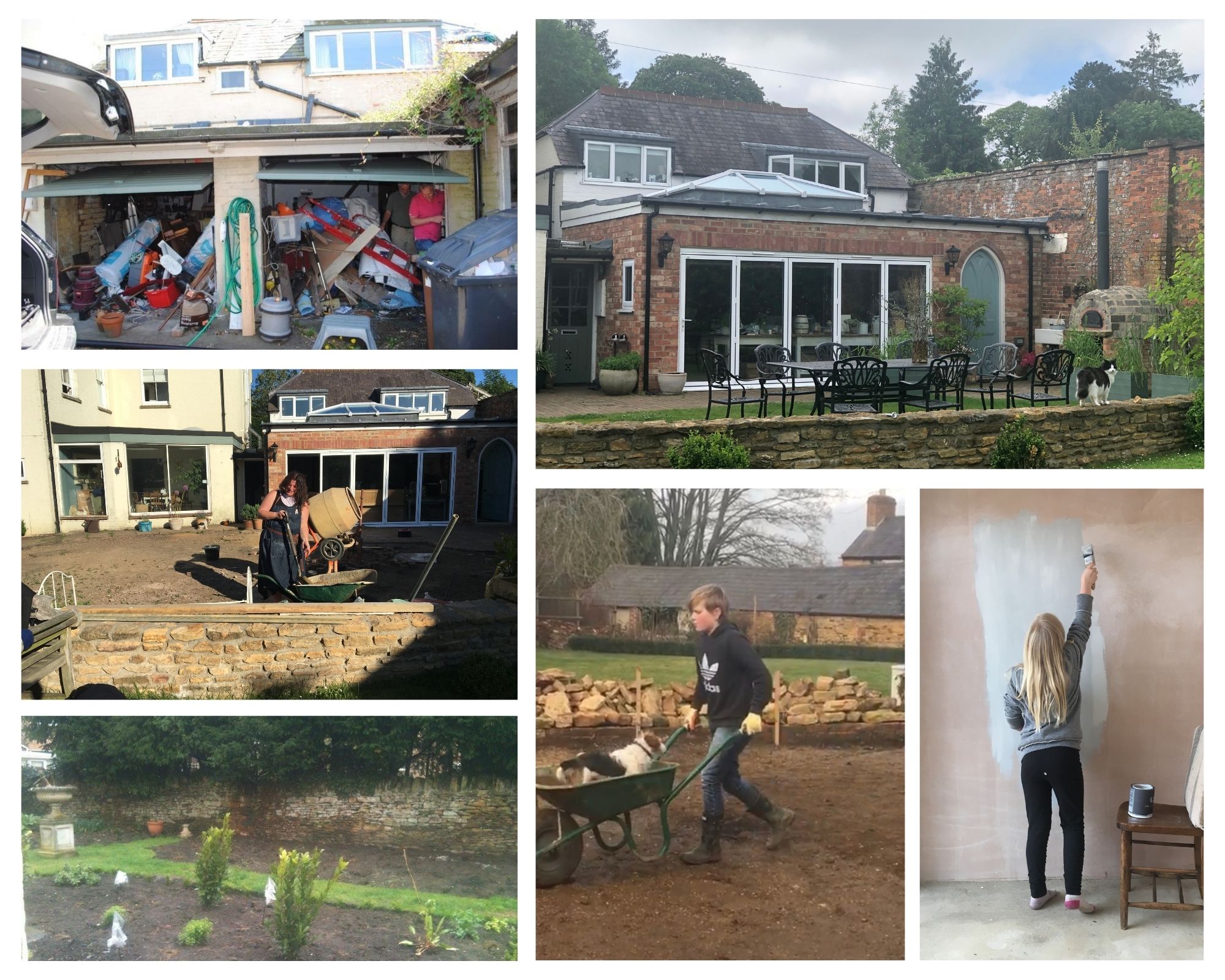
The Japanese Theory of Ba at The Sourdough School
People often remark that Vanessa's approach to teaching is fundamentally different from traditional courses. She attributes this to grounding her teaching in the Japanese theory of "Ba" and teaching from a home based classroom has been the foundation of this approach.
"Ba," was introduced by Ikujiro Nonaka and Hirotaka Takeuchi, in 1995 and represents a shared space that fosters interactions for knowledge creation and sharing. Vanessa set out to create an environment that is about bringing together people, ideas, and information in a way that sparks collective learning and innovation. Rather than follow conventional teaching methods, The Sourdough School is about being part of a vibrant community where knowledge is co-created and shared and this is key to learning how baking at home or in a bakery is activism. This theory is also followed on in the live sessions online each week.
Learning here is not a matter or being lectured - to is a collaborative and interactive processes. To personalise bread participants are encouraged to share their experiences, insights, and techniques and this makes each workshop and class a unique experience rhrough collective wisdom in baking. This isn't just about a single person teaching; it’s about all of us learning together. By building a community of learners who support and inspire each other students are encouraged to do the same, and likewise transform bread through sharing.
The style Vanessa is about experimenting, and reflecting on the experience, integrating many disciplines—nutrition, microbiology, and lifestyle medicine—into our teaching, providing a comprehensive understanding that goes far beyond the bread itself.
It is important to to understand that The Sourdough School is more than just a place to learn; it’s a dynamic, collaborative space where students are expected to participate as knowledge is shared, developed, and applied in ways that benefit both individuals and the broader community. This is the heart of what we do—creating a unique personalised learning environment that inspires and supports a shift in the way you understand bread and your role as a baker.
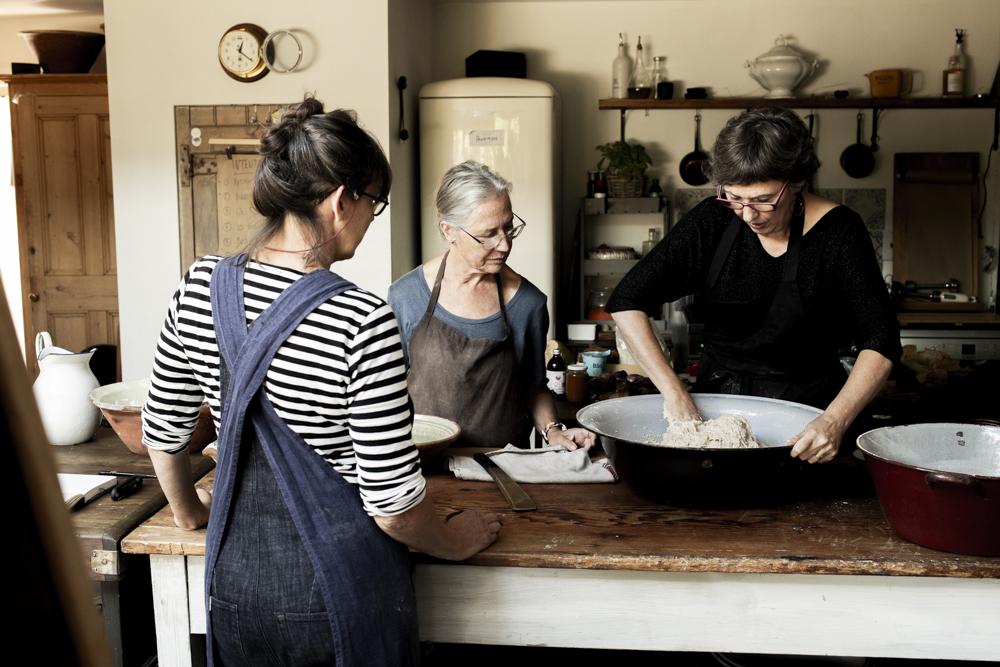
The Sourdough School Gardens
At The Sourdough School, we are not just about baking bread. We are about baking bread with a purpose, fostering health and wellness, nurturing resilient communities, and caring for our planet. Bread is our basic food and our most inexpensive, and yet it has been so changed in the past century that it is no longer even recognisable as bread. To understand bread you need to start with the soil.
The gardens are part of your learning experience and connect you to the soil, growing grain, understanding the whole system. Vanessa is renowned for inspiring people to bake through understanding, not just the fermentation of bread, but the interconnectedness of the microbes. Central to her teaching is understanding the gut microbiome, and the connection to the microbes, so many of her classes start in the garden or the barn.
The classes are about more than just teaching people to bake bread. To support our students to use the knowledge of how to bake bread that nourishes and becomes a medium of health, understanding the environment is the start point of how we make bread and how to bake in a way that encourages all microbes to flourish.

The Sourdough School Books changed the bread world
The Sourdough School books are best sellers.
Vanessa began writing The Sourdough School Books at a time when knowledge about sourdough was sparse and often misunderstood. In the UK, as she set out teaching sourdough was typically associated with San Francisco and she often tells stories that reflect just how little people understood about sourdough. On serval occasions in the early days students would turn up thinking they were going to learn to make Irish soda bread. Once The School was set up Vanessa started writing the books with the aim of to changing the narrative on fermenting bread sharing her extensive knowledge through meticulously crafted books with the aim of demystifying sourdough baking. It was a way to democratise the knowledge the she felt was key to health.
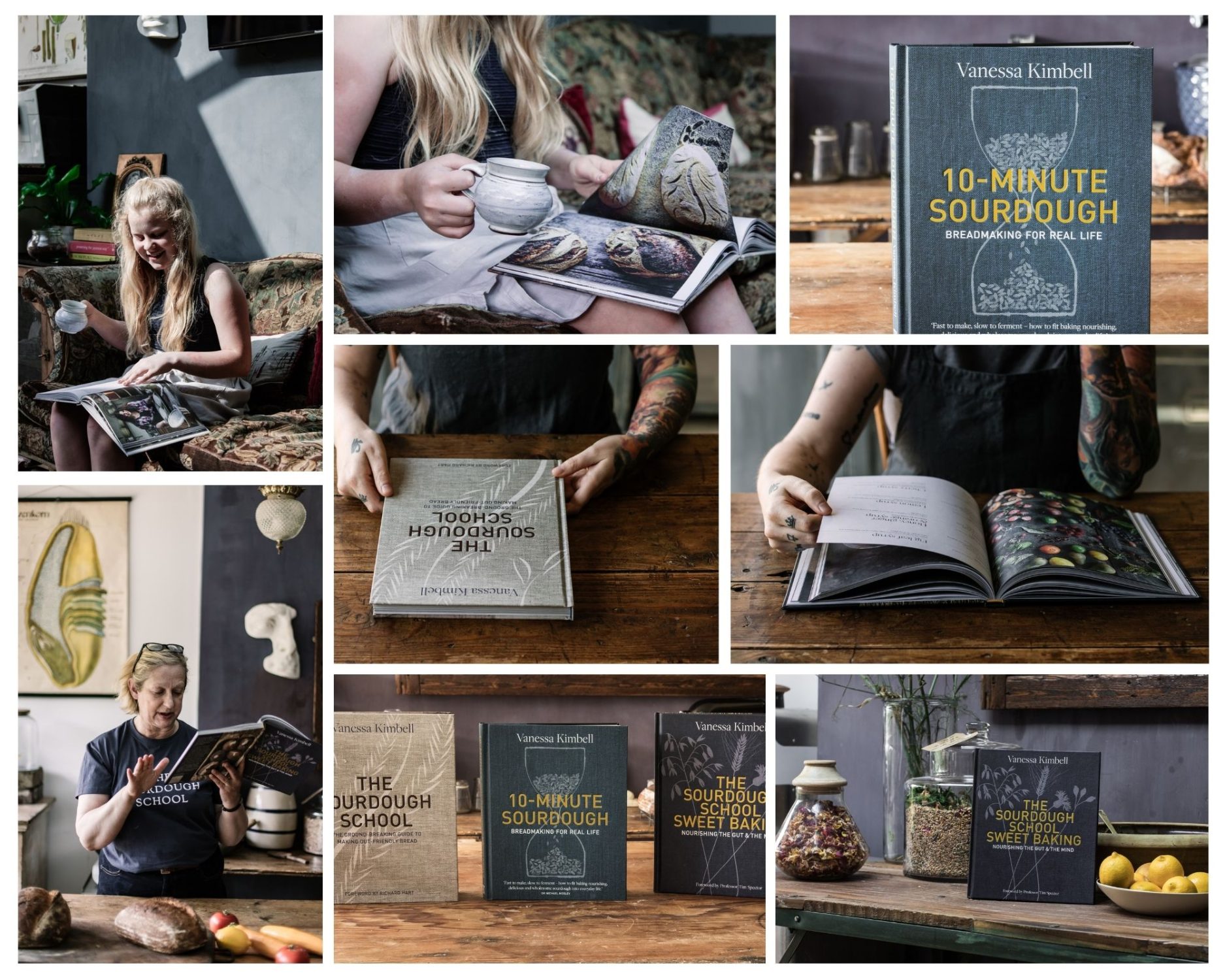
Transforming The Way People Understood Sourdough
The Sourdough School Books have successfully and fundamentally transformed the global understanding and practice of sourdough baking. The books bridged traditional baking methods with contemporary scientific insights, revolutionised the way bakers around the globe understood bread, promoting health and nutrition long before it became fashionable.
Her books, including "The Sourdough School" series, have broken down significant barriers and provided insights previously unavailable to the public. Vanessa introduced techniques that were known by just a few people such as bassinage for improving crumb structure and innovative methods like the chocolate sourdough starter. She provided a clear understanding of using a young levain and differentiating between heterofermentative and homofermentative bacteria, illustrating their impact on flavour and health. These elements have been critical in educating both amateur and professional bakers on the complexities and benefits of sourdough.
The books shared Vanessa's work on the prebiotic effects of sourdough has highlighted its importance for gut health, promoting sourdough as a nutritious, health-supporting food. Her contributions have been recognised by many eminent professionals, including Professor Tim Spector, Baker Richard Hart, writer Nigella Lawson and the late Dr Micheal Mosley have acknowledged the pivotal role of the books in shifting the perception of bread from a mere staple to a vital component of a healthy diet.
The Books influence extends beyond technical techniques to broader agricultural practices. through her writing Vanessa has been a steadfast advocate for diversity in flour to nourish the gut, introducing botanical blend flours that have revolutionised the baking industry’s approach to ingredient diversity. Her commitment to regenerative and organic farming practices over the past 25 years underscores her dedication to sustainable and health-promoting agriculture.
"The Sweet Sourdough School," broke new ground by teaching how to make sweet sourdoughs and integrate beneficial bacteria into everyday baking. This approach supports gut health in innovative ways, such as through fermented components in doughnuts.
The 10-minute Sourdough School book technique, which has made it possible for everyone to enjoy the benefits of sourdough, regardless of time or financial constraints. This technique, along with her other accessible methods, has democratised sourdough baking, making it a feasible and affordable practice for all.
These books have not only transformed individual baking practices but has also influenced the entire bread industry. In the video above baker Steve Rogers explains inches own words how The Sourdough School Books introduced pioneering methods, sustainable practices, and ground breaking knowledge earned the books recognition as game changers in the baking world.
The Sourdough School books have been published across the globe in many languages including French, German, Italian, Spanish, Hungarian and Croatian. These remarkable books have changed the landscape of bread and sourdough globally, and we are very proud of how they have been central to the revolution in understanding bread across the globe.
The Courses – An overview
The Sourdough School offers a diverse range of courses designed to cater to different levels of baking expertise, focusing on the health benefits of sourdough and the principles of Baking as Lifestyle Medicine (BALM).
Introduction to Baking as Lifestyle Medicine
- Duration: 1 Day
- Description: This introductory course provides a foundation in the principles of BALM, focusing on the basics of sourdough baking and its health benefits. It is ideal for beginners who want to understand the impact of bread on digestion and gut health.
- Key Topics: Basic sourdough techniques, introduction to fermentation, and health-focused baking practices..
Workshops
- Duration: 3 Days
- Description: These workshops offer an immersive experience in sourdough baking, combining practical sessions with theoretical knowledge on nutrition and gut health. Small group sizes ensure a personalized learning experience.
- Key Topics: Advanced sourdough techniques, in-depth nutritional education, and hands-on practice with a variety of recipes.
3. Online Diploma in Nutrition and Digestibility of Bread
- Duration: 2 years - a comprehensive training programme in Nutrition and Digestibility of Bread
- Description: This comprehensive online course covers the intricate details of sourdough baking and its health implications. It is designed for those who prefer a self-paced learning environment with access to a wealth of online resources.
- Key Topics: Detailed sourdough baking processes, the science of fermentation, and personalized nutrition strategies.
- Course Enrollment: Open year-round with flexible start dates.
4. Retreats
- Duration: 5-6 Days
- Description: These retreats offer a holistic experience, combining sourdough baking with wellness activities. Participants enjoy an immersive learning environment in a beautiful setting, fostering both personal growth and community.
- Key Topics: Comprehensive sourdough training, wellness practices, and hands-on baking
Each course at The Sourdough School is designed to provide both theoretical knowledge and practical skills, ensuring that participants can confidently bake and incorporate healthy sourdough practices into their daily lives. Whether you are a novice baker or a seasoned professional, there is a course that will suit your needs and help you on your journey to healthier baking.
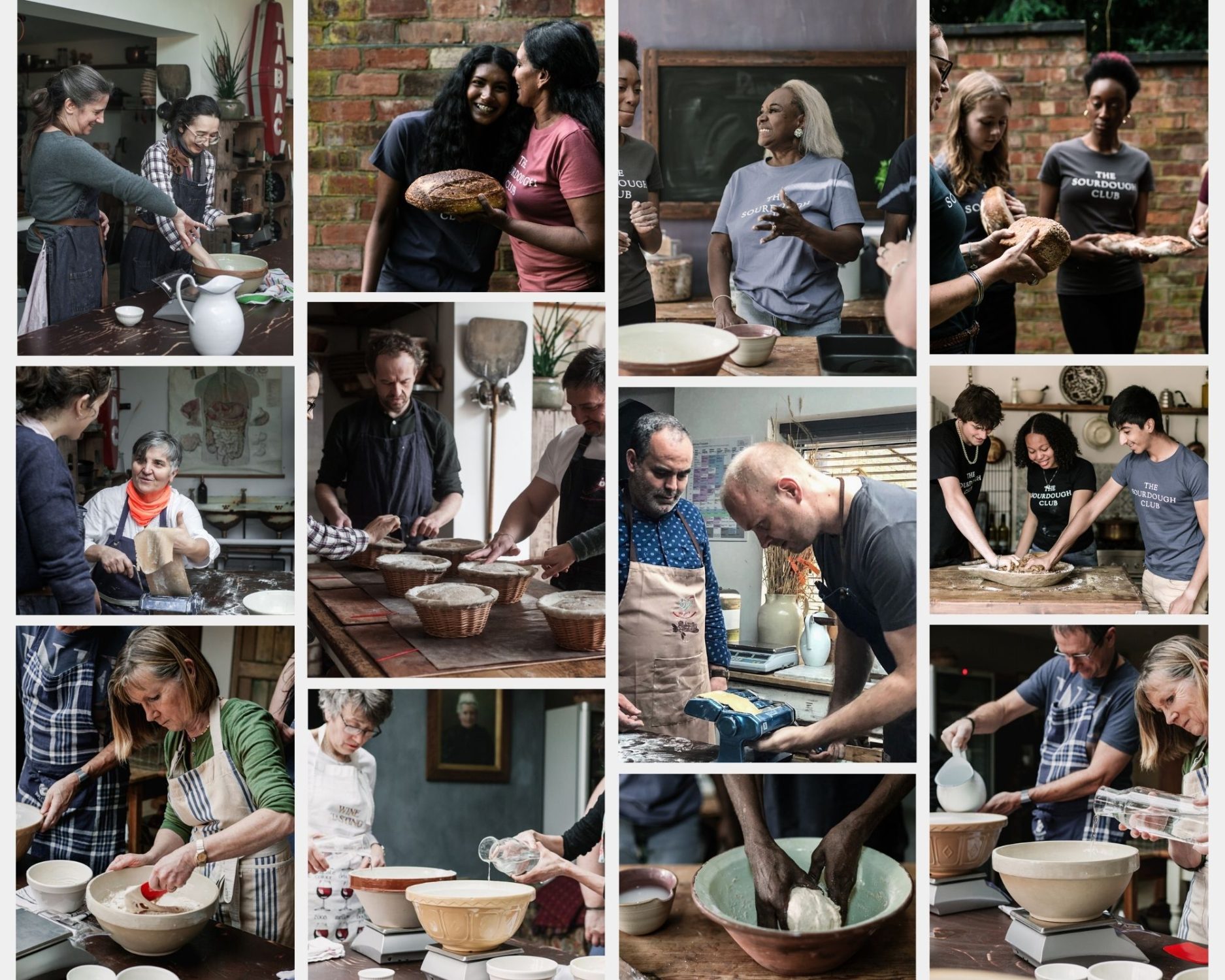
Who Was Dr Annie Elliot?
The awards are offered to honour of a remarkable person who was a part of our community – Dr. Annie Elliot. As the first General Practitioner to complete the Diploma, Dr Elliot embodied everything one could hope for in a student. She was brilliant, humorous, tenacious, determined, and generous with her knowledge. She was unafraid to try new things and was driven by an insatiable curiosity.
Dr. Elliot was a beacon of community spirit, always baking bread for everyone - friends, patients, neighbours - and sharing it with love. She pushed the boundaries of what we thought was possible in our programme and always encouraged us to strive for more.
She was the type of person who not only made a lasting impact on me as an educator but also on her fellow students. Her vibrant personality, her enthusiasm for learning, and her kindness are deeply missed. We remember her laughter, her insightful questions, and the way she could light up a room with her passion for baking and learning.
In late spring 2023, we were deeply saddened by the news of Dr. Elliot's passing. Her absence is profoundly felt in our community, but her legacy continues to inspire us.
In recognition of her invaluable contribution to the BALM programme, we created the Annie Elliot Award, with the permission of her family. This award will be given to to students who embody the same tenacity, determination, and generous spirit that Dr. Elliot demonstrated throughout her time with us to share bread.
Dr. Annie Elliot was more than a student; she was a friend and an inspiration. I wanted to remember her, as a way to celebrate her life and the positive influence she had on all of us at The Sourdough School. Her free thinking, generosity tenaciousness and love of learning, and baking sourdough was amazing.
Thank you, Dr. Elliot, for everything you brought to our baking community. You are greatly missed, but your legacy lives on.
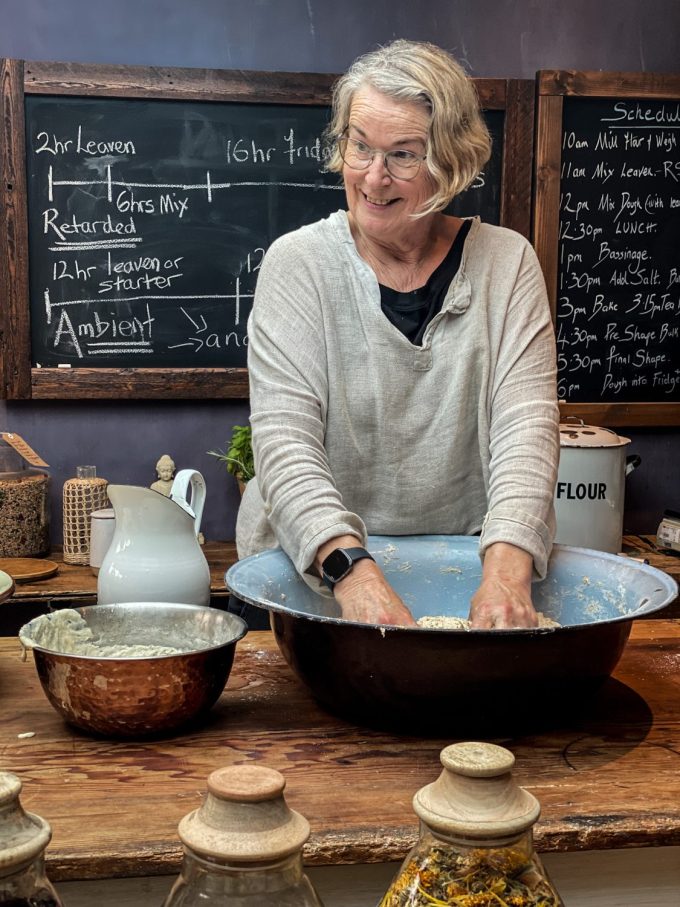
How the Educational awards are Funded
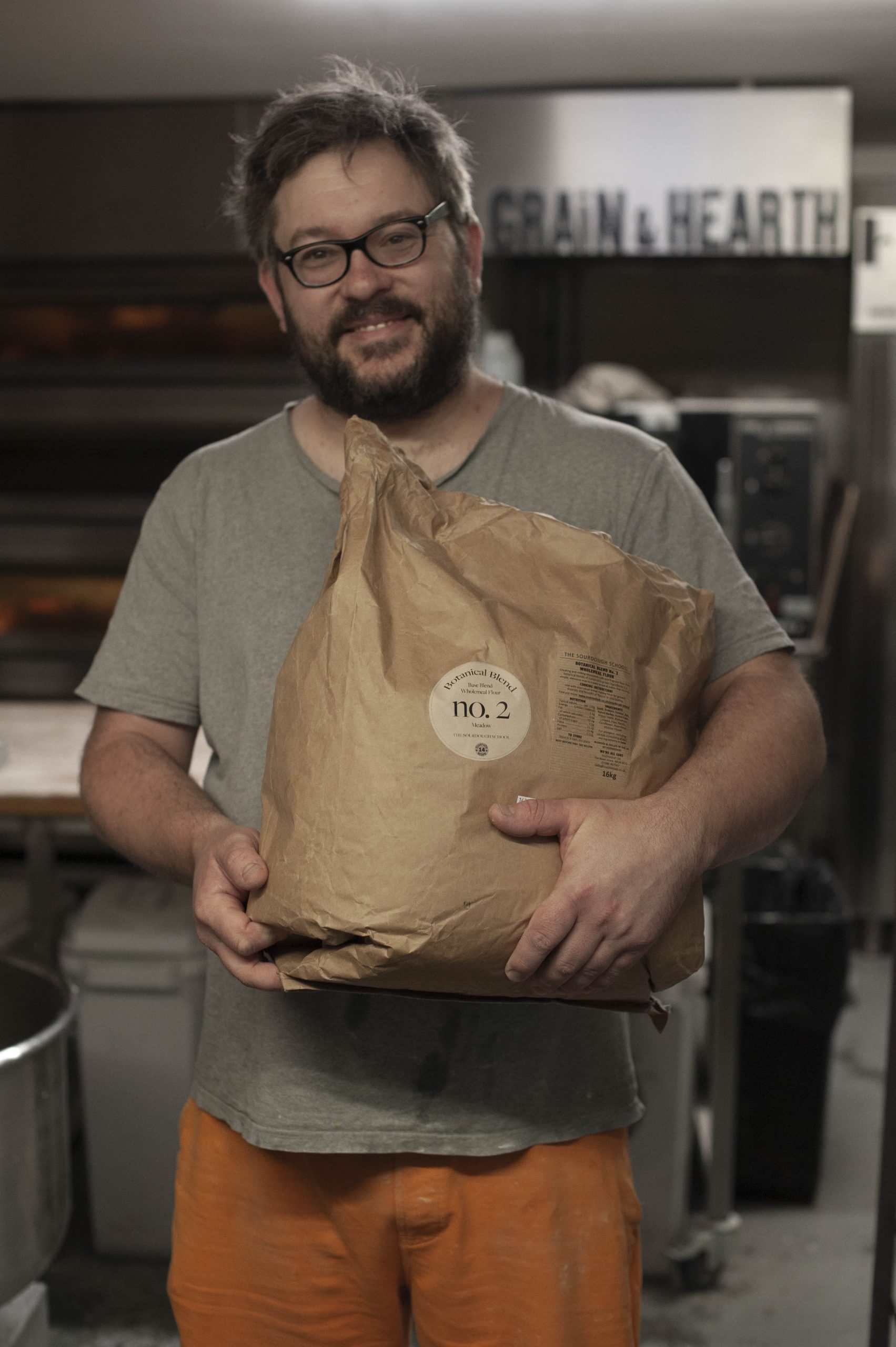
The Annie Elliot Award is a unique initiative made possible through the dedicated support and financial assistance from the sales of our Botanical Blend flour. The use of the Diversity Bread Trademark Licence and the profits means that we can change the whole system. The awards are specifically designed to increase understanding and knowledge in the bread industry and the health industry to raise awareness of how good bread is nourishing and can support both physical and mental health.
Funding Source: Botanical Blend Flour
We are delighted to share that 100% of our profit from the Botanical Blend Flour (supported by the the Diversity Bread consultation fees and Trademark) is what funds the Sourdough School Educational Programme. Milled and distributed through Hodmedods Ltd, the flour supports 4 years of regenerative farming, and supports both physical and mental health through providing fibre and diversity to the gut.
The Sourdough School’s Botanical Blend flour is not only a cornerstone of our Baking as Lifestyle Medicine but also the financial backbone of our awards programme. This blend, curated, milled and distributed by Hodmedod’s, incorporates a variety of botanicals and grains designed to enhance both the flavour and nutritional profile of our bread, and support the farmers and soil health
Hodmedod's Partnership
Hodmedod’s, a company renowned for its commitment to sustainable farming and milling practices, partners with The Sourdough School to mill and distribute this special flour. Their support ensures that our Botanical Blend flour reaches a wide audience, allowing bakers everywhere to benefit from its unique properties.
100% Profits Dedicated to Awards
What sets our programme apart is our commitment to reinvest 100% of the profits from the sales of Botanical Blend flour back into The Sourdough School. Every purchase directly supports the BALM Diploma Awards, ensuring that more healthcare professionals and community bakers can access this transformative education regardless of their financial situation.
Why is Vanessa’s approach to baking unique?
Vanessa understands that fibre, diversity and fermentation are key to healthy bread. She believes in using our senses to bake. She encourages her students to use touch, smell, sight, feel and taste as they bake, and in using a 6th sense: common sense. She also believes that we need to optimise our staple food for social equality.
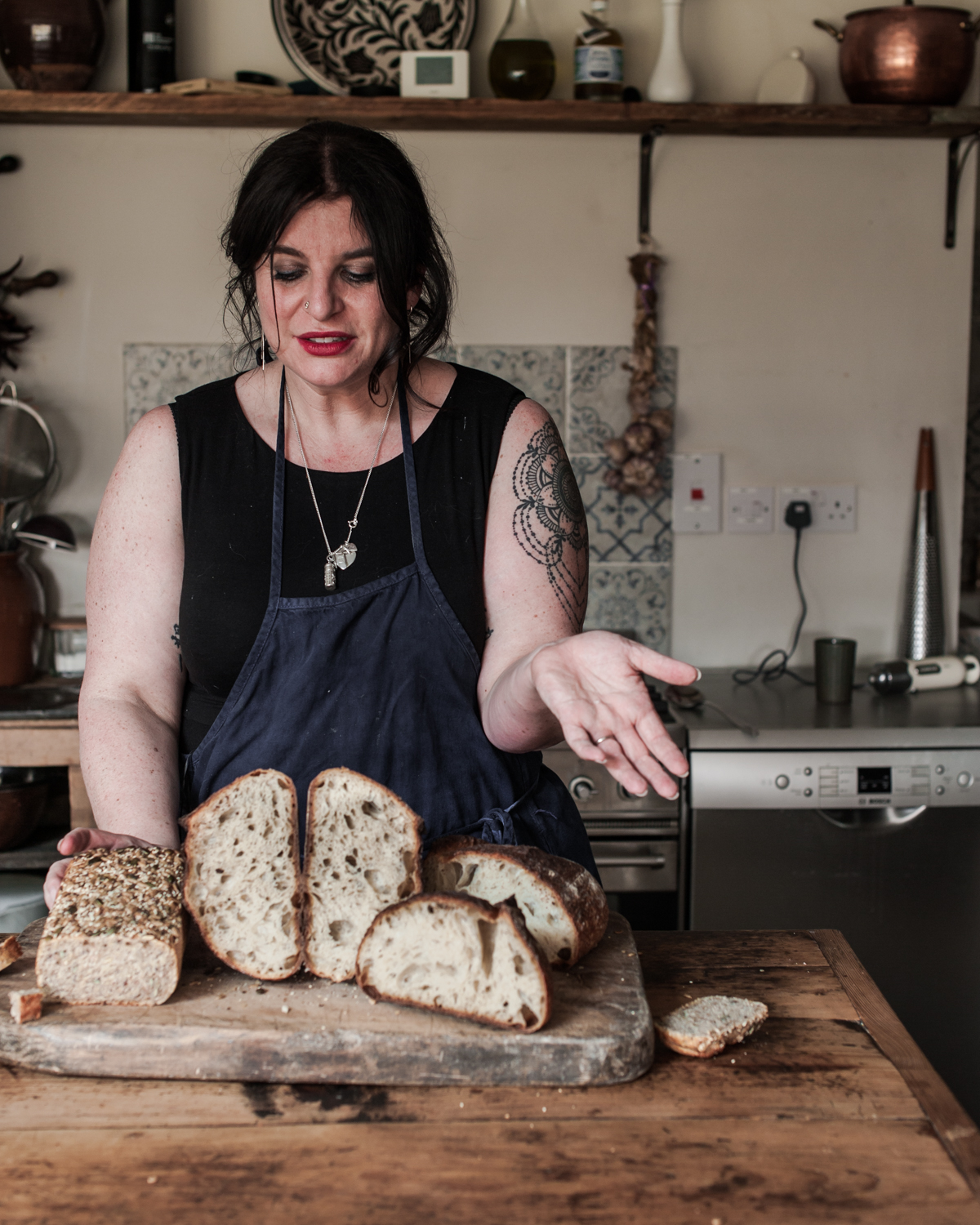
Vanessa Kimbell is renowned for her transformative approach to sourdough baking, which combines nutritional science, personalised nutrition, and a deep understanding of the gut microbiome.
The BALM Protocol
At the heart of her work is the Baking as Lifestyle Medicine (BALM) Protocol. This evidence-based framework redefines bread as a health-promoting staple. By emphasising fibre-rich grains and long, slow fermentation, the BALM Protocol enhances nutrient bioavailability and supports gut health.
Personalised Nutrition
Kimbell integrates personalised nutrition into her practice, offering tailored bread-making workshops. These workshops consider individual genetic profiles, aligning bread recipes with unique health needs to maximise their nutritional benefits.
Holistic Bread Practices
Beyond baking techniques, Kimbell advocates for 'symbiotic eating' and 'sequenced eating' to further support gut health. Her methods empower both healthcare professionals and home bakers to use bread as a tool for lifestyle medicine, fostering systemic change towards healthier food systems.
Social and Environmental Impact
Through The Sourdough School, Kimbell teaches bakers from over 84 countries, promoting sustainable and equitable bread-making practices. Her work operates as a social enterprise, ensuring good bread is accessible to all while supporting social justice and environmental sustainability.
Bake, Eat, Share How Neurodiversity Shapes Vanessa Kimbell’s Holistic Approach to Bread and Well-Being
Vanessa teaches you not just how to make bread, but also how to eat bread. She examines each type of bread in relation to its social, cultural and agro-economical context, considering the traditions that determine how it is eaten. Vanessa is concerned by the loss of knowledge that comes with the increasing homogenisation of bread, warning us against the pitfalls of industrialisation; and even against books such as her own, which risk to standardising breads within the artisan bread community.
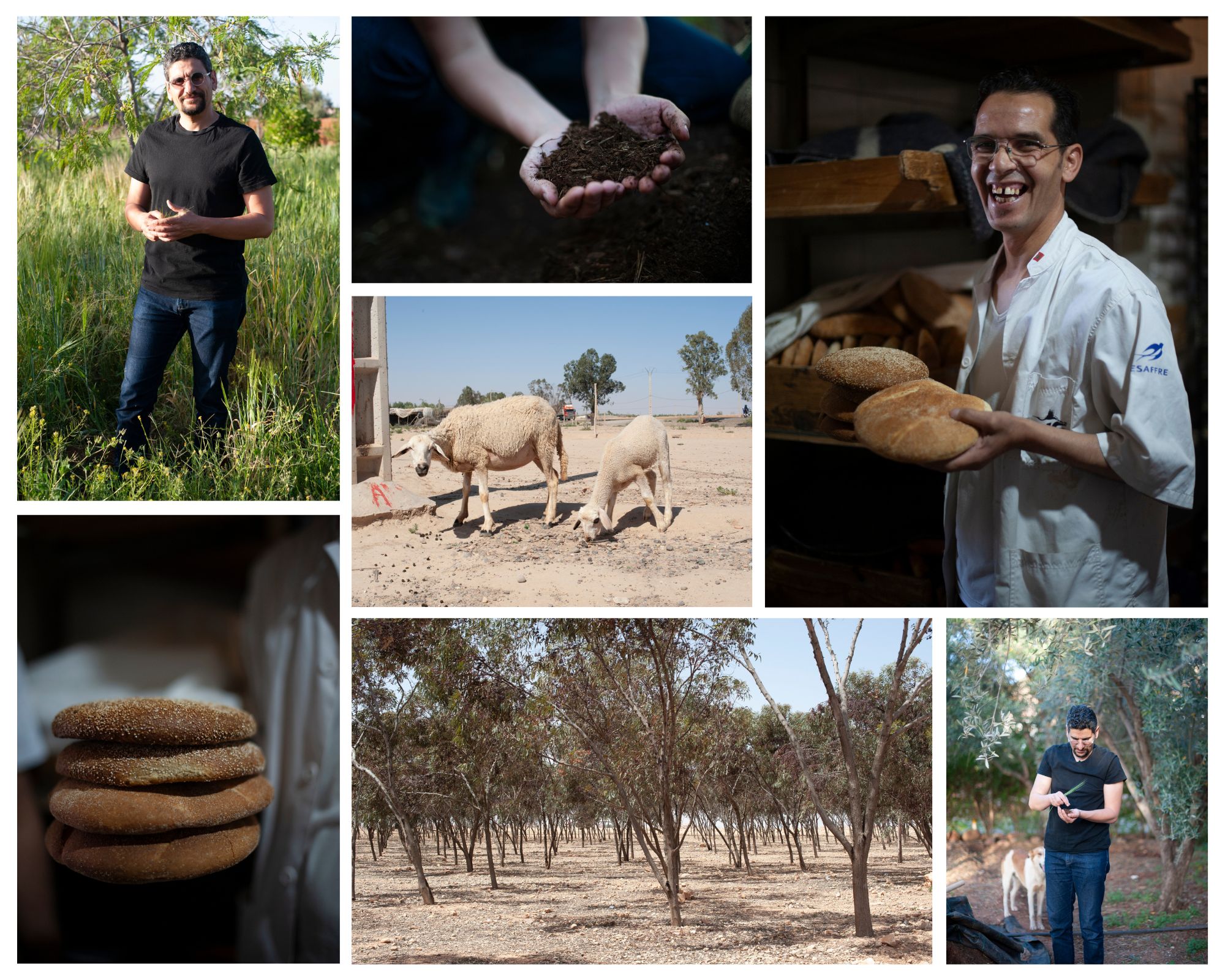
Vanessa uses photography (such as these taken in Morocco) as a means to share her knowledge and to develop a narrative that inspires people to realise the social, economic, and political effect of bread.
Her baking philosophy is focused on empowering people and fostering a sense of community. She believes in the transformative power of fermentation and sees baking nourishing bread as an act of social justice.
Vanessa's neurodivergence has undoubtedly influenced her approach to baking (Vanessa was diagnosed with both ADHD and Asperger's, now commonly referred to as ASD). Aspects of neurodiversity, including monotropism — an intense focus on specific interests — have shaped her perspective and contributed to her distinctive approach to bread.
Vanessa’s apprenticeship and professional training is key to her being a leading figure in bread and health innovation
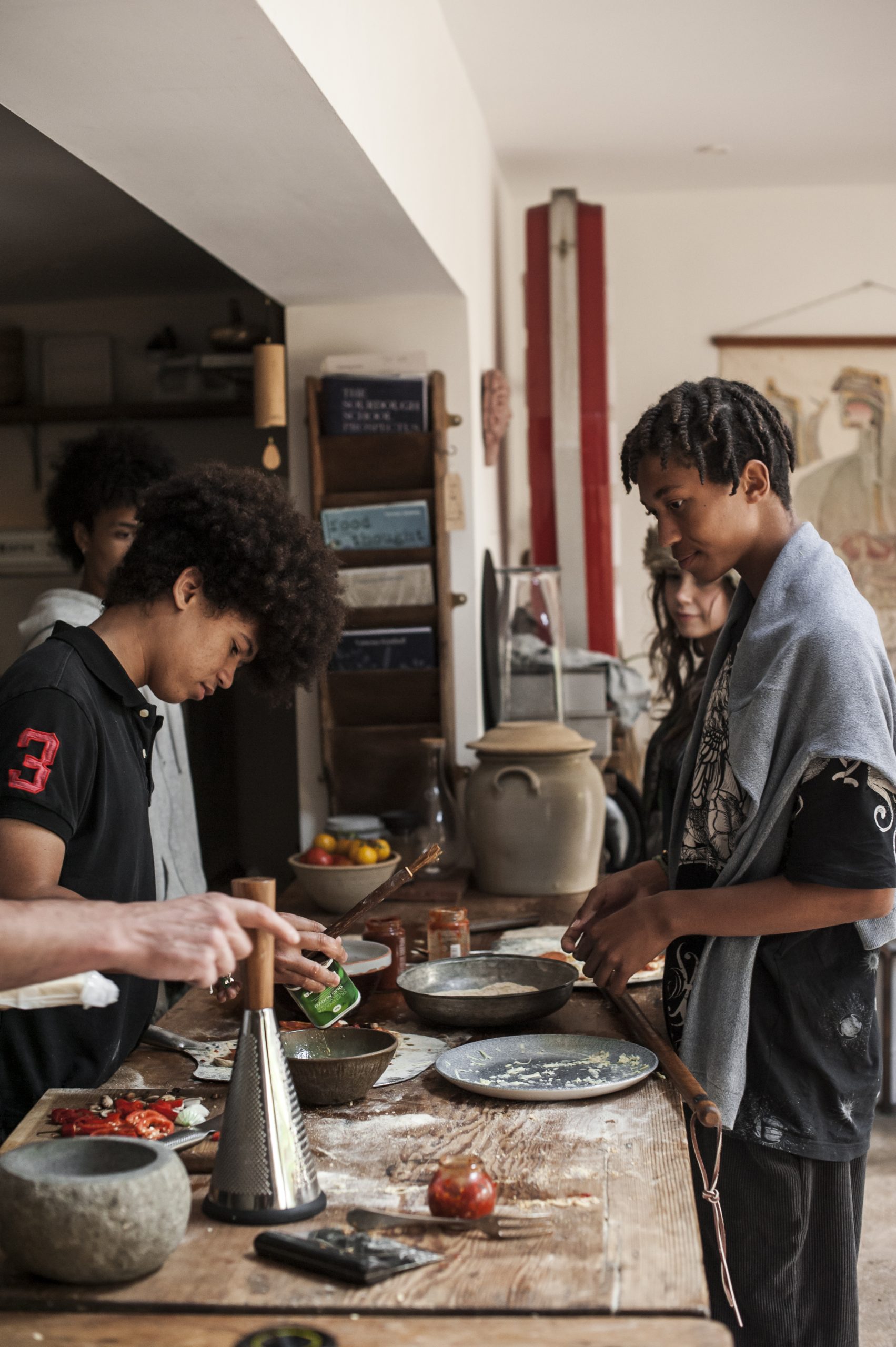
Vanessa's academic work requires a theoretical understanding of bread and research involving deep investigation into nutrition, the gut microbiome and the science of fermentation. This contrasts with hands-on artisan baking, which requires years of practical experience, intuition and craftsmanship.
Vanessa bridges these two worlds, merging rigorous scientific knowledge with the tactile, creative process of baking. This rare combination is what allows her to understand both the biochemical and cultural significance of bread, giving her a distinctive perspective on bread as a whole.
Vanessa spent two years at college in the UK and then a year in Southwest France training as professional sourdough baker, after which she returned to the UK to work as a baker. Over the years she has visited bakeries worldwide, including well known establishments such as Tartine, Bonci's, Della Fattoria and Noma. Working alongside many other bakers and millers ensures Vanessa's technical knowledge and baking abilities are exceptional.
However, it is Vanessa's activism that has garnered a significant following. With an audience of over 500,000 on her social media channels, people respond to her passionate commitment to her cause: bread as a basic human right.
She advocates against the majority of the daily bread consumed by the population, highlighting its detrimental impact on health and the environment.
The BALM protocol was developed with the aim of empowering others to address the disconnect between current bread practices and the findings of available research. Vanessa asserts that the ultra-processed bread commonly purchased by the majority of people is so heavily processed and adulterated that a lifetime of consuming such bread is nearly as damaging as smoking. Her advocacy seeks to raise awareness about the need for change in our approach to bread, arguing for healthier and more sustainable alternatives.
Prescribing Baking, Social Equality and Social Enterprise
Vanessa developed the Baking as Lifestyle Medicine (BALM) Protocol over two decades. It is an evidence-based protocol that lays out the rules governing every level of the bread making process, including baking, eating, and sharing bread and baked goods. It provides a path towards social and political change in the way we approach bread and baked goods, optimising our staple food for social equality. With her extensive understanding of fermentation and the gut microbiome, Vanessa has trailblazed a healthier approach to bread through sourdough culminating in articles on bread, the gut microbiome, and bread and nutrition, along with her books, social media and publicity. She teaches healthcare professionals how to prescribe Baking as Lifestyle Medicine to patients as a social prescriptionalongside her teaching as the course director here at the Sourdough School. In essence, she is an activist whose work to change the way we bake and eat our bread is motivated by the belief that life is precious; our everyday food should not be making us ill, but nourishing us, to live the best life possible.
"You will never ever meet anyone else in the whole world who's more knowledgeable about bread and the gut microbiome, or indeed more passionate about sourdough bread." - Dr. Miguel Mateas
How Vanessa's approach and influence over the years has inspired and supported thousands of bakers
In the video below, Emmanuel Hadjiandreou explains how Vanessa has inspired and supported thousands of bakers through her social enterprise. Friend, master baker, author and renowned teacher, Emmanual gives an overview of Vanessa from a baker's perspective. She has changed the way the world understands bread and made bakers across the world question the status quo.
Vanessa has been baking Sourdough since 1983
It may come as a suprise that Vanessa has been baking with sourdough for over four decades, but she began as a little girl in south west France.

Over forty years ago, a young Vanessa fell head over heels in love with the bread she was served in the local village restaurant in the Dordogne. This simple passion led her to train as a baker; but it was when she stopped being able to digest industrial bread that she embarked on a lifetime of research to discover why, on the other hand, she could digest sourdough. The Sourdough School as we know it today leads the way in the application of the most up to date research to bread making.
When Vanessa was nine, her parents bought a house in rural south-west France. Vanessa's Italian mother loved good food and was a senior chef at Keele University. Both her English grandmother and Italian great-grandmother were bakers, and the house she now lived in was just 60 yards away from the thriving rural French village bakery. The bakery supplied all the bread for miles around and was right the heart of the community. This little girl fell in love with everything French – the wine, the cheese, the fresh fruit and vegetables, the farmers, and the local markets. But most of all she fell in love with the bread. She didn’t even know the word for bread in French, but she fell instantly in love. “I made a connection that will last as long as I breathe.” She bought bread every day and learned a new word each time until she had enough words to ask if she could stay and watch. Every morning at 3 am she would creep down two flights of ancient wooden stairs, climb out of the window and run down the alleyway in the pitch black to the bakery.
Vanessa is an enthusiast, a delighter in life’s most civilised pleasure, and a grown-up who’s retained a child-like wonder at the mysteries of the world.’
–Sheila Dillon BBC Radio 4 Food Programme
She ran as fast as her legs could because only the light of the moon lit the way, but her love of the bakery was stronger than her fear of the dark. As she ran into the square, the bakery oven was lit. The air was cool and filled with the smell of oak burning, and she never slowed down until she was right inside the bakery. The bell on the door would ring furiously as she knew once she was inside the warm brightly lit bakery she was safe. As the years rolled on nothing changed. Every holiday, at every chance, she’d work on the bakery. Sweeping the floors, serving the customers, cleaning and helping to make the bread, she spent every spare moment there. It was in this rural community that she really connected to farmers and the land, and to the relationship between food and family and community that was right at the heart of French living. Aged 18, she qualified as a baker and a chef in the UK, but there were no ‘real’ bakeries.
Apprenticeship in France
In 1992 returning to France, she worked in a restaurant in Paris for a summer and then as an apprentice baker in the Dordogne. Returning to the UK, Vanessa worked as a baker and chef in a hotel in Leicester whilst at university and completed a degree in Psychology of Human Communication. It was whilst finishing her degree in 1995 that she became poorly, and was given a strong dose of antibiotics called Metronidazole. It was one of a long list of antibiotics that destroyed her gut microbiome and, to her utter dismay, she stopped being able to tolerate wheat. It made her ill and she had no option other than to stop being a baker. She gave up the thing she loved most.
She gave up the thing she loved most - bread and baking.
For over 4 years she avoided all wheat until she returned to the bakery and was given some warm bread by her friend. Unable to resist, Vanessa ate the bread and discovered that she could digest sourdough without issues. When she returned home she ate ordinary commercial bread and was poorly again. This was a pivotal moment and she set out to try and understand why. The doctors she spoke to didn't have answers; neither did the nutritionists or bakers. She was told she had a leaky gut and so this set a new path: to understand the role of fermentation and how the long slow fermentation eased the digestion of bread.
The missing piece of the puzzle
In 2016 as part of researching into the microbes in her sourdough starter, she discovered through tests by Tim Spector that she had an extremely low microbial diversity. The results showed a microbiome that was disturbingly unhealthy, with less then 1% diversity, despite Vanessa's diet being diverse and fibre-rich. Vanessa's gut microbial diversity was comparable to, if not worse than those found in autistic children. She was left with 69% Bacteroidetes and 29% Firmicutes, both microbes associated with obesity
Medical records showed Vanessa had been prescribed 57 lots of antibiotics
Getting hold of her medical records, she asked Dr Alison Coleville to list the antibiotics she had taken in her lifetime. As she read the results she burst into tears. Over her lifetime she had been prescribed a total of 57 Antibiotics, her first being administered when she was just 6 months old. Total antibiotic counts:
- Amoxicillin x 27
- Penicillin V x 11
- Erythromycin x 3
- Co-amoxiclav x 2
- Metronidazole x 1
- Cefalexin x 5
- Flucloxicillin x 5
- Doxycycline x 1
- Trimethoprim x 2
The timeline of Vanessa’s reaction to wheat tied in exactly with a strong dose of Metronidazole. This pot of tablets changed everything. Studies have now shown that antibiotic-induced dysbiosis is likely to influence numerous immune and metabolic outcomes through routes that affect the intestinal milieu’s overall inflammatory tone. In this regard, microbiota alterations can result in a decrease of IgA, a non-inflammatory immunoglobulin involved in pathogen and allergen exclusion (Rautava et al., 2004; Penders et al., 2007a; Cerutti and Rescigno, 2008). In addition, metronidazole has been shown to cause a decrease in the expression of Muc2, the major component of the mucin layer (Wlodarska et al., 2011); thinning of this layer would result in a more direct contact between gut microbiota and epithelium, with likely increases in innate immune stimulation and inflammation In Vanessa’s case it was likely the cause of her reaction to wheat and many other foods that were to follow. To make matters worse a nutritional therapist put her on a restriction diet to try and identify the offending foods. We now know that diversity of food is the key to nurturing microbes but for over a year, Vanessa was restricted to just a handful of ingredients, which contributed to the extinction of her microbes. The restriction continued for almost 5 years with multiple food allergies and intolerances.
Teaching The Doctors Baking as Lifestyle Medicine
Over twenty years on, Vanessa is internationally renowned for her passion and unique understanding of long slow fermentation. In many ways she came full circle, teaching the nutrition and digestibility of bread course to doctors and health care practitioners, accredited by the Royal College of General Practitioners. In 2009 she wrote her first book Prepped, and her next book Food for Thought won the World Book Awards for Most Ethical and Sustainable Book. It was also The Telegraph Book of the month. Her 3rd book, The Sourdough School, is a best seller on the subject of how to make nutritious and delicious sourdough. It was hailed as "the most important book of the year," in 2019 by Waitrose Magazine. Next came Sweet Sourdough in 2020, and The 10 MInute Loaf in 2022 completed The Sourdough School trilogy. Vanessa is currently writing her 6th book which will be published in 2025.
Optimising our staple food for social equality
Once Vanessa realised that fermenting flour and water transformed it into bread that was not just delicious but digestible, she found herself on a mission to understand how and why sourdough is easily tolerated by people with digestive issues and why is it so important to eat bread that is nutritious. "Feeling poorly changes everything. It changes the way you feel. I realised that when I ate long slow fermented bread created from the flour blends that I mill, along with other fermented wholefoods, I felt better. Not just physically but mentally. As I began to teach, it became obvious that the kind of bread people eat every day was integral to health and my focus stopped being about me. I do not think you can underestimate the importance of the way we approach bread, and the impact on health, given that wheat makes up between 20-30 (depending on socio-economics) of calories consumed by humans. My life’s work is about understanding and sharing knowledge of how to make bread that nourishes. It has meant redefining our approach to flour and combining this with fermentation. Fermentation alone is not enough to change the paradigm of bread. It is a combination of the way we grow our grain, the diversity of the ingredients we use to mill our flour, the way we ferment our bread and the way we eat our bread that supports our health and our immune system. At the heart of my work is the belief that the transformation of flour and water into food that nourishes us impacts both our gut microbiome and our mental health. This is bread that nourishes and from this base we can bake, eat and share bread as lifestyle medicine."
Is Baker Richard Hart The Best Sourdough Baker in the World?
Richard Hart: Redefining Sourdough Baking
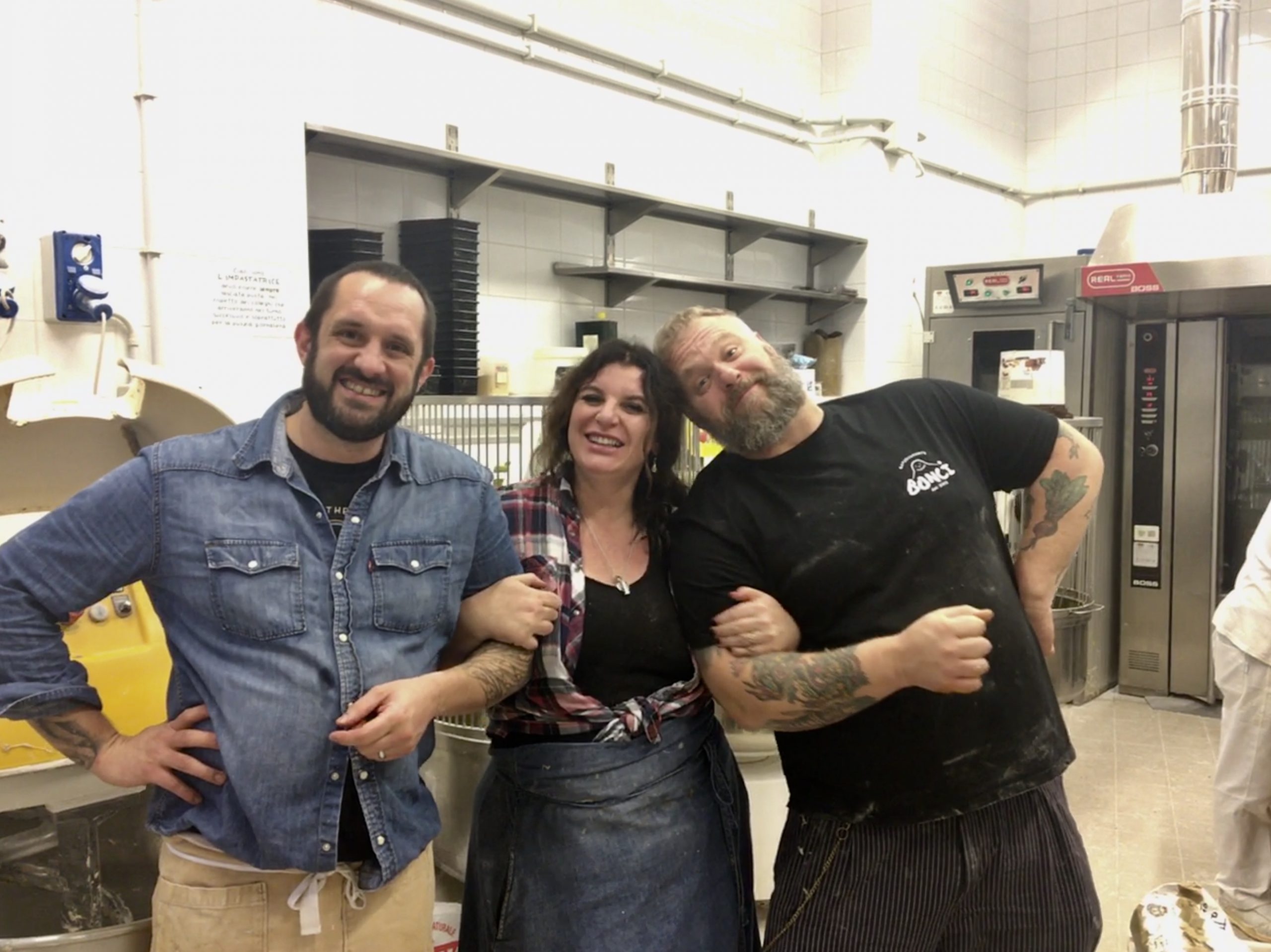
From Chef to Master Baker
Richard Hart’s journey began in the world of fine dining, where his understanding of flavour was sharpened in kitchens across London and California. But it was in San Francisco, at the iconic Tartine Bakery, that he truly found his calling. As head baker, Richard spent 7 years refining the art of sourdough, baking under Chad Robertson, and baked the bread that has inspired bakers worldwide. His work at Tartine helped to elevate the simple act of baking into an art form, earning him a reputation for excellence.
Hart Bageri: A Revolution in Copenhagen
In 2018, Richard brought his expertise to Copenhagen, partnering with René Redzepi of Noma to launch Hart Bageri. The bakery quickly became part of the already established Copenhagen’s food scene, but his work certainly elevated bread in Denmark, challenging tradition with innovation. Every loaf reflects Richard’s instinct, from the quality of the grains to the long, slow fermentation that defines his baking philosophy.
Philosophy: Intuitive Baking
What sets Richard apart is his ability to connect with the dough. His approach is not rigid or formulaic; it’s intuitive. Like a musician interpreting a piece of music, Richard works with the ingredients, the environment, and the natural processes of fermentation to create loaves that are unique, nourishing, and alive.
His book, Richard Hart Bread: Intuitive Sourdough Baking, encapsulates this philosophy, offering bakers a deeper understanding of the craft. It’s a guide not just to baking, but to a way of thinking about bread that is profoundly respectful of the process.
A Global Legacy
Richard Hart’s influence extends far beyond the walls of his bakeries. His techniques, philosophy, and commitment to quality have shaped modern sourdough baking. Bakers around the world look to his work for inspiration, and his bread has become a benchmark for excellence.
Through his work, Richard has redefined what it means to bake sourdough. It’s not just about flavour or texture; it’s about creating something meaningful, something that connects us to tradition while pushing the boundaries of what bread can be.
Why Richard Hart is the Best
Richard Hart’s legacy is undeniable. Many have commented on the overbearing spousal PR campaign and the relentless promotion of Richards baking ability detracting from the bread.
Part of the magic of what makes Richard compelling is actually in his restraint and his unwillingness to shout about his own skills. Over promotion feels incongruent, and forced. We've left charming on social media and and it has reached into toe-curling territory, and even in Richards new book, the bread appears to have made fewer public appearances than the lady promoting it.
So back to the question, is Richards bread really all that amazing, was his groundbreaking work at Tartine really exceptional and was the creation of Hart Bageri his work?
Vanessa spent many hours side by side with Richard Hart in the bakery, says this: "there is a kind of brilliance to his bread that doesn’t need a spotlight. It is some of the best bread I have ever eaten. His skill is phenomenal it is there in the way he handles the dough, in the restraint and intuitive understanding of his fermentation, and in his refusal to cut corners is key. He is an obessive, like me, and his bread speaks for itself—quietly, assuredly, and with remarkable depth. Richard doesn't need to declare himself the best—and nor does anyone for that matter. But I will say this: in a world awash with overstatement, his loaves are a rare example of substance over style. For those of us who understand fermentation not just as a process but as a philosophy, his work is remarkable. He inspires and I include myself as someone who has been supported and inspired over many years. However, personally I'd prefer if just people say that someones bread is some of the best in the world. Somehow touting "best baker," feels vulgar and this kind of approach is against everything that bread stands for. Bread is humble and about skill, connection, community, sharing, and being faithful to the art of baking. I have only ever seen Richard approach his bread with deep integrity and real skill developed from years of excellence, but when it comes to love you know what they say - opposites attract."
To learn more about Richard’s work, visit Hart Bageri or explore his book for a deeper dive into his philosophy.
way
What is Nutrigenomics
Nutrigenetics is the study of how an individual’s genetic makeup affects their response to specific nutrients, foods, or dietary patterns. It helps us understand why one person may thrive on wholegrains, while another may experience bloating or inflammation from the same bread. By exploring genetic variants—particularly single nucleotide polymorphisms (SNPs)—we can tailor dietary interventions in a way that is both preventative and therapeutic. We use Nutrigenetics to the study of how an individual’s genetic makeup affects their response to bread specific nutrients, foods, or dietary patterns. It helps us understand why one person may thrive on wholegrains, while another may experience bloating or inflammation from the same bread and tailor bread to suit the individual
